
Freemasonry Today




Freemasonry Today


The Universities Scheme Conference fosters student engagement in Freemasonry
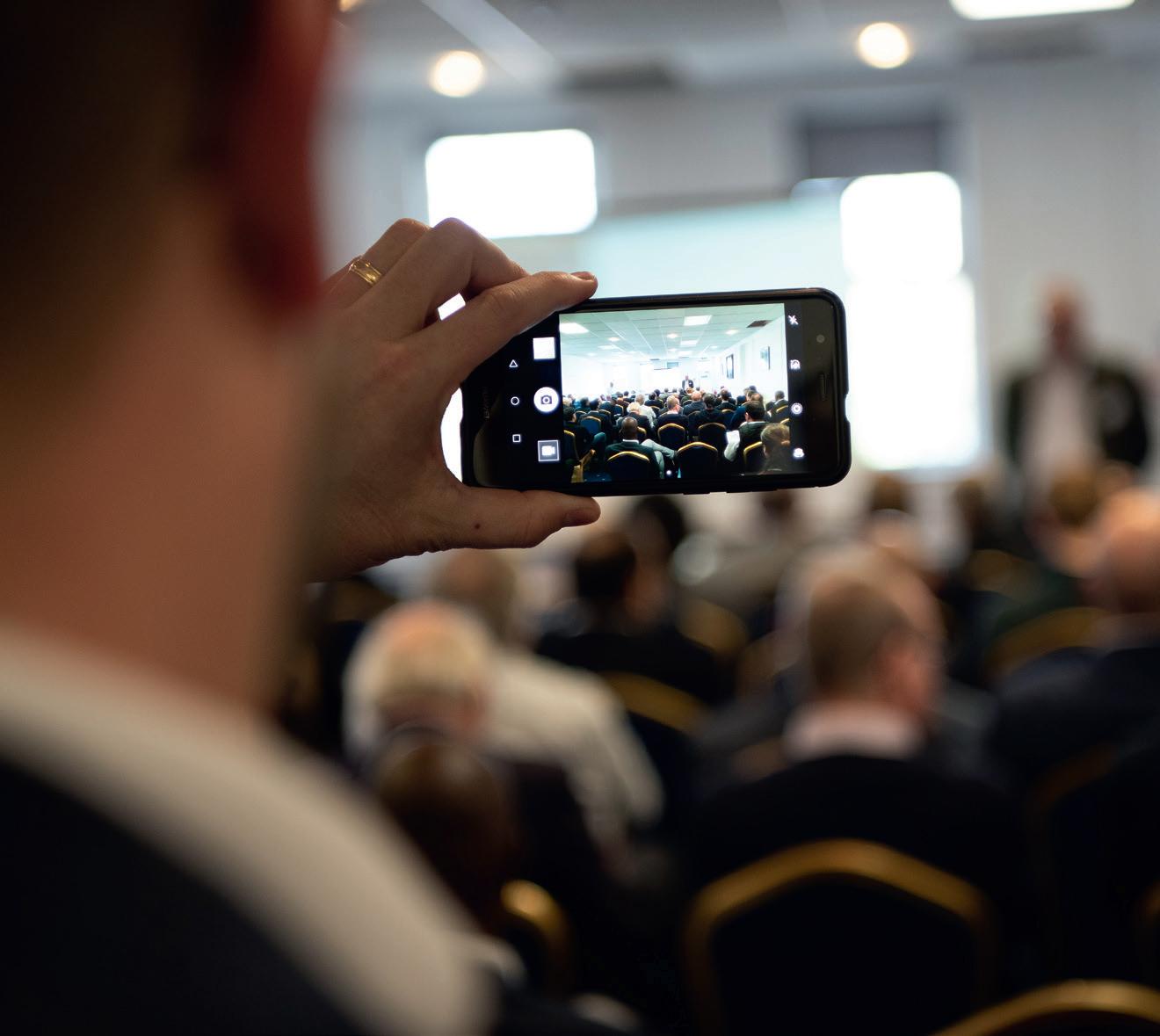
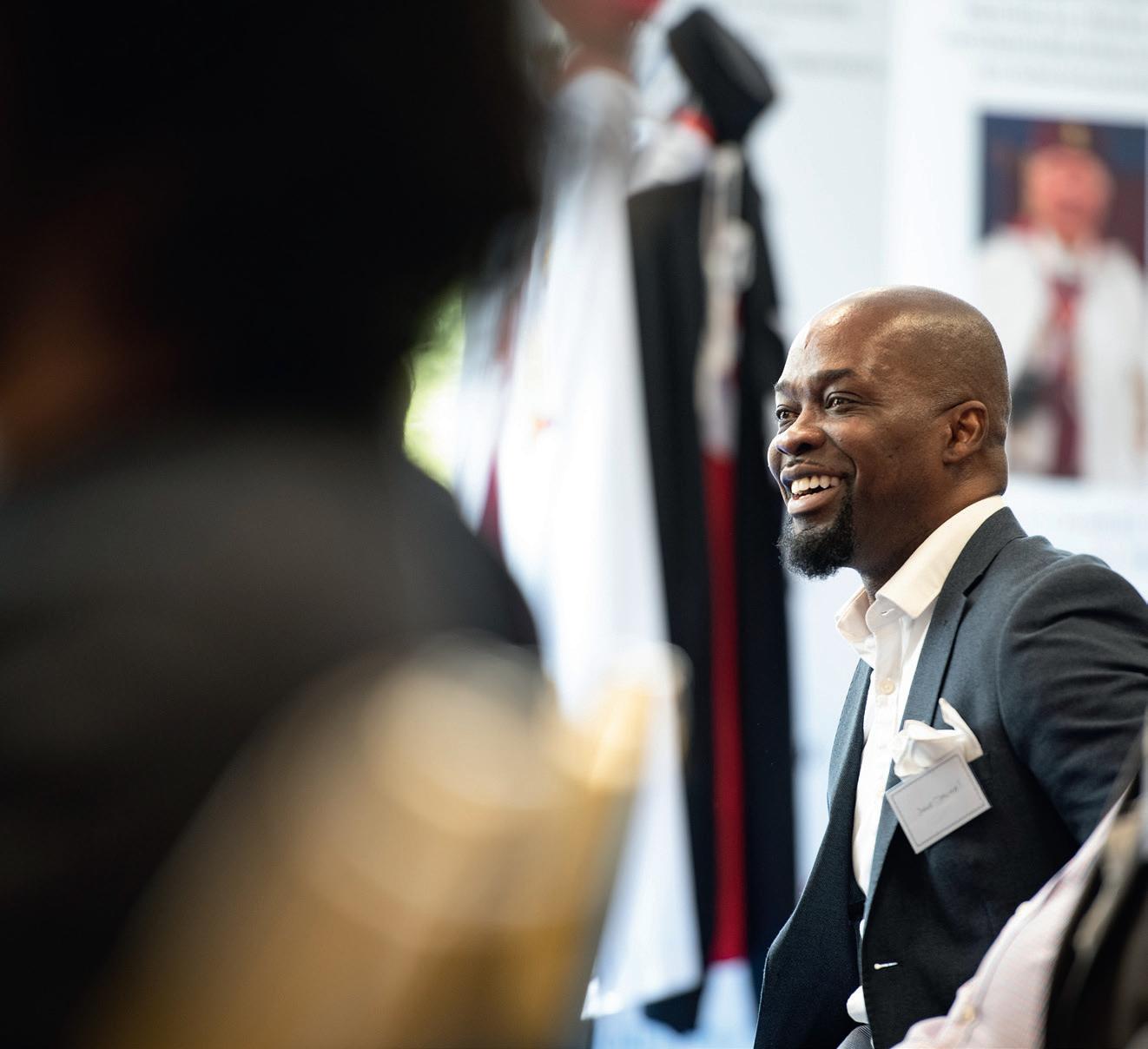


The official journal of the United Grand Lodge of England Issue 66 – Summer 2024
Editor Donna Hardie
Editorial Panel Adrian Marsh, Shaun Butler, Marta Zandri, Robert Frankl, Paul Grier, Elliott Chevin, Roger Maber, Richard Barnett, Martin Cherry, Guy Roberts
Published by Sunday, 207 Union Street, London SE1 0LN, www.wearesunday.com for the United Grand Lodge of England, Freemasons’ Hall, Great Queen Street, London WC2B 5AZ
Editorial Manager Marta Zandri editor@freemasonrytoday.com Freemasonry Today, Freemasons’ Hall, Great Queen Street, London WC2B 5AZ
Advertising contact Ethan Hall
ethan@square7media.co.uk
020 3832 2879 Square7 Media Ltd, 3 More London Riverside, London SE1 2RE
Circulation editor@freemasonrytoday.com 020 7395 9392
Masonic enquiries editor@freemasonrytoday.com 020 7831 9811
www.ugle.org.uk
Printed by Acorn Web Offset Ltd
© United Grand Lodge of England 2024. The opinions herein are those of the authors or persons interviewed only and do not reflect the views of the United Grand Lodge of England or Sunday.
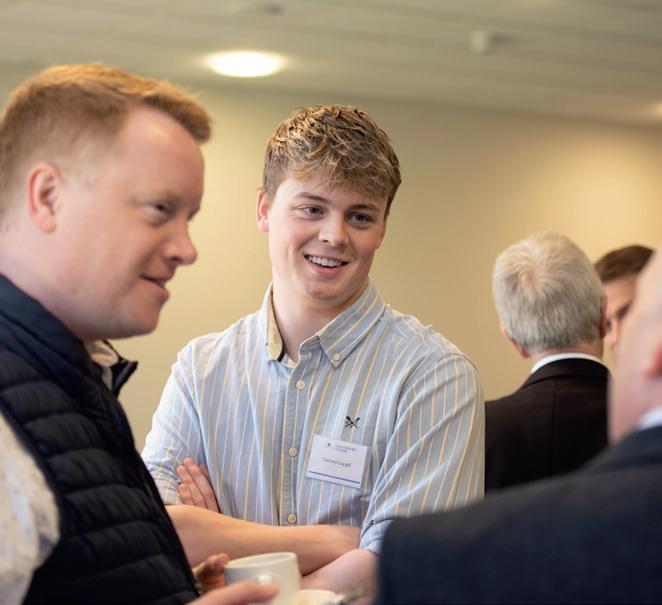
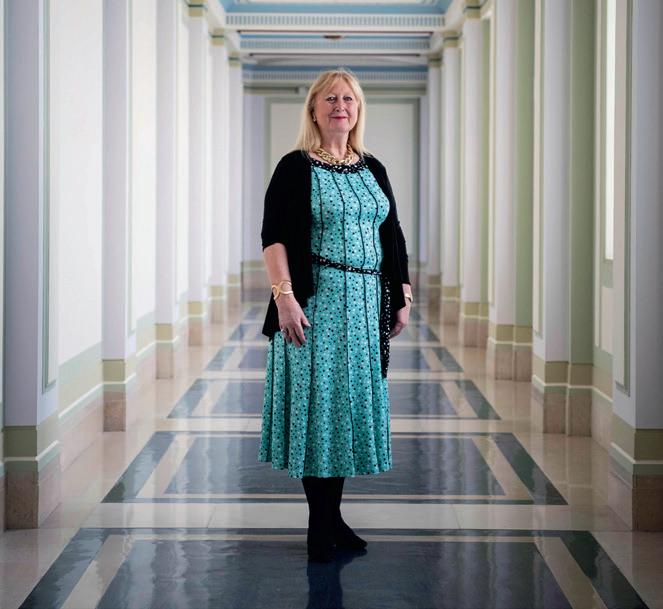

54 Baildon’s historic Masonic Hall Yorkshire’s Grade II-Listed Hoyle Court
editor@freemasonrytoday.com

@freemasonry2day @ugle_grandlodge
FreemasonryToday UnitedGrandLodgeofEngland
@unitedgrandlodgeofengland @freemasonrytoday @freemasonshall
From Grand Secretary and Grand Scribe E Adrian Marsh Welcome to the summer issue
Universities Scheme Conference Archway, migration, implementing the Strategy, multiple candidate Initiations, news from UGLE’s Provinces and Districts
The interview
HFAF’s new Grand Master Carol Cole
50 Museum of Freemasonry
56 East meets west English Freemasonry in Thailand
60 Quarterly Communication
The Pro Grand Master’s address
62 The Order of Service to Masonry Keith Gilbert discusses his OSM
66 Solomon
Introducing the SolomonGPT Project
68 Members’ Pathway Growing the membership
71 MCF and Freemasons Supporting members and their families
Fraternal world
77 Home and abroad
UGLE Lodges around the world
81 Your social media posts
82 Thēsauros

From the Grand Secretary and Grand Scribe E
A year on from the Quarterly Communication in South Wales, Adrian Marsh reflects on UGLE’s Strategy and Annual Investiture
Dear Brethren and Companions. It feels strange to be writing the last editorial of the Masonic season after what seems such a short time since we kicked the new season off so splendidly last year at the out-of-London Quarterly Communication in South Wales in September. It is, no doubt, a reflection of our Strategy starting to show early signs of progress that I am not alone in feeling that we have collectively achieved a great deal this year.
The highlight of the year at Freemasons’ Hall was the Annual Investiture in April. It is one of the great pleasures of my role as Grand Secretary and Grand Scribe E to see the excitement and pride of all those being appointed a Grand Officer for the first time or promoted to a higher rank. Many of us have had the pleasure to Initiate, Pass or Raise a family member or friend, and can remember the great feeling that comes with it. It is, perhaps, just possible for us to have some notion of how proud the Grand Master must have been to invest his son, the Earl of St Andrews, as Senior Grand Warden in front of 1,600 members of Grand Lodge at that Annual Investiture. It was impossible not to be affected by the obvious pleasure and pride of father and son respectively, and those of us fortunate enough to be present will live with that memory for ever.
In his address, the Grand Master reminded those present that being a Grand Officer was not intended just as recognition of past service, but rather as an expectation of future service. It is with this in mind that it falls on all of us who are Grand Officers, whether newly minted or long in the tooth, to think very carefully about how we can contribute to the good of Freemasonry in general and our own Lodges in particular. This can be as simple as ensuring we attend regularly, supporting new and young Freemasons, or a willingness to help out ceremonially at short notice.
Supporting new and young Freemasons is particularly important and is not restricted to avoiding pointing out errors or mistakes, but rather more to how we can encourage these men to get the best from their membership. A thriving Lodge may have limited short-term progression for newer members, so what can we do to better involve them? It is not uncommon to see a Grand Officer deliver a particular piece of ritual at every meeting – what is less common is to see that piece of ritual shared among a number of newer Freemasons instead.
I was particularly taken recently when I saw a Grand Officer commence the Charge to the Initiate,
‘If every Lodge has just one more member at the end of the year than it had at the start, then achieving our Strategy will be simple!’
only for it to then be carried on in turn, in exemplary fashion, by four recently raised Master Masons. This team of five, led by the Grand Officer, made an extremely meaningful impact on the Candidate and their success was duly celebrated at dinner. What was more, the Grand Officer in question had organised a series of short Zoom meetings with his team to practise the ritual and work as a team – very much feeling part of the Lodge. While this is a relatively trivial example, it does, I hope, highlight how our Grand Officers can play a very important role in the successful growth of a Lodge and the engagement of new members. I also particularly enjoy it when I dine at Lodges that have dispensed with top tables and, as a Grand Officer, I can sit with the membership as a whole and get myself properly involved in the banter.
As we come to the end of this Masonic season, it is also worth reflecting on the words of the Pro Grand Master at the start of the year. If every Lodge has just one more member at the end of the year than it had at the start, then achieving our Strategy will be simple! I have been extraordinarily excited by some extremely good examples of this in the past 12 months. If we keep the momentum going and utilise the great tools we have available, such as the Members’ Pathway and Archway, then I am confident we will be successful.
I have also noticed that there does seem to be a difference where the Secretary of a Lodge distils either the Quarterly Communication of Grand Lodge or the notices from Provincial Grand Lodge into a few core messages, rather than simply circulating the whole text and relying on members to read it. The Lodge seems so much better informed and engaged. I would, therefore, encourage all Lodge Secretaries and Chapter Scribes E to pick out the key messages and ensure they are succinctly communicated on the First and Second Risings so that those present have heard them.
As the summer break approaches, it is also a good time, especially for me, to acknowledge the patience and understanding of my wife and family who have become accustomed to that great Masonic refrain, ‘I am sure I won’t be as busy next year’. As I noted earlier, this year has flashed by. I have enjoyed every moment of it and look forward to September and it all starting again. I have been very fortunate to have a great team supporting me at UGLE and, on their behalf, we wish you a relaxing summer and look forward to meeting as many of you as possible after the break.

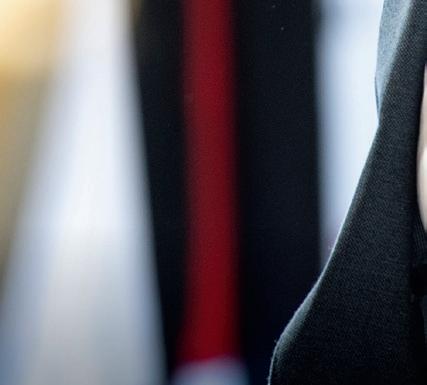
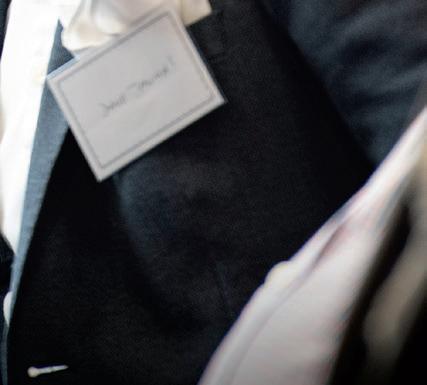
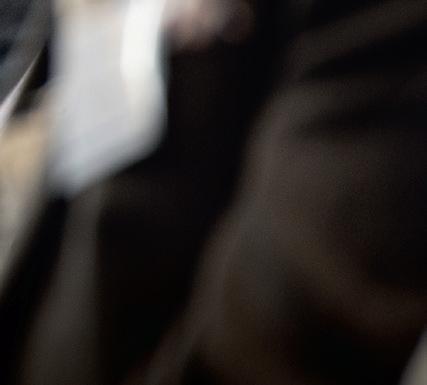

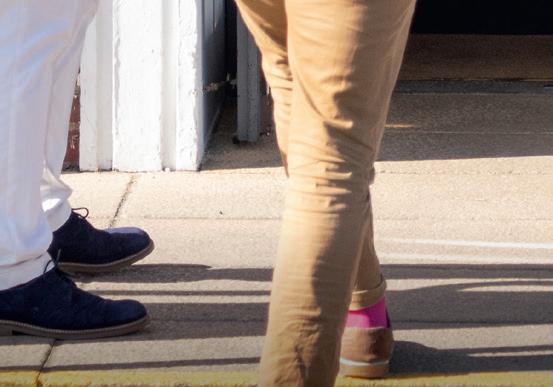


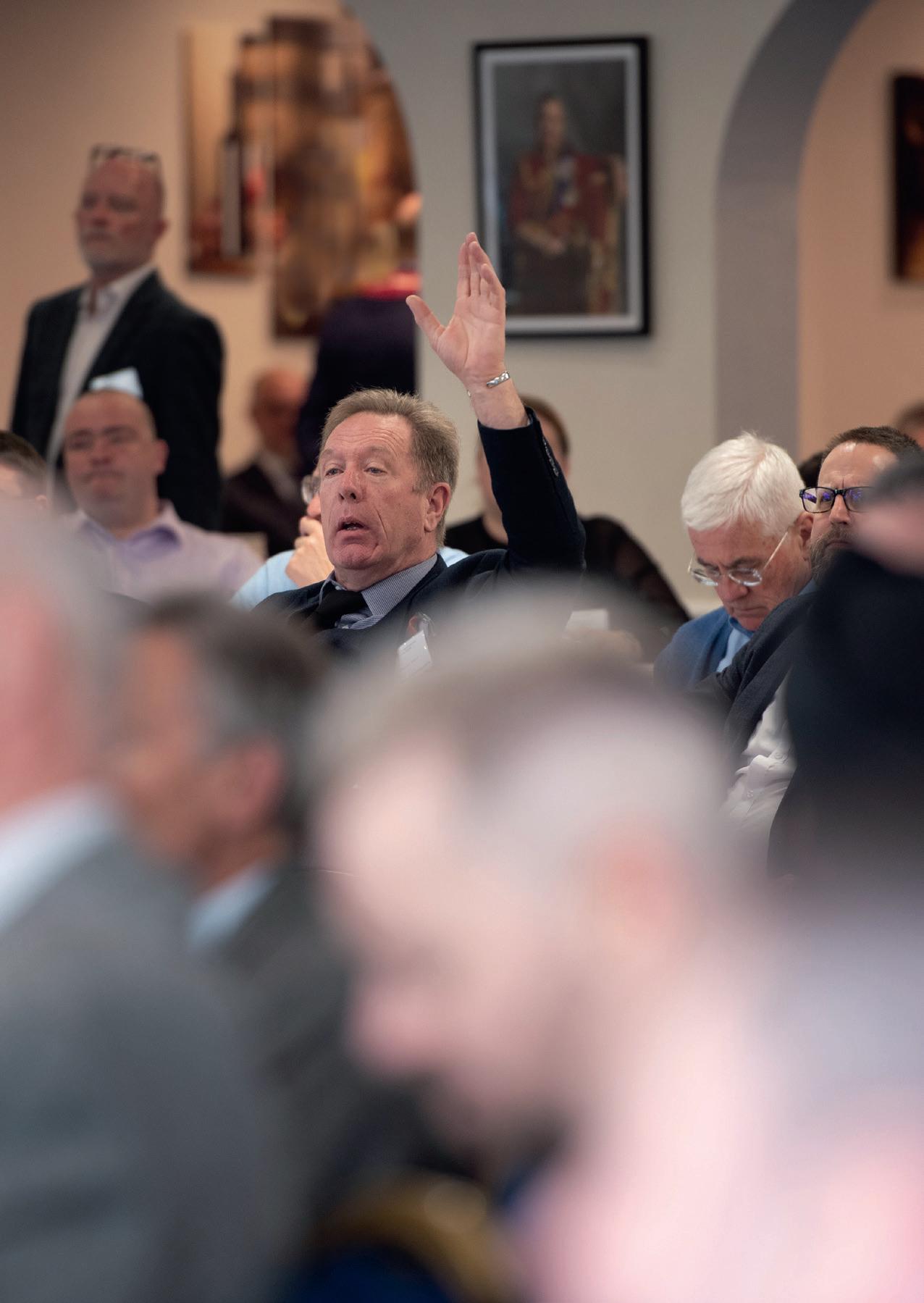

Members from across the UK gathered at the Universities Scheme Conference to share best practice and success stories about driving engagement in student Freemasonry


More than two centuries ago, in 1818, the formation of the Apollo University Lodge at Oxford marked a pioneering moment, laying the groundwork for what would eventually become the Universities Scheme. This is a cornerstone initiative of the United Grand Lodge of England to propagate Freemasonry’s core principles to a new generation.
Formally instituted in 2005, the Universities Scheme has blossomed into a nationwide network, encompassing 87 Lodges and seven Chapters in university towns and cities throughout England and Wales. These Lodges enthusiastically welcome aspirants from diverse academic and professional realms – undergraduates, postgraduates, esteemed university faculty and alumni – as well as students aged 18 and above from further education institutions.
Fostering student engagement is the beating heart of the Universities Scheme. It offers members an invaluable platform to forge long-lasting friendships, cultivate self-confidence and life skills, and enhance their social connections.
As an integral part of their efforts, members actively participate in Freshers’ Fairs at universities nationwide, collaborating closely with student unions and university governing bodies. Furthermore, the United Grand Lodge of England has halved membership fees for those under 25 years of age, ensuring that Freemasonry remains within reach for the widest possible audience.
A biennial Universities Scheme Conference is held to enable scheme members from around the world to share best practices and contribute to the ongoing development of the scheme. The latest edition of the conference, hosted on 20 April at Sindlesham, the Berkshire Masonic Centre, drew more than 100 members from across the country and beyond.
Opened by conference organiser Mark Boullé, Scheme Chairman James Hilditch and Deputy Provincial Grand Master of Berkshire Mark Heppelthwaite, the conference had running themes aligned with the new UGLE Strategy, including Thriving Membership, Coherent Organisation and Community Engagement.
The day featured a variety of programmes, ranging from an enriching session on the Members’ Pathway presented by Shaun Butler, Ian Copestake and Chris Hirst, to engaging membership using Solomon by Ken Wootton. These

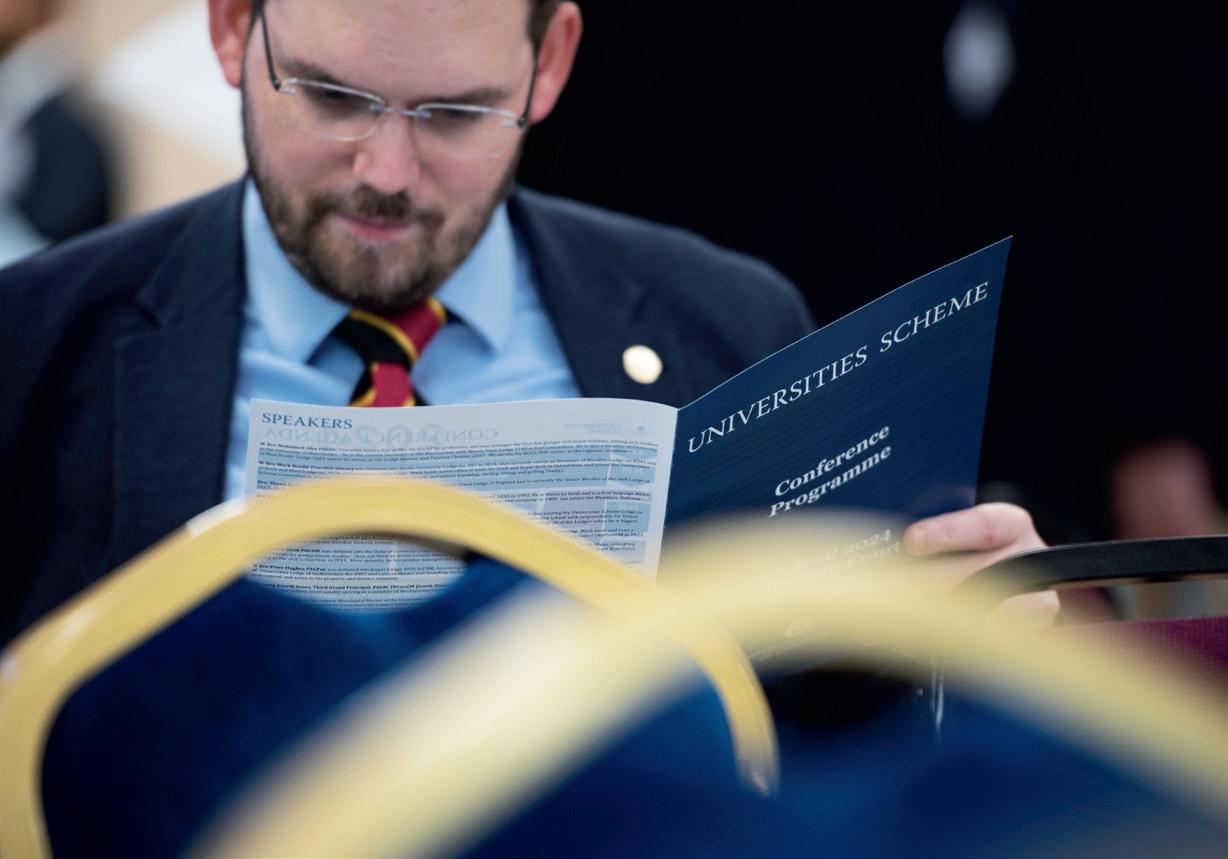
sessions gave members insight on how to best utilise existing resources to better interact with members, helping retain membership and also attracting new members into the organisation.
One of the pivotal discussions during the conference centred around the issue of migration and the implementation of the Migration Policy. Presented by former Scheme Chairman Julian Soper, Mo Afsa, Peter Hughes and Chris Hirst, the group introduced a migration web form that will soon be available on the UGLE website.
The web form, slated for launch in September to coincide with the start of the next academic year, was developed to address the complexities surrounding migration and the challenges faced by former or current members of a University Lodge. The form aims to alleviate the difficulties these members encounter in transitioning to a new Lodge or Chapter near to their current residences.
Shaun Butler, Director of Membership and Communications at UGLE, commented on the success of the conference, ‘I’m really happy with how the conference has gone so far. There have been some great discussions about the Members’ Pathway and migration.’
He highlighted the importance of facilitating
The Universities Scheme covers a network of 87 Lodges and seven Chapters in university cities and towns in England and Wales


networking, which he deemed the conference’s crowning jewel. ‘I think the most important aspect of today is the networking element,’ he said.
‘We have brought together members from all across UGLE into one room, where they can meet and talk with one another and share best practices, which they can then take back and implement in their own Lodges and areas.’
After lunch, delegates divided between two sessions, with half the audience opting to listen to the Third Grand Principal, Gareth Jones, as he spoke about the integrated approach to Royal Arch Freemasonry and the ways it can be integrated into the Universities Scheme.
Meanwhile, Sharon Whatley from Freemasonry for Women, Andy Mapperson and Stephen Whatley presented a vibrant session about Freshers’ Fairs.
The conference marked a significant milestone with the unveiling of the University Society Support Network, a pioneering initiative under the UGLE Universities Scheme aimed at empowering student Freemasons and driving engagement in student Freemasonry. This initiative provides a central resource hub to assist University Lodges in recruiting new members and facilitating robust participation in Freshers’ Fairs nationwide.
Stephen Whatley, who led the initiative, was elated at the positive response garnered by its launch. ‘The initiative was developed to support attraction and engagement in student Freemasonry,’ said Stephen. ‘We’ve got University Lodges across the country wanting to help their students and not knowing how to. Providing a comprehensive, centralised resource to support students through their Lodges and empower student Freemasonry was the driving force behind this new initiative.’
Dr Dave Thomas, Worshipful Master of the Pentangle Lodge, was delighted to encounter numerous good practices and ideas shared by various members and presenters. ‘We meet every two years as representatives and share ideas and opinions,’ he said.
‘Today, I’ve learned that there are many good practices happening across Provinces, and some of these have been shared here. I’m looking forward to taking these back to my Lodge and attempting to revise and review our processes, making them more user-friendly and better supporting the sustainability of the fraternity as a whole.’
The day was completed with a demonstration of multiple candidate ceremonies in the Berkshire Lodge Room. Using some very distinguished stand-in candidates, Tom Golds, the Universities Scheme Representative for RCG7, led his demonstration team, illustrating how small changes to ceremonies can help create seamless navigation around the Lodge Room.
The day was neatly rounded off by James Hilditch as he closed the conference. In doing so, he stepped down from his role after four years of steering the Universities Scheme, handing over to Stephen Wyer, the Provincial Grand Master Designate for the Province of Worcestershire.
James concluded, ‘I was really impressed with the engagement that I saw today. The interactions, the questions and the challenges that were put to our speakers was encouraging and inspiring. The Universities Scheme is in good hands, and I look forward to seeing it go from strength to strength in meeting those aspirations and challenges in the future.’
As the curtains closed on another Universities Scheme Conference, the energy in the room was palpable. Attendees buzzed excitedly, exchanging contact information and making plans to implement the ideas and best practices shared throughout the day.
The conference’s resounding success heralded a new dawn for the Universities Scheme, where Freemasonry’s cherished principles and values would continue to resonate across academic realms and beyond.
Thanks to Howard Griffin for his valuable input.








After the rollout of Archway, we hear from five UGLE Chapters about how they are successfully implementing the initiative
Archway, developed over the past two years, was officially launched at the Supreme Grand Chapter in November 2023. Provinces have enthusiastically embraced this initiative, viewing Archway not merely as a separate project, but as a pivotal component of the Membership Challenge and the ‘One Journey, One Organisation’ approach.
Each Province has designated a Single Point of Contact (SPoC) for Archway. Although still in its early stages, we’re excited to share the diverse strategies that various Provinces are employing to implement Archway.
Key highlights from Provinces:
• Provincial Executives from both the Craft and Royal Arch collaborate on Archway.
• Dedicated teams at both Provincial and Chapter levels are driving Archway implementation.
• A Province-wide communication plan, tailored for Archway, is in place.
• Archway QR codes now feature on Summons and other Provincial materials.
• Visiting officers are briefed to promote Archway actively.
• Robust connections with the Royal Arch Representative role are established.
• A mix of roadshows, face-to-face meetings, and online sessions are utilised to communicate Archway’s benefits.
• Metrics to gauge success are being formulated.
Our goal is to establish a network of SPoCs across England and Wales. This network will serve as a valuable resource for assistance, support and sharing good practices.
Durham 151 Lodges 54 Chapters
As the launch of Archway at Supreme Grand Chapter approached last November, the Province of Durham decided that, as part of our ongoing activities to raise the profi le of the Royal Arch, and at the same time raise awareness of the benefits of Archway, we would focus on a month of Royal Arch events. We called it our ‘Royal Arch Festival Month’ and it ran from mid-March to mid-April 2024.
Our month kicked off with a demonstration of the Ceremony of the Veils, involving a Provincial team and the host Chapter members. This was publicised as a rare opportunity to witness a key part of our heritage and the event attracted a capacity audience.
We visited Lodges to present ‘Talking Heads’ as a light-hearted introduction to the Royal Arch in the Lodge environment. And we also presented our ‘Royal Arch Roadshow’ to Lodges, again involving a number of Companions to further explain the Royal Arch.
We visited several Chapters with ‘Adding More Theatre to the Principal Sojourner’s Story’. By bringing more drama through actions and lighting, the Candidate and Companions are better able to appreciate and enjoy the Sojourner’s story.
During a busy month, we also managed to fit in a Lodge visit to present ‘The Keystone Connection’, where the Grand Superintendent and the Provincial Grand Master of the Mark discussed the Royal Arch and Mark degree.
Our Festival Month was largely geared towards the ‘involve/enjoy’ stones, but by enhancing a Companion’s experience we believe that this will lead to the shaping and growing of our Chapters.
We see Archway as a useful tool when addressing challenges faced by Chapters. Chapters will be guided to Archway on the basis that they don’t have to start from scratch, as in Archway, they will fi nd a wealth of information, guidance and examples of good practice.
East Kent 173 Lodges 64 Chapters
From the outset, we viewed Archway as a key element in our strategy to secure the long-term future of the Royal Arch in East Kent. We have been clear that it’s not only important to make sure that every Freemason in the Province has a full understanding of what Archway is and how it can be used to best effect, but that it’s crucial that they also understand how it fits with all the other initiatives that have been, or will be, happening locally and nationally. The way in which we have chosen to launch Archway therefore reflects our need to communicate this wider agenda for change, gain people’s commitment to it and reinforce our mantra of ‘One Province, One Journey’.
If we want people to become fully committed to any initiative, we have to talk to them about it, explain why it’s necessary, what it means to them, and listen to what they have to say. In simple terms, we have to grab their hearts and minds. We hold a strong view that we can’t effectively achieve this via social media or online resources alone. These are all very important methods of communication, but they’re essentially impersonal and one-way processes.
We therefore chose to launch Archway using a series of face-to-face breakfast presentations across the Province during March and April that were open to all members of the Craft and Royal Arch. We gave ownership of the initiative to a small team tasked with developing and delivering a suitable PowerPoint presentation, and producing a range of promotional materials – such as pop-up banners, posters, and a printed A5 version of the Archway User Guide for wider distribution.
The presentations were very well received, but just launching Archway successfully is not enough. Our continuing task is to ensure Archway becomes fully embedded and bears fruit. Achieving this involves strong leadership, clear direction and support, a team approach and some joined up thinking. Our hard work starts here!
Essex 289 Lodges 115 Chapters
With our own Deputy Provincial Grand Superintendent sitting on the Membership and Communications Working Party, brief details of the Archway initiative were communicated to members of the Provincial Executive early in 2023.
This culminated in a Zoom meeting in October 2023, which produced a programme of rollout actions to take place after the official launch and beyond. Also in October, a letter sent to Craft Lodge RA Reps by the Deputy Grand Superintendent included an introduction to Archway and the benefits it will bring.
Following the launch in November, each of the Province’s five Assistants to the Provincial Grand Principals contacted the Scribes E of the Chapters in their Group, introducing them to Archway, encouraging them to familiarise themselves with the new tool and recommending that they share it with each of the Companions in the Chapter.
In addition, it was suggested that each Chapter should form a small committee to identify their needs and where Archway could help them best. The committee would then report back with a view to implement their fi ndings. Scribes E were also encouraged to include a QR code on their future Chapters Summons.
The message of the Discover More booklet was well received
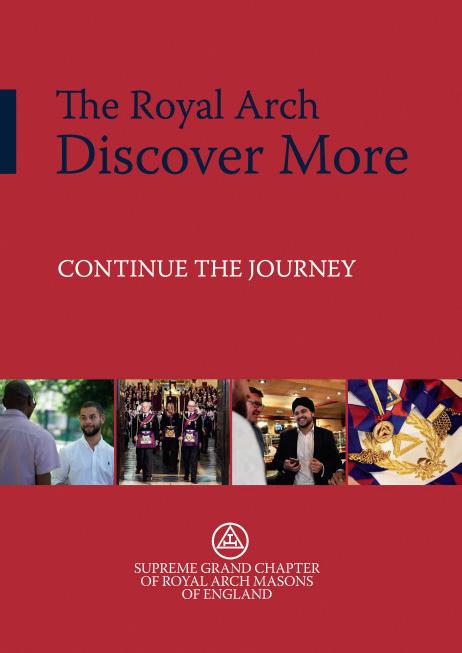
We are inviting feedback from our Chapters in order to assess their views and involvement to date and will then assist each Chapter with their specific needs. Archway is enthusiastically included by APGPs in Festive Board messages. A double-sided business type card has been produced with ‘Visit Archway’ and a QR link to the app on one side, and the key four Archway Stone headers on the reverse. These are currently being distributed on an ad hoc basis. Finally, the Provincial Executive has hosted a series of quarterly engagement calls via Zoom, inviting Companions to air their views on a variety of topics, including Archway. These have proved particularly successful.
Lincolnshire 76 Lodges 33 Chapters
Under the leadership of the incoming Third Provincial Grand Principal, Lincolnshire has assembled a group of six members with the skills and experience to roll out and support Archway across the Province. As an integral part of the Province’s Membership Challenge, the group has been tasked with delivering Archway in a manner that will enable each and every Royal Arch Chapter to take responsibility for shaping its own future.
During the initial planning stage, the group has identified the following key strategic components:
• To develop an effective, Province-wide communications strategy, including a ‘catchy Archway strapline’ for Lincolnshire.
• To identify and include stakeholders at all levels. For example, Visiting Officers, active Chapter Officers, and RA Reps to assist individual Chapters in getting the best from Archway.
• To produce an effective, informative and interesting way of presenting Archway. One of the main hurdles to overcome will be the geographical size of the Province.
• To identify a means of measuring the overall success of the project.
Within this framework, each component is the responsibility of an individual member.
Work on this initial stage is well on schedule for completion by the end of August, in readiness for the roll-out to begin in earnest after the summer recess. In the meantime, each of the group members is introducing Archway to their own Chapters in order to gauge the response and to identify current best practices, already in place, that can be shared.
To date, the response from those members who have seen the Archway initiative has been positive and the group is looking forward to seeing the project gain momentum as each of the Province’s 33 Chapters comes onboard.

Yorkshire, West Riding 171 Lodges 69 Chapters
Since the installation of James Newman as Provincial Grand Master and Grand Superintendent, the Province has adopted and embraced the single organisation ‘One Province’ approach, which aligns with the ‘One Journey, One Organisation’ strategy for Freemasonry in general.
Craft and Royal Arch Rulers meet quarterly to plan and implement this Provincial strategy. Heads of functions for both Craft and Royal Arch work together, not in silos, across both the Craft and Royal Arch activities. Royal Arch now has a much higher profi le within the Province, demonstrating the benefits of the One Province strategy.
The launch of the Discover More booklet and the message of ‘continuing the journey’ was well received as being more inviting and easier to convey. We plan to personalise the booklets to our Province. Every Master Mason receiving their Grand Lodge Certificate will be presented with this booklet by their Lodge Royal Arch Representative.
We have recently appointed a Provincial Chapter Membership Officer to drive through the launch of Archway. All major Officers in each Chapter and all Lodge RA Representatives received an email with a link to the Archway User Guide and a survey.
The survey feedback will be used to determine any further learning and training needs; initial feedback has been really positive. A pilot ‘Archway Awareness’ presentation has been trialled, with plans for a comprehensive roll-out over the coming months.
Excellent Companion Andrew Robinson, Assistant Provincial Grand Master and responsible for the roll-out of Archway in the Province, said, ‘Archway has come at the right time to support our Chapters in navigating their challenges. It serves as a toolkit and guide, offering our Chapters practical solutions, and will play a major role in addressing our Royal Arch Membership Challenge.’





Stephen Wyer details how the Membership and Communications Working Party has been tasked with fi nding a resolution for retaining members when they’re on the move
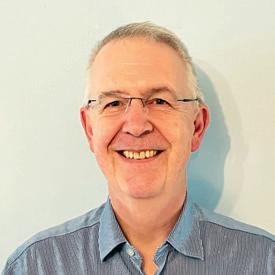





The loss of members who move within England and Wales has long been an issue for UGLE. While some Provinces have been proactive in referring such Brethren to their new home Province – and there has been some great effort in following up those leads – retention of such members has very often been the result of a lucky accident. It has largely occurred either because someone from the former Province has taken it upon themselves to make a referral, or the member has self-referred to his new home Province and has found a new Lodge that way.
This issue has now become a particular problem for Universities Scheme Lodges, whose members, by defi nition, are much more mobile and have tended to become ‘lost’ as they leave university and either return to their original home address or, more typically, move to a new part of the country to work or undertake further study.


In 2019, the Membership Working Party investigated the issue and made recommendations for reform. Much good work was done but, for a





variety of reasons – not least the pandemic – this work was never progressed.
In the meantime, several Members’ Pathway documents on migration were produced and the Universities Scheme drafted its own protocols. This has resulted in a fragmented system with no consistency of approach. There is the potential for confusion with different regimes being at cross purposes.


The Lodge Mentor monitors every Below the Chair Not Officer’s (BCNO’s) plan (address change) for the next season (unless known)
• Actioned at planned intervals, such as early in the second half of every season.
The new Membership and Communications Working Party tasked a sub-group consisting of me, Chris Hirst from the Members’ Pathway team and Mo Afsa from the Universities Scheme to look at the issue.
Our recommended solution is based on three key principles. First, the solution should be simple and easy to adopt and to monitor. Second, it should be based on the Members’ Pathway framework that already exists. Third, it should be capable of being automated and easy to script into the new Membership System once it arrives.


The suggested solution is summarised to the right, but, in essence, it seeks to use Lodge and Provincial Mentors at an early pre-migration stage, when news of the member’s intention to move to a new address fi rst becomes clear. Their details will then be entered into an easily accessible online form and an automatic referral will be sent via email to the Provincial Membership officer of the receiving Province, who can assist in identifying a suitable Lodge for them to join.
This solution has the great benefit of using the existing online system for capturing and referring unsponsored website enquiries to Met and the Provinces, which by and large works very well. This will make it much easier for UGLE to monitor and allow follow-up of those enquiries that have not been actioned. It will also be embedded within the existing Members’ Pathway documents to assist in achieving consistency of approach.

• He does this through the network of Personal Mentors (or Lodge buddies) or, in small Lodges, himself.
A member declares his intention to move out of the area. This is then communicated to the Mentor/Secretary
• Ideal world: the moving member will volunteer this information.
• Second best: good practice is that the Personal Mentor finds out about this early in the process.
• Real-life case: it randomly comes up in a conversation and is then escalated as above.
The Mentor explains how the moving member is supported and asks/consents for him to trigger migration process (MMP)
• Would they like to visit and/or consider joining a Lodge at the destination?

Centrally received enquiry is forwarded to the destination Provincial Grand Membership Officer (PGMO), exactly as other UGLE online enquiries


• Would they like to be introduced to or be contacted by a destination Lodge?
• Where is the destination?
Online scripting of the new scheme form and preparation of new materials for insertion into the existing Members’ Pathway resource is already underway.
The new migration system was outlined at the Universities Scheme conference in April, and training for Provincial Mentors and Membership Officers will follow over the summer with the aim of having the new system operational from September.

It is very much hoped that this new system will considerably reduce the number of Freemasons who are currently being lost to migration and thus contribute to the effective implementation of the retention strategy.
This step could be done by the Lodge Secretary.
MMP is triggered by completing an online form. This could be done by the member or the Mentor*
• The member is encouraged to complete and submit the form there and then (it takes 30 seconds).

• The person completing the form can copy a second person (Mentor/ Secretary) as a field.
• If consented, the Mentor/Secretary can complete the form for him.
• This may include a link to update the status by the case-handler at each step (for reporting).
• This could be a Customer Relations Management link or simply a link to the modifiable online form updating an online database.
• If this cannot be done (plugged in or manually), the PGMO remains responsible for reporting.
The PGMO checks the details on Adelphi and then progresses the case in exactly the same way as UGLE online enquiries

• Online enquiries for migration will, of course, progress more rapidly for an existing member.
• The PGMO can proactively guide the progress (more could be known about a member).
• There may be hidden steps here (as is the case for all online enquiries) involving a Data Protection Officer (DPO).
• The recipient PGMO can rapidly hand the case over to the Lodge Mentor after, or at his initial, contact.

The recipient Lodge Mentor adds the moving member to his Engage list and updates the progress
• This may include: ‘met with’, ‘visited the Lodge’, ‘engaging’, ‘joined’ and ‘disengaged’.
• The final completion of the case (joining) may need coordination between two Secretaries.
• The PGMO updates and reports

*Assumptions: Every Lodge Mentor keeps a list of all Brethren (especially those ‘Below the Chair Not Officers’, BCNO). This includes up-to-date details for each. Every Province has in place an established model for processing and recording online enquiries.

In continuing efforts to bolster the ranks and retain existing members, Freemasons in Hampshire & Isle of Wight are being proactive in their membership drive
In 2023, the Provincial Grand Master of Hampshire & Isle of Wight, Jon Whitaker, launched the Membership Challenge with a call to arms under the banner ‘Your Lodge, Your Future’.
In early 2024, the Provincial Membership Challenge Team organised a series of information sessions with the objective of providing Lodges with the knowledge and support to promote the Members’ Pathway. Attendees were invited to consider actions that could be used to Plan, Attract, Engage and Retrieve.
In February and March, the south-east area of the Province held two interactive sessions that were attended by 75 members representing their Lodges. The objective was to enable Lodges to turn their high-level ideas of possible actions into detailed, deliverable plans that Lodges and Brethren could use to deliver the Membership Challenge objectives. Following a short introduction on the issues typically faced by Lodges, and the techniques that have been used to successfully deliver change in organisations, Brethren broke into three groups, spending the remainder of the evening considering the key questions:
• Why choose this Lodge? (Plan)
• Why should someone join Freemasonry? (Attract)
• How do you keep members interested? (Engage)
Feedback on the sessions was positive, especially in enabling members to develop their ideas, further

share knowledge and produce action plans of how these ideas can be linked in successfully meeting the Membership Challenge.
During his participation in the sessions, Hampshire & Isle of Wight Freemason and change management professional Peter Hill underscored what he considered the three pivotal elements of the ‘Your Lodge, Your Future’ mantra:
1. Only Lodge members can change the Lodge. If change is imposed without their active consent and agreement, it will be resisted and will fail. Blame will fall on those who tried to impose it.
2. Only members can decide what the right future is for their Lodge. Others may have their ideas, but only if the members believe these are the right things to do will they commit to making it successful.
3. The onus is on you, the member. The real questions are: how many guests do you invite? What ritual do you offer to perform? What do you volunteer to do at the Festive Board to make things run smoothly?
How does a Lodge go about defining and delivering its Membership Challenge?
This leads to the two greatest, but most exciting, challenges of change management: what needs to change and to what? How to make the change?
Nothing typifies this in Freemasonry more than the words of the address to the Senior and Junior Wardens at Installation: ‘What you find praiseworthy in others you should carefully imitate, and what in them may appear defective, you should in yourself amend.’
Consider the top competitors, teams or individuals, in any sport or activity. They engage the best coaches they can to assist them in recognising how they can improve and the options for how that can be achieved. The coaches themselves cannot impose the change – they mentor, facilitate and critique. Getting an experienced external reference involved

can be the difference between survival and handing in the warrant.
One of the best ways to find out what motivates or demotivates people is to ask them via surveys, focus groups or listening to them – ideally all three.
Surveys were carried out in several Hampshire & Isle of Wight Lodges asking members what would encourage them to attend – or, conversely, to stay away.
Identifying what (and who) needs to change
As evinced by the surveys that were conducted, an enjoyable meeting is typified by a Lodge which has the following qualities:
• Good ritual
• A supportive atmosphere
• Is well attended by members and visitors
• Removes unnecessary administration
• Convivial Festive Board
• Good speeches when proposing and responding to toasts
• Well managed
The first step is to honestly review your Lodge and ask to what extent it fulfils these criteria and how things could be better.
When organisations engage with customers to understand their needs, they frequently employ this analysis approach:

Attendees were invited to consider how to ‘Plan, Attract, Engage and Retrieve’

• Must have
• Should have
• Could have
• Would like to have
In the Masonic context, some suggestions to consider are as follows:
• Does the Festive Board have to be a three- or fourcourse meal? Perhaps it could be only two, or a buffet?
• Do you have to sit with the same people you always do?
• Does every meeting have to be a ceremony or a Masonic talk? Why not local history or another topic?
• Above all, do you go away from the meeting having really enjoyed it and want to be there next time? If not, what are you going to do to make it so?
1. An external facilitator, who can also act as a knowledge source on where to look for examples of good practice and how to achieve them.
2. Visit and observe other Lodges. Approach the Lodges in your meeting place, especially the ones that are thriving. What are the things they do differently or better than your Lodge?
3. Look at other organisations.
Some Brethren feel Freemasonry is becoming too ‘businesslike’. It is not a business, but a Lodge needs to be run professionally to be successful and there are elements of a commercial organisation that may be helpful to consider.
The next steps involve close collaboration between the Hampshire & Isle of Wight Membership Challenge Team and individual Lodges to refine plans, ensuring the swift and effective delivery of benefits.
Additionally, a series of seminars will be organised to delve into specific challenges, including recruitment, mentoring, and fostering the personal development of Brethren, aiming to enhance engagement and retention support.
In line with guidance from Pro Grand Master Jonathan Spence, Cornwall Freemasons conducted a multiple candidate Raising Ceremony
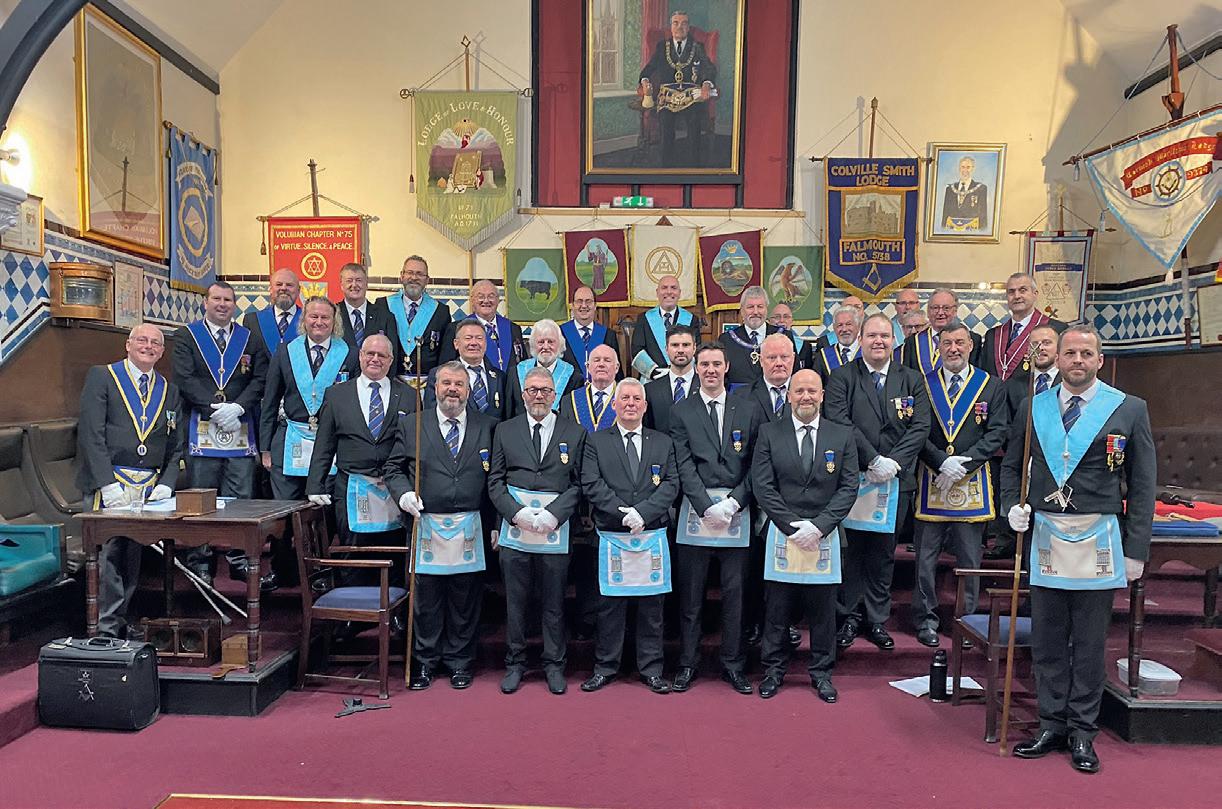
The Lodge of the Chisel is regarded as the premier Lodge in Cornwall for multiple ceremonies. It’s a reputation that did not disappoint as the Senior and Junior Deacons, accompanied by two Assistant Deacons, guided four candidates through the Ceremony of Raising on 2 February 2024. One was a candidate by request of the Worshipful Master of Sir John St Aubyn Lodge.
The evening brought together several elements of Freemasonry on what was an auspicious occasion. As well as being a Universities Scheme Lodge ceremony, members of the Trelawny Light Blues –the Light Blue initiative in Cornwall – assisted as the Deacons. This all took place in a packed Temple, in the presence of Provincial Grand Master David Maskell, who was accompanied by Assistant Grand Master Graham Bennett and David Pascoe, the Grand Superintendent of Royal Arch Masonry in Cornwall.
The Worshipful Master of the Lodge, Nick Annear, who also holds the office of Vice Chairman of the Light Blue initiative, was faultless with his ritual. The same can be said for Director of Ceremonies
Callum Gardner – also a very active committee member of the Trelawny Light Blues – in leading the procession of candidates and Deacons around the Temple.
Each element of the ceremony progressed seamlessly from one part to the next, in an
inclusive, engaging fashion that was testament to the work the Lodge has put into carrying out multiple ceremonies since its transition into a Universities Scheme Lodge in 2019.
The only time the candidates were separated from one another was after they retired from the Lodge while the Temple was prepared for the act of Raising. Once prepared, the candidates entered the Temple one at a time so that the Master could raise them individually, ensuring the element of mystery remained for each candidate during this pivotal part of the ceremony.
Simon Taylor, the Provincial Grand Director of Ceremonies Designate – who developed the full bespoke multiple ceremonies for the Lodge, which have received credit for putting particular focus on the candidate experience – delivered significant portions of ritual.
The evening was an opportunity to showcase how multiple ceremonies can be conducted, as the Pro Grand Master Jonathan Spence endorsed at the Quarterly Communication held in Wales. At the event, he reiterated the need to dispel the myths, misconceptions and errors surrounding ceremonies of multiple candidates – in particular, the myth that he feels is profoundly misguided, that being part of a multiple ceremony detracts from the experience.
Cornwall Provincial Membership Officer
Four candidates were guided through the Ceremony of Raising to a packed Temple
Simon P Mann said, ‘The Lodge of the Chisel delivered a spectacular display of what can be achieved if you have the insight and capacity to adapt a centuries-old tradition to captivate and engage a full Lodge by involving seasoned Freemasons alongside enthusiastic, younger Light Blues from across the Province to deliver a flawless ceremony.
‘You could see and feel the amount each of the players had invested in what they were doing, and the appreciation that those under guidance had for the dedication and rehearsal that had gone before.
‘A highlight for me was the way the Lodge managed to navigate the four candidates for the actual Raising. It was superb and will dispel any notion that a multiple ceremony is not personal to the candidate, as this significant part of the ceremony was undertaken on an individual basis, unseen and one after the other.
‘The connection that all the candidates had with each other was also evident, especially at the Festive Board. The bond of having shared their journey through all the degrees will be one that will continue to grow as they venture further into our wonderful fraternity.’

Newly Raised Master Masons were Exalted into the Royal Arch in Warrington Masonic Hall in a historic quintuple ceremony

In the grand chambers of Warrington Masonic Hall, a momentous occasion unfolded at the last meeting of Palatine Chapter no. 2447. Five Master Masons, all from Universities Scheme Lodges, were Exalted into Royal Arch Masonry.
Palatine Chapter had Exalted another five Master Masons into the Royal Arch at its previous meeting. This historic quintuple ceremony not only marked a significant milestone for the Chapter, but also showcased the thriving spirit of Freemasonry in the region.
This convocation was made even more remarkable by the attendance of The Most Excellent Third Grand Principal, Gareth Jones. His presence, alongside The Most Excellent Grand Superintendents of both East and West Lancashire, Robert Frankl and Mark Matthews, along with their Deputies and the Second and Third Provincial Grand Principals, was an honour that underscored the significance of the ceremony.
The Most Excellent Third Grand Principal expressed his enjoyment of the evening and the Chapter’s embodiment of the spirit of ‘One Journey, One Organisation’, highlighting the profound impact of Palatine Chapter no. 2447 and its members on the broader Masonic community.
The ceremony was magnificent. Orchestrated with precision and passion by E Comp Paul Renton, the event was further elevated by the assistance of E Comp David Coulson, the outstanding and entertaining performance of E Comp David Basger as the acting Principal Sojourner, together with the Principals and the other Officers of the Chapter. Their combined efforts ensured that the ceremony was both memorable and meaningful, but also very enjoyable for the nearly 100 in attendance.
Warrington Masonic Hall, renowned for housing the Museum of Freemasonry, served as the perfect backdrop for this grand event. The Museum, a major attraction for the Hall, stands as a testament to the rich history and traditions of Freemasonry. It was within these walls, steeped in history, that the newly Exalted Companions took their significant step into Royal Arch Masonry.
Palatine Chapter no. 2447 is a Peripatetic Universities Scheme Chapter, a unique shared venture between the Provinces of East and West Lancashire. This collaboration has fostered a vibrant community of members from both Provinces. The Chapter’s peripatetic nature allows it to hold meetings in both Manchester and Warrington, bridging the two Provinces and fostering unity and camaraderie.
The five newly Exalted Companions celebrating the multi-ceremony milestone, together with the Officers of the Chapter
The recent meeting was a testament to the Chapter’s growing influence and appeal. It attracted a multitude of visitors from both East and West Lancashire, all eager to witness the Exaltation and partake in the festivities. Palatine Chapter stands as a shining example of the success of the Universities Scheme. Its ability to attract and engage members, especially from the academic community, is commendable.
As the evening drew to a close, the air was thick with anticipation. The success of this meeting has set the stage for future gatherings. Palatine Chapter looks forward to its next meeting, where multiple Exaltations are on the horizon. With a number of applicants eagerly waiting in the wings, the future of the Chapter looks brighter than ever.
The last meeting of Palatine Chapter was not just an event, it was a celebration of Freemasonry, unity, and tradition. As the Chapter continues to grow and evolve, one thing is certain: its commitment to the core values of Freemasonry remains unwavering.
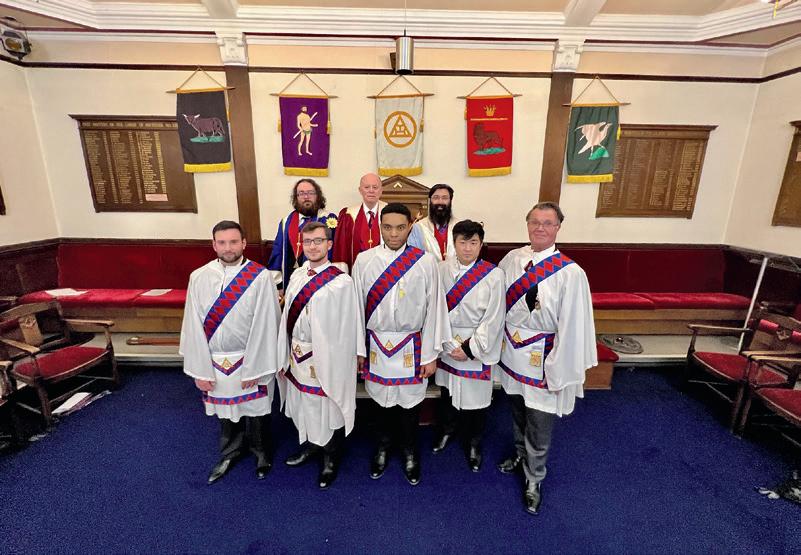
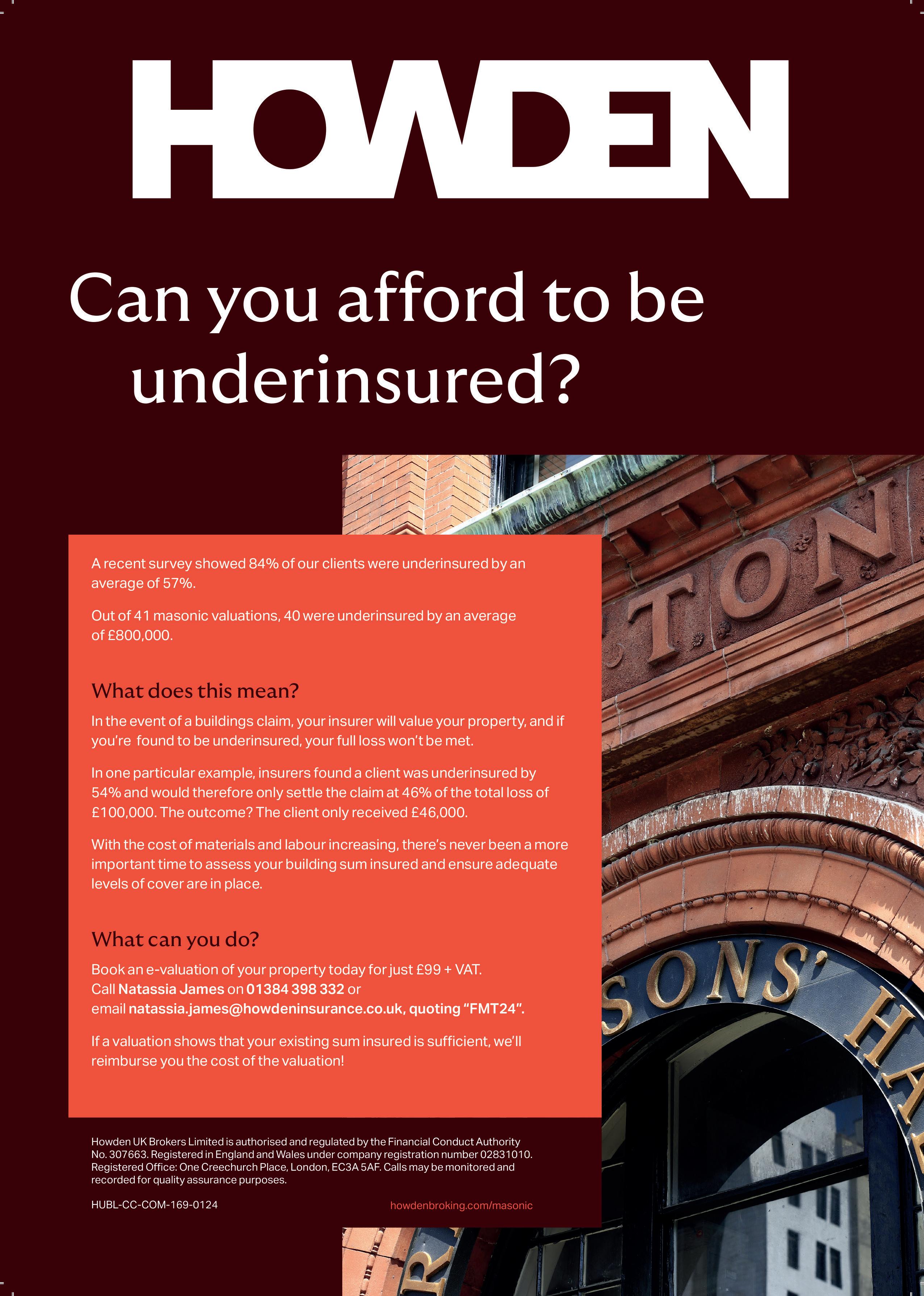



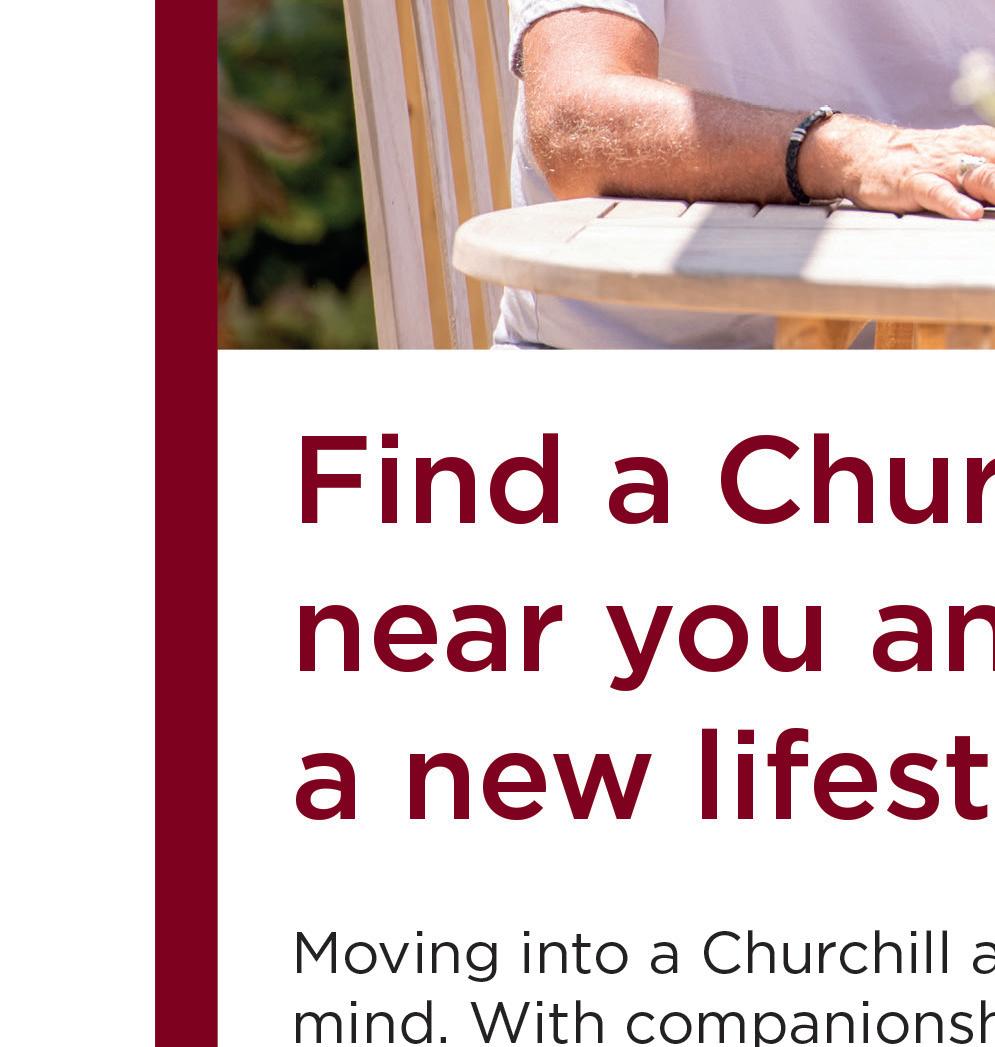








Some 130 delegates from around the Provinces, as well as professionals and support groups, heard the latest research at the Chaps/Tackle/Masonic (CTM) Prostate Cancer Screening Conference in Freemasons’ Hall on 26 March. Prostate cancer is now our most common cancer and the second most common cause of male cancer deaths. There are 56,000 cases and 13,000 deaths every year, with numbers rising.
The objectives of the event were to present the latest evidence from prostate cancer screening in the UK and Europe, to demonstrate the considerable benefits of screening to a national audience, and to present the latest outcomes and benefits of the CTM and UK screening projects.
The conference promoted the roll-out of screening and the CTM programmed protocol. Comprehensive prostate cancer screening is proven to reduce mortality substantially, with PSA-based screening programmes in Europe and the USA halving the death rate from the disease.

Windsor’s Christopher Wren Lodge held a meeting in Berkshire in March, where members celebrated an occasion that was as rare as it was joyous. Long-term members Harry Benford and Bob Dent were to be recipients of long service
awards. Harry was Initiated into ‘The Wren’ in 1954, the first of three men in his family to join this Lodge. At 98, Harry has led an interesting life. Provincial Grand Master Anthony Howlett-Bolton OBE summarised this while presenting a delighted Harry with his certificate. Anthony then moved on to present Bob Dent with his 50-year certificate. Bob joined Freemasonry while working in Hong Kong in 1974. On returning to the UK, he joined Christopher Wren Lodge in 1983.

Buckinghamshire has launched a series of events aimed at attracting new members. So far, it has held one meeting at Slough Masonic Centre and one at Bletchley Masonic Centre.
The evenings consist of a reception where potential candidates and their hosts can meet experienced Freemasons and members of the Provincial Executive.
This is followed by a short presentation, where experienced members describe what Freemasonry is all about. The group is then taken on a tour of the Temple, followed by food and drinks.
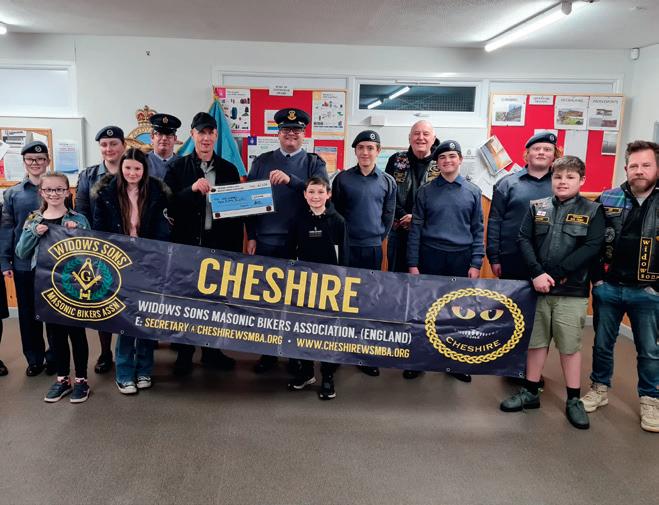
Hoylake’s RAF Air Cadets received a massive boost when Hoose Lodge in Hoylake joined the Widows Sons
Masonic bikers group and the Cheshire Freemasons’ charity to present £4,750 to 472 Squadron RAF Air Cadets at its parade meeting.
The donation will fund the purchase of software and equipment for a fully functional flight simulator. Flight officer Neil Monaghan, the squadron's commanding officer and a member of Hoose Lodge, said, ‘The high-tech equipment and software will enable the cadets to experience flying different aircraft whilst at their meetings and prepare them for more practical flying skills in the future.’
It was after a meeting of Hoose Lodge that Neil told Charity Steward Steve Croft he was fundraising for his squadron. Steve then approached John Raby of the Widows Sons Masonic Bikers Association and both took the idea to their respective Lodge meetings. Both Hoose Lodge and the Widows Sons members said it was a pleasure for them to be able to support such a worthy cause and were grateful for the added support from the Cheshire Freemasons’ charity.
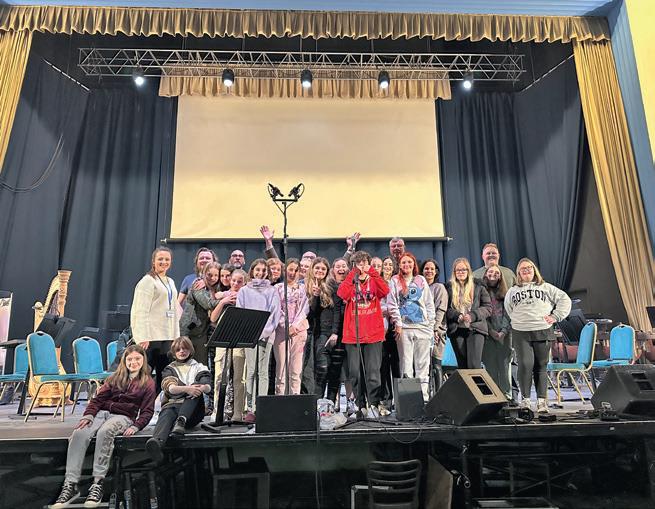
Last November, the Bath Philharmonia asked Devonshire Freemasons to fund a project to help young carers in Plymouth find support and companionship through developing their musical skills. Freemasons agreed unanimously to donate £1,500 to this worthwhile cause.
A young carer is a child (aged 5 to 18) who has a significant caring responsibility for a family member who is ill, disabled or misuses drugs or alcohol. These caring roles can affect their education, friendships, health and wellbeing.
Bath Philharmonia has committed to include its creative learning projects – music created by young carers and school-aged children – in every concert programme. The music these young

people make during workshops is then orchestrated and performed on stage, accompanied by the orchestra's professional musicians. The young people are fully integrated into the performance, with children standing among the different sections of the orchestra.
Freemasons subsequently attended a show at the Forum Theatre in Bath in January. Not only were the young carers there to perform their musical piece ‘Penguins’, but that night, worldrenowned violinist Nicola Benedetti kicked off her world tour.
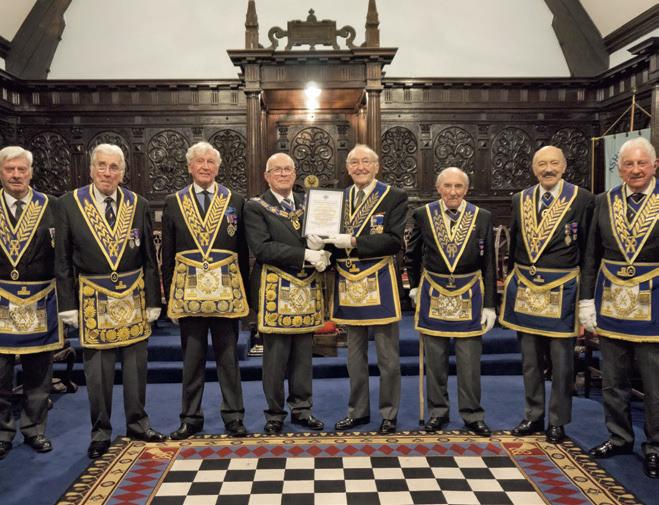
In March, Ashley Lodge no. 6525 celebrated Ron Kiver’s 50 years of service. Ron is one of the Lodge’s most respected members, so it was only fitting that Provincial Grand Master for Dorset Graham Glazier presented him with his 50-year certificate and pin. The ceremony took place in front of 50 members and their guests, including two Past Provincial Grand Masters and three Past Deputy Provincial Grand Masters.
Born in 1934, Ron was Initiated into the Lodge in 1974. He first took office as a Steward in 1976, becoming Master in 1985 and again in 1987. He was exalted into St Aldhelm’s Chapter no. 2559 in 1978 and became its Most Excellent Zerubbabel in 1992. He has held numerous active Provincial offices, along with Grand Rank in both the Craft and Royal Arch, culminating in his appointment to the active rank of Junior Grand Deacon by Grand Master and First Grand Principal HRH Duke of Kent in 2010.
Ron is an active member of Craft Lodges and RA Chapters, having just served a second term as First Principal of St Aldhelm’s Chapter. At the meeting, more than £500 was raised for the 2025 Festival and the Masonic Charitable Foundation (MCF, the Freemasons' charity).

East Kent’s Septum Lodge hosted Brethren from the Friederich Zur Vaterlandsliebe Lodge no. 5817 in Koblenz, Germany. Included in their itinerary was a visit to the Kent Museum of Freemasonry and its library. Worshipful Master Willie Beckmann expressed his delight at the unparalleled experience offered by the museum, and the visitors were fascinated by the Masonic history and heritage on display. Visually impaired member Alex Walter was shown a Past Master’s Collar Jewel featuring a Braille inscription of the Stella Maris Lodge in East Kent, and Curator Ron Carter revealed a ritual book written in Braille – a first for Alex who had previously relied on auditory learning. The visit stands as testament to the museum’s values of unity, inclusivity and enlightenment.
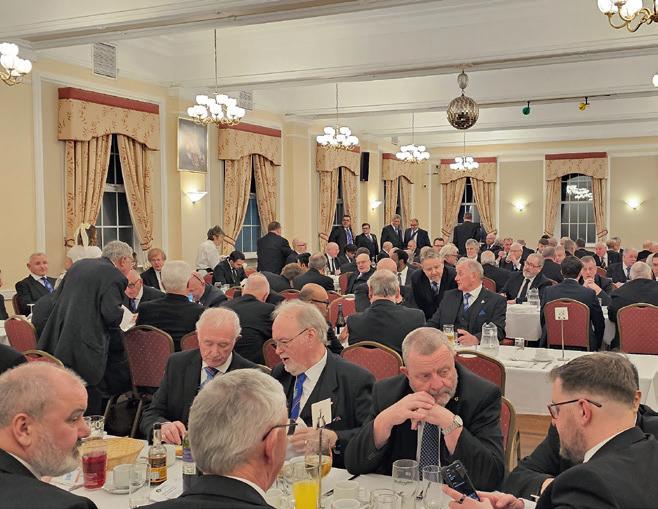
The University of Manchester Lodge no. 5683 has conducted a quadruple Initiation in Salford Masonic Hall in the presence of a Provincial Deputation and the Deputy Grand Master of UGLE Sir David Wootton.
Dr Simon Archer opened the Lodge before Provincial Grand Director of Ceremonies, John Lees announced that the Provincial Grand Master Robert Frankl, demanded admission.
Assistant Grand Director of Ceremonies Jeremy Roberts entered the Lodge and then announced that Deputy Grand Master Sir David Wootton demanded admission. The Grand Deputation proceeded into the Lodge, and the Worshipful Master offered the gavel to the Deputy Grand Master, who then declined it, saying he was looking forward to the Worshipful Master conducting the ceremony, as he had on many occasions while he was a Deputy Grand Director of Ceremonies in United Grand Lodge.
The subsequent ceremony stood as testament to the diligent efforts invested by the Lodge, exemplifying a flawless execution of the Initiation process. It served as a shining example of adeptly managing multiple candidates, leaving a lasting impression on observers, who undoubtedly took note of its adaptability.
Upon the conclusion of the ceremony, the Deputy Grand Master took the opportunity to extend a warm welcome to the newly Initiated members.

More than 100 members and guests attended a meeting of Richard Clowes Lodge no. 2936 in March at the St Giles Masonic Centre in Colchester, where guest speaker Natasha Ward offered an insider’s view of the Masonic Charitable Foundation (MCF, the Freemasons’ charity).
Having worked for the MCF for nearly 20 years, Natasha described how Freemasonry’s national charity has made a difference to so many lives, with more than £12.8 million given to support charities in 2023.
After the Lodge meeting, Mark Smith, an Assistant Provincial Grand Master and one of the arms and militaria specialists on the Antiques Roadshow, gave a talk entitled ‘For Valour – the Story of the Victoria Cross’. Listening in the Junior
Warden’s Chair was serving Warrant Officer Class 2, Johnson Beharry VC, the next Worshipful Master of Richard Clowes Lodge, and the first living recipient of the Victoria Cross for nearly 40 years.
The sum of £1,040 was raised for charitable causes at the meeting. The Lodge Treasurer and Provincial Grand Almoner for Essex Freemasons, Gary Hostler said, ‘It is a magnificent sum of money. Thank you to everyone who donated. We all feel highly honoured as we look forward to Johnson Beharry VC being our next Worshipful Master.’

Such was the high regard for a former Provincial Grand Master of Hampshire & Isle of Wight, that a Lodge has been consecrated in his name. The Brian Bellinger Lodge of Installed Masters no. 10047 has 77 members, who attended its creation at Southampton’s Botley Masonic Centre, where Provincial Grand Master Jon Whitaker led the ceremony.
Brian was Initiated into Portsmouth’s Phoenix Lodge no. 257 in 1969, and ruled a number of Lodges, as well as being active in Companion orders. He became Provincial Grand Master in 2003 and stepped down seven years later. However, he continued to have a very active role within the Province and for Grand Lodge before his passing in March 2023.
The Lodge will meet at Winchester Masonic Centre. Its mission is to be a centre of excellence that provides new Past Masters with the knowledge to progress and enjoy their Freemasonry. The Worshipful Master James Kneller said, ‘During the Consecration, we expressed our sincere gratitude to the late Brian Bellinger, in whose name the Lodge has been founded. His commitment to caring for our Brethren and supporting Brethren through their journey in Freemasonry is the bedrock on which this Lodge was founded.’
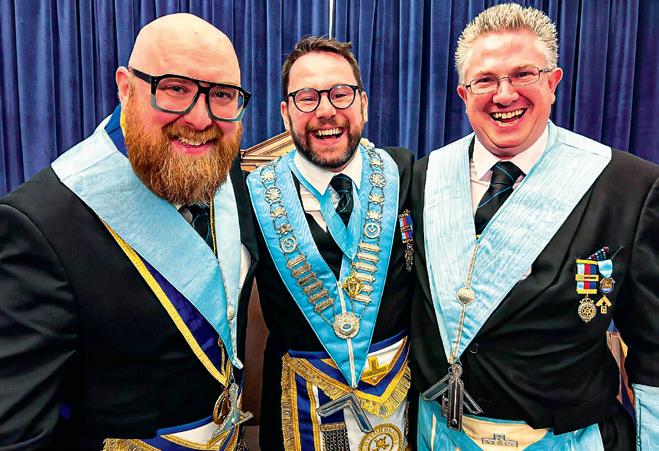
Following the Strategy set by the Pro Grand Master, Gladsmuir Lodge embarked on a transformative journey that revitalised its membership and exemplified the power of collaboration within the Masonic community.
The Lodge found a renewed sense of purpose through its association with the Fleet House Light Blues Club (FHLBC) of Hertfordshire, and welcomed 23 joining members from the Club at its January meeting in Radlett.
The Provincial Grand Master’s Installation of one of the Club’s founders, Tom Golds, into the Chair of King Solomon symbolised the seamless integration of the two entities. The appointments of FHLBC founder members Dan O’Connell and Nick Tessier as Wardens further underscored the collaborative and cooperative spirit.

Following the recent Installation meeting of Jersey Lodge of Unity, Harry Rondel got the surprise of his life. Harry was a volunteer soldier in the Parachute Regiment for three years between 1957 and 1960. After passing out of training at the Airborne Forces Depot in Aldershot, he had been posted to 2nd Battalion, the Parachute Regiment and served in Cyprus and Libya.
On leaving the army and returning to Jersey to pursue his second career in the carpet industry, Harry had left his maroon
beret behind at Aldershot. Learning of this, one of the Lodge members decided that it was appropriate for Harry to be presented with a replacement beret and pair of parachute wings by his son, Mark.
The presentation took place at the Festive Board to much acclaim by the members of the Lodge. As Field Marshal Montgomery once said of soldiers of the Parachute Regiment, ‘They are, in fact, men apart – every man an Emperor.’
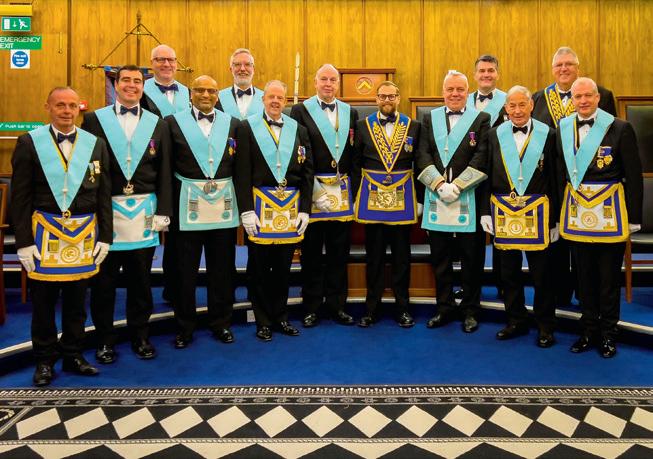
In 2015, Leicestershire & Rutland Freemasons came up with a grand idea to commemorate the forthcoming 300th anniversary of the first Grand Lodge –a 300-mile cycling odyssey traversing every Masonic Centre in Leicestershire & Rutland and culminating at Freemasons' Hall in London.
The Masonic Charitable Foundation (MCF, the Freemasons' charity) and Rainbows Hospice for Children in Loughborough were chosen as the beneficiaries of the charity cycle. In 2017, 23 cyclists completed the challenge over four days, raising more than £23,000.
The success of this charity ride laid the foundation for the Leicestershire & Rutland Masonic Cycling Association, a thriving community that continues to organise regular rides and charitable events. And now, members have achieved the long-held ambition of founding a specialist cycling Lodge for Freemasons who share a passion for the open road.
An existing Lodge in Leicester – Jason Lodge no. 7716 – is being repurposed, ready to welcome a new era of members bound by spokes and steeped in the rich traditions of Freemasonry.


The March meeting of Lincolnshire’s Hereward Lodge no. 1232 was a memorable occasion. First, the Lodge was honoured to receive a visit from Provincial Junior Grand Warden Paul A Ellis, who presented member Eric Jessop with a certificate to mark his 70 years of Freemasonry. Now 96, Eric was Initiated in 1954 and is still a regular attendee at meetings. He was also presented with a decorated cake, and a card signed by Lodge members. The night was also momentous in that Matt Williams was Initiated into Hereward Lodge.
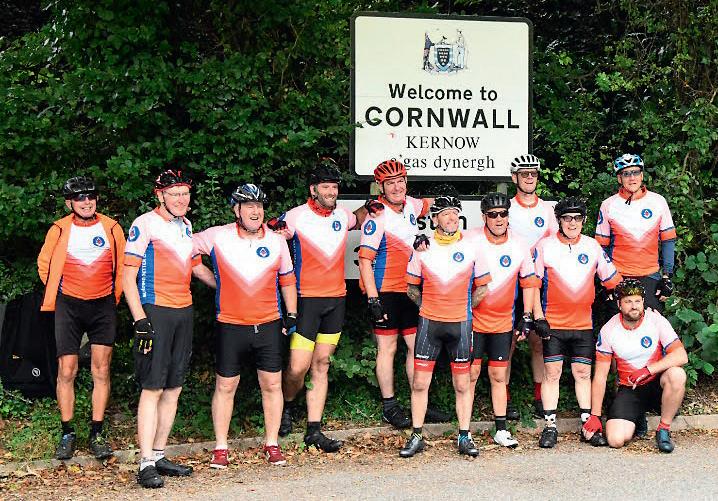
MIDDLESEX
Five Middlesex Lodges led by Deputy Provincial Grand Master Jim Mitchell are heading to Newquay, Cornwall on 30 August in support of a charity cycle ride. The riders, from Middlesex and Buckinghamshire Lodges, have already raised more than £1,000 on behalf of CHAPS – the charity associated with prostate cancer testing and diagnosis.
The two-day charity ride from Exeter to Newquay was conceived by Alfie Buckland, having seen the benefits of PSA testing when Allan Pulford from Circle of Friendship Lodge no. 7320 was diagnosed with prostate cancer after a PSA test at Harrow Masonic Centre.
CHAPS helped him with advice on what course of action to take, and after radiotherapy treatment, Allan
received encouraging results and is now in remission.
A team of 12 riders, two support drivers and two medical support officers will take on some challenging climbs across Dartmoor before a 45-mile sprint to Newquay Masonic Centre.
Around £10,000 is expected to be raised for CHAPS and, to celebrate, a special meeting of Towan Lodge no. 7684 will be held in Newquay, where representatives from five Buckinghamshire Lodges and five from Middlesex will attend. The meeting will hear from Allan about his experience and recovery from cancer.
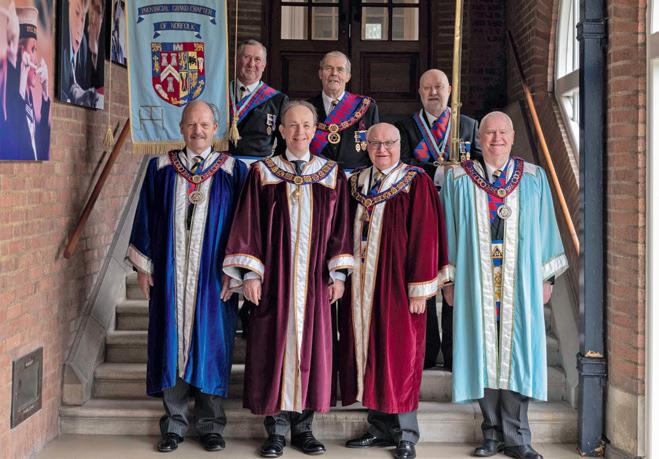
Following the closure of Saint Andrews Hall in Norwich for restoration, more than 400 Norfolk Freemasons headed to the Royal Hospital School in Ipswich in February to witness two memorable ceremonies led by Pro Grand Master and Pro First Grand Principal Jonathan Spence DL, and his teams from UGLE.
The first was the Investiture of Michael Richard Butler MBE, DL as Grand Superintendent of Norfolk – a spectacular ceremony featuring notable speeches by the Pro First Grand Principal and the Grand Superintendent.
The afternoon saw the Investiture of Michael as the Provincial Grand Master of Norfolk. Those present listened to speeches by the Pro Grand Master and Michael, the now Provincial Grand Master, both demonstrating their support for UGLE’s Strategy to unite the Craft and Royal Arch under the single banner of ‘One Journey, One Organisation’.
The Provincial Grand Master then re-appointed those officers previously appointed at the May 2023 meeting of Provincial Grand Lodge, before appointing Luke Paul Maurice Loades as one of his Assistant Provincial Grand Masters. A truly memorable event for all present.
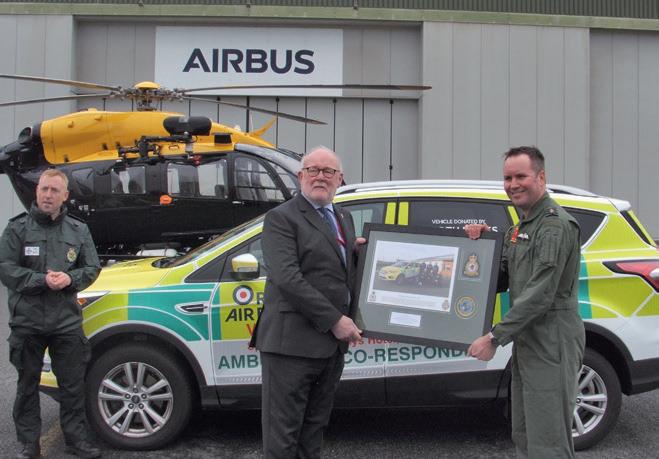
In June 2023, RAF Valley personnel established an ambulance co-responders team to assist the Welsh Ambulance Service and NHS Trust, to respond quickly to emergencies across Ynys Môn and, when called upon, part of the mainland including Bangor.
Today, this volunteer service has come of age with the handover of its own dedicated emergency response vehicle funded by North Wales Freemasons.
The RAF Valley co-responder team was the brainchild of Flying Officer William Dinmore, who arrived at RAF Valley in October 2022. He pursued the idea of starting an RAF Valley co-responders team capable of providing key support to the local community and the Welsh Ambulance Service Trust (WAST). In 2023 alone, the RAF Valley team responded to 23 emergency call-outs and provided life-saving care to 17 patients.
In accepting the bespoke vehicle on behalf of RAF Valley, group captain Matt Hoare, the station commander, said, ‘We are proud to be part of this endeavour and our volunteer team is already making a tangible difference – providing timely emergency assistance to those in need within our Ynys Môn community.’
Head of North Wales Freemasons John Hoult, said, ‘We are proud to support the RAF Valley co-responder team by funding this bespoke emergency response vehicle. This will improve their ability to support the Welsh Ambulance Service and enhance first responder capacity across the island of Anglesey and beyond.’
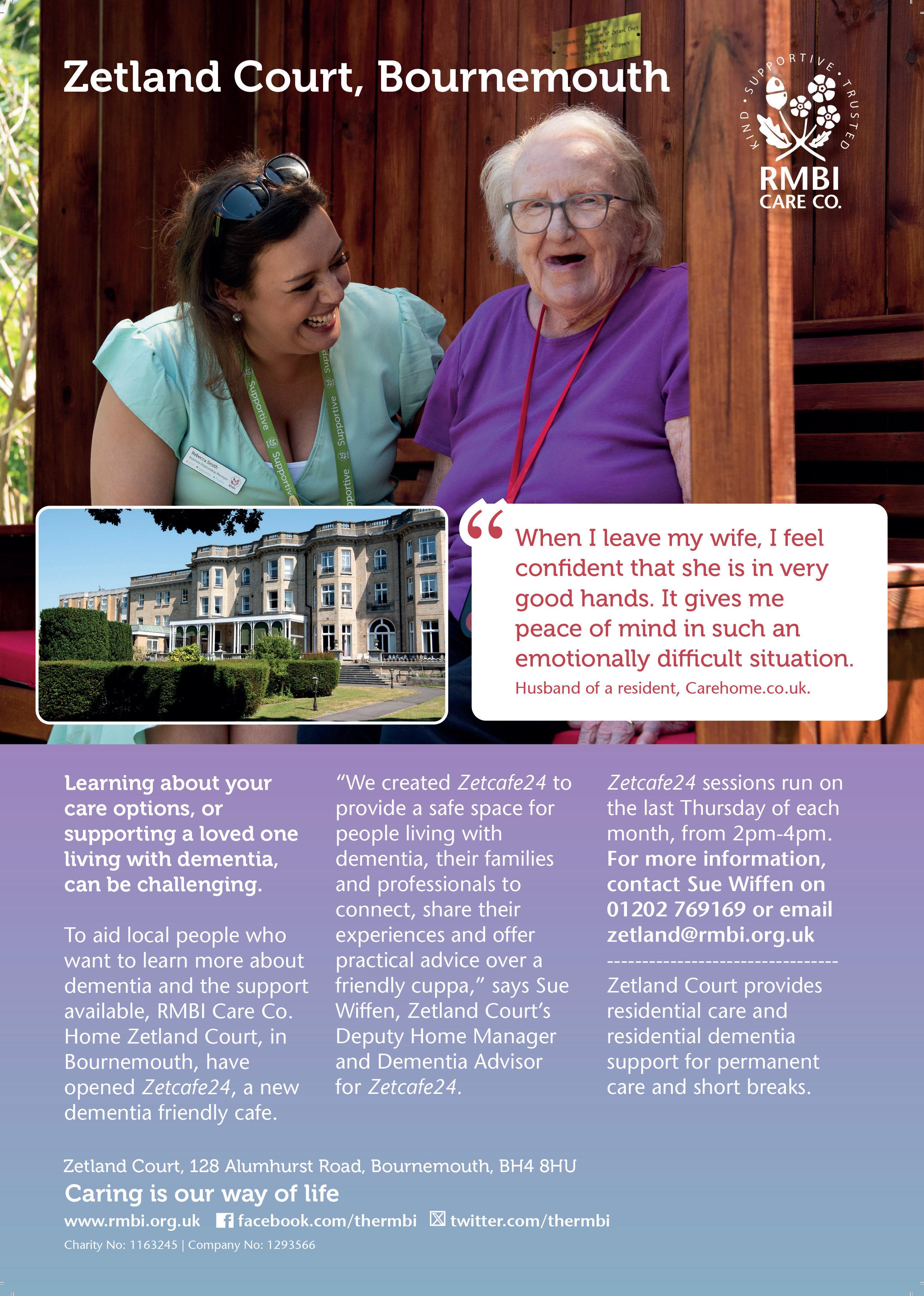
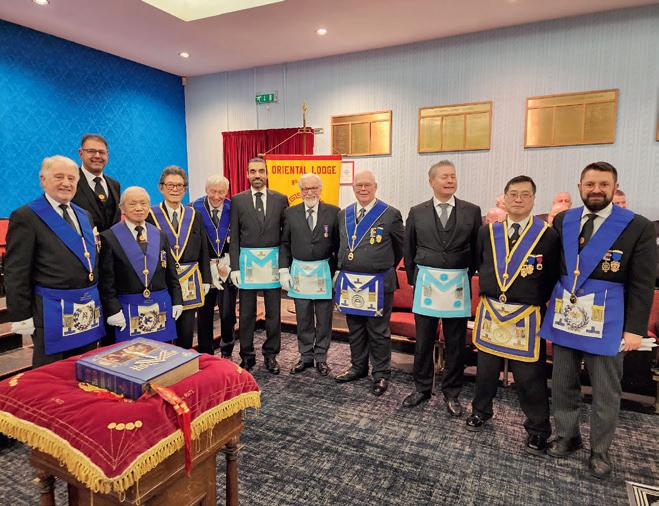
The Secretary of Northumberland’s Oriental Lodge no. 9371, Kam Wah Mak, has embarked on a project to bring together Brethren from Lodges with a connection to East Asia.
Oriental Lodge was consecrated by members of the Chinese community in Newcastle to create a supportive environment for Freemasons with a connection to East Asia. The Lodge was a success and is one of the largest in the Province. Known for its hospitality and spectacular Festive Boards held at Chinese restaurants across Newcastle, the motto of Oriental Lodge is ‘Bridge of Friendship’. The Lodge also makes regular visits to Zetland & Hong Kong Lodge in London, and, from time to time, has organised visits to Lodges in Hong Kong.
Kam Wah explained the idea behind the new project. ‘The mission of the Society of East Asian Freemasons is to establish and maintain a network of East Asian Freemasons – or Brethren with a connection to East Asia – to encourage their participation in and enjoyment of Freemasonry, and to attract others into the Craft’. Interested Brethren can contact at: kamwah.mak@gmail.com
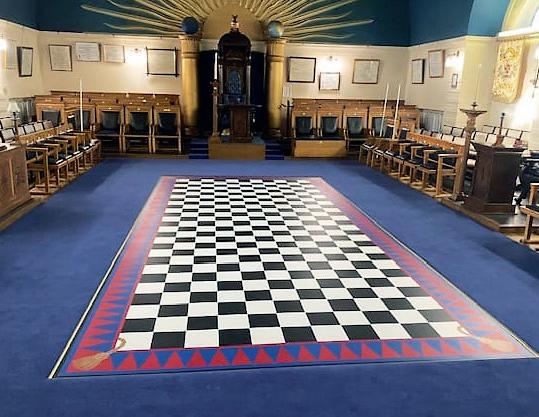
The Art Deco Penarth Masonic Hall in the Province of South Wales has been
undergoing a transformative renovation at the hands of a team of dedicated volunteer Freemasons, professional builders and craftsman since 2016.
From its inception 98 years ago, the building has served as a haven for various Lodges and other Orders, hosting events that have brought joy, support and assistance to those in need.
However, wear and tear and the weight of nearly a century of Masonic rituals had taken its toll, particularly on the floor of the Grand Temple. The once beautiful tessellated pavement that supported countless ritualistic movements from Initiation to Installation was in dire need of renewal. Nearly two years of research and planning led to the flooring being renewed by contractor Amtico. The significance of the flooring, particularly its allegorical ties to Freemasons, required a high level of commitment to aesthetics in keeping with the original design. The result is a floor that not only meets but exceeds expectation.

The Masonic Hall at Aldridge was the setting for the Installation of Staffordshire Freemasons’ new Assistant Provincial Grand Master, Jeremy Roberts. The ceremony was attended by Provincial Grand Master John Lockley, his deputy David Thomas and his assistant John Derry. Steven Varley, an Assistant Grand Master of UGLE, was special guest.
Jeremy was Initiated into Streetly Lodge on 26 January 2002 by his father, Brian. Jeremy's grandfather, Dr FR Roberts OBE, was the first Initiate of the Lodge. Jeremy served as Master in 2009 and is currently Lodge Secretary. He has also served as Charity Steward, Treasurer, Director of Ceremonies and Organist. In 2011, he was appointed Provincial Grand Steward in the Provincial Grand Lodge. He joined the Staffordshire Provincial Grand Stewards’
Lodge and is the Director of Ceremonies. He has also been the Treasurer.
Jeremy is also a member of Foster Gough Lodge, Hatherton Lodge and is an honorary member of Musket, Pike and Drum Lodge, as well as Science Fiction and Fantasy Lodge.
In 2014, he was appointed to the office of Provincial Assistant Grand Director of Ceremonies and, a year later, to Provincial Deputy Grand Director of Ceremonies, where he remained for three years. After that, he was promoted to Provincial Senior Grand Warden in 2019. His last appointment was as Provincial Grand Director of Ceremonies in 2020, where he remained until March 2024.
In April 2023, Jeremy was appointed as a Grand Officer, as Assistant Grand Director of Ceremonies in The United Grand Lodge of England. He is active in the Royal Arch and became the First Principal in March 2018 of The Chapter of Honour in Wolverhampton. He was appointed as the Provincial Grand Sword Bearer in 2020.

A Ukrainian Freemason building a new life has been welcomed into Freemasonry in Suffolk after his home town of Kharkiv saw fierce fighting that has claimed lives, destroyed homes and made many aspects of normal life impossible.
Ihor Chyshkala, a member of Kharkiv’s Harmony and Order Lodge no. 21 in the rolls of the Grand Lodge of Ukraine, became a joining member of Doric Lodge no. 81 in Woodbridge, Suffolk in February. He said, ‘Freemasonry offered a familiar setting and familiar friendship, even if some small details of the ceremonies and aprons were different. The common principles made me feel welcome from the start, and it was wonderful to sit back down for the first time as a member of Doric Lodge rather than just a visitor.’

Guiding Ihor through the ceremony was Geoff Spencer, who has taken the Chair of Doric Lodge for its Bicentenary year. It’s not often a Worshipful Master is asked to help a Freemason from another jurisdiction step into English Freemasonry, and Geoff had been asked to present an English Constitution apron to Ihor. Geoff said, ‘We’ve enjoyed Ihor’s company since last year and are delighted to see him become a joining member. It’s proof that the bonds of friendship in Freemasonry cross borders and I hope he has many happy years ahead of him at Doric Lodge here in Suffolk.’
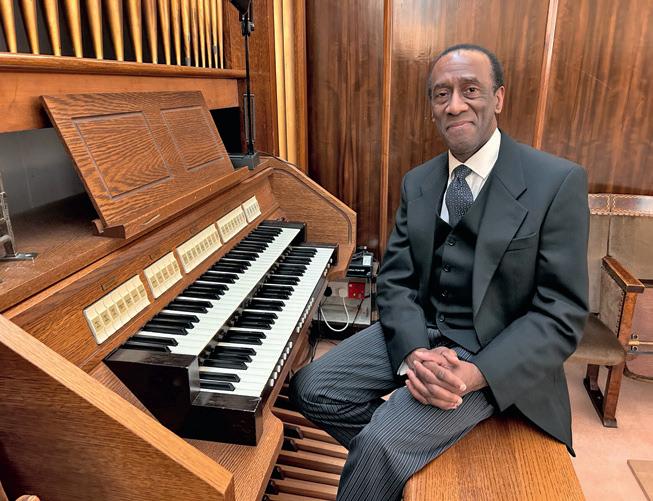
A golden moment occurred at the Worcestershire Installed Masters Lodge no. 6889, when guest speaker and organist Carl Jackson gave a highly personal perspective on Freemasonry. He is part of the Organ Committee for the Grand Temple organ at Freemasons’
Hall. Since its recent refurbishment, the organ is now fully resplendent in both look but, more importantly, sound. He also explained how Freemasonry, through its bursaries and grants, supports the development and growth of new organists in the wider music world.
Carl is also the Director of Music at the Chapel Royal, Hampton Court Palace and a renowned educationalist from his 36-year career as a teacher of music until his retirement.
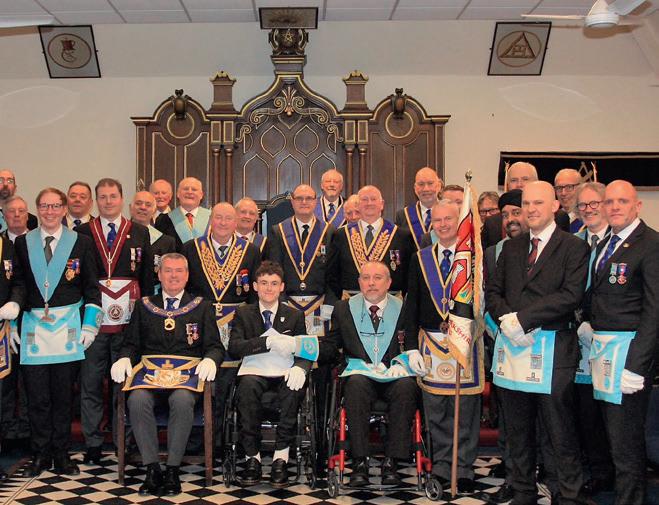
Being on the level is an essential part of being a Freemason, but for former soldier Adam Douglas of Pilgrim Lodge no. 7728 in Leeds, it has extra significance. He has been in a wheelchair since being wounded while serving with the Yorkshire Cavalry Regiment, the Royal Dragoon Guards in Iraq in 2003.
The former corporal had been Initiated into the Lodge Neuhaus no. 946 in the
Grand Lodge of British Forces Serving in Germany, and once he had left he joined Pilgrim Lodge in his native Leeds. Adam is also a member of Saint Patrick’s Lodge no. 295 on the Roll of the Grand Lodge of Ireland, and this Lodge is warranted to the Royal Dragoon Guards.
Adam explains, ‘I was asked to advise when another wheelchair user, Kai Stephenson, had expressed interest in becoming a Freemason. Originally, he looked at Lodges in Castle Grove in Leeds, but the number of stairs was proving problematic. That’s when I had my lightbulb moment and realised that my own Lodge met at the North Leeds Masonic Centre, and everything was on one level in that building. It was the ideal solution.’
Kai became a candidate for Pilgrim Lodge and Adam played the key role in Kai’s Initiation.
Adam says, ‘Our Worshipful Master David Hooks was not able to be present for Kai’s Initiation so I asked the Immediate Past Master Peter Goodland if I could undertake the role. It was an amazing and emotional moment for me as a wheelchair user to initiate another wheelchair user into the Craft. Hopefully this development at Pilgrim Lodge will encourage other Lodges to give similarly disabled men the opportunity to join Freemasonry. Kai is now settling into life as an enthusiastic member of Pilgrim Lodge and is looking forward to taking his place on the ladder as soon as an opportunity arises.’
Please use this form to receive FMT, to notify us of a change of address or to request to be deleted from the FMT database. Do include the reference number found on the wrapper in which FMT arrived, where this is known. For a change of address, please fill in both your current and new address. Please tick the box below as appropriate:
I wish to receive a free copy of FMT I wish to notify a change of address I wish to be removed from the FMT database
Please state reason (resignation/not interested/ deceased/receive duplicate copies, etc): Please
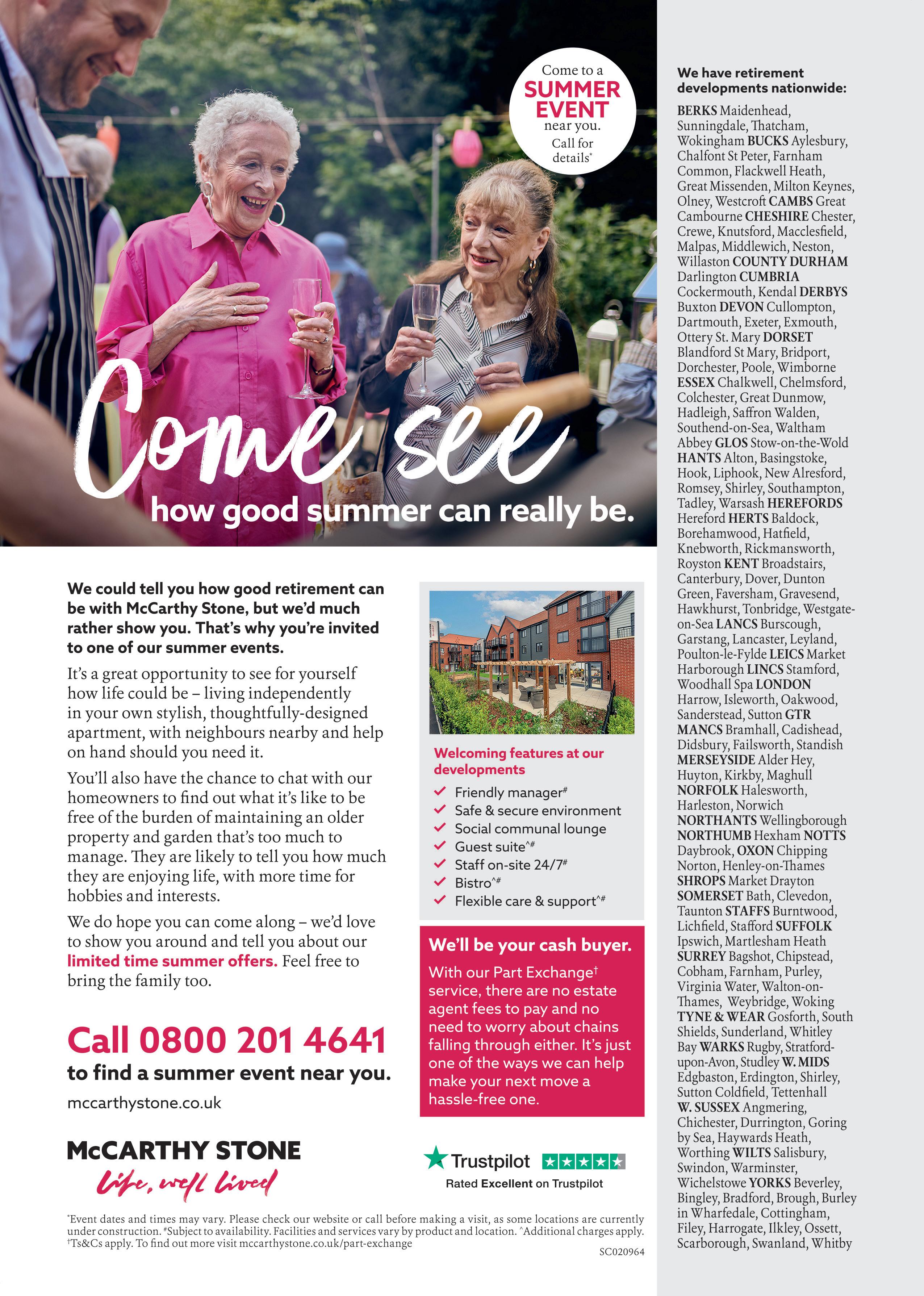







As the new Grand Master of the Honourable Fraternity of Ancient Freemasons, Carol Cole tells Peter Watts what drives her passion for the Craft
PORTRAITS RICHARD GLEED

The first time Carol Cole heard about the existence of women Freemasons was after a PTA meeting at her daughter’s primary school in 1991. Carol had put a series of difficult questions to the headmistress, after which an impressed mother took her to one side. ‘She asked if I’d be interested in Freemasonry,’ recalls Carol, the new Grand Master of the Honourable Fraternity of Ancient Freemasons (HFAF). ‘I said “not particularly”, but she thought I might enjoy it and invited me to a social event.
After about 18 months, I joined Grace Bilantz Lodge.’
Grace Bilantz Lodge no. 34 is named after a former Grand Master of the HFAF.
The Lodge has produced more Grand Masters than any other, with Carol elected to Grand Master Designate in October 2023 and Enthroned as Grand Master in January of this year. She heads an organisation of 800 members, having won more than 75 per cent of the vote in an election that is held every four years.
We meet in an office at Freemasons’ Hall, where Carol will later take her first Grand Lodge. She is relaxed about the occasion, as you would expect from this experienced Freemason and successful businesswoman.
Born in Plaistow, Carol’s career was in shipping and she ran her own business from
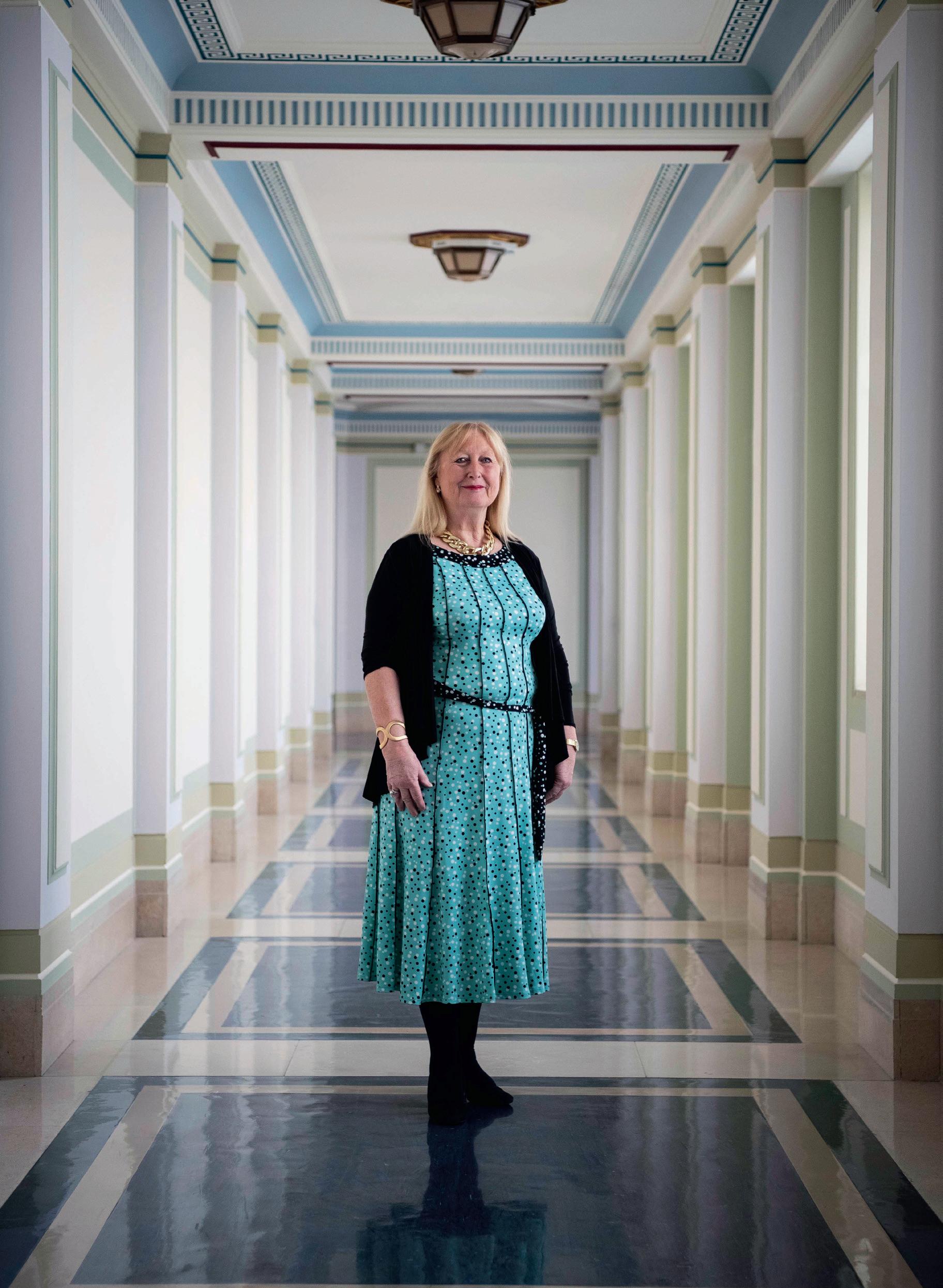
her mid-20s until the early 2000s. She enjoyed the work, finding it intellectually stimulating, but also relishing the fact it gave her parity with position and wage. That desire for independence also informed her decision to run for Grand Master of the HFAF.
‘I needed to work,’ she says. ‘I didn’t expect or want anybody to support me. I have always worked in a men’s environment and sometimes the differences in pay rankled. One way I got around that was by forming my own company so I could pay myself what I chose. I did that while remaining a woman – I am a woman, a mother, a wife, a grandmother and a great-grandmother.’
Carol’s mother died when she was young and she was raised largely by her paternal grandparents.
Her grandfather would remind her that she was as good as anybody else, no better but no worse, encouraging her to trust and believe in herself. Carol also abides by the Nolan Principles of public life – selflessness, integrity, objectivity, accountability, openness, honesty and leadership. ‘These all relate to Freemasonry and are values that every organisation should respect,’ says Carol. ‘It means there is always somebody looking over your shoulder.’
As Grand Master, Carol’s priority is to find a new headquarters. The Order’s old base in north London was sold in 2023, and it’s her disagreement with this decision that inspired her to run for Grand Master. Carol wants a permanent home that will allow members to hold meetings and social
Carol abides by the Nolan Principles of public life – selflessness, integrity, objectivity, accountability, openness, honesty and leadership
events whenever they desire. She has already considered a couple of buildings, and while she would like to lease or purchase a building within two years, she won’t be hurried into making a rash decision. ‘We are scattered in and around London – places such as Harrow, Southgate, Aldgate and Radlett,’ she says. ‘We are not cohesive. You cannot have a fraternity without a home. I believe we need one to be independent and I don’t want to rely on anybody other than ourselves.’
Carol put herself up for election, convinced she could make a difference. ‘I don’t think you should criticise unless you can offer an alternative,’ she says. ‘I put my name forward as I wanted to start a conversation, but did not in my wildest dreams think I would win. I like democracy and the idea that everybody should have a say as we all pay the same fees.’ She pauses, before adding with a grin, ‘During the English Civil War, I think I would have been on Oliver Cromwell’s side. I am a traditionalist, but I’m not a great fan of the status quo.’
This rebellious streak makes Carol a fine match for the HFAF, which was formed in 1913 so that women Freemasons could practice the Royal Arch. For decades, the HFAF remained outside the Masonic establishment. Although it is now aligned with UGLE, the HFAF remains a proudly independent organisation. That is why the lack of headquarters has been such a motivating cause. As both men’s and women’s Freemasonry tackle the membership gap, Carol believes a new base will help attract new members and allow the Order to have meetings at more convenient times. She likes the idea of increasing democratisation by allowing members a vote on which good causes to support.
Ultimately though, she wants to reframe the way Freemasonry is viewed. She feels that her own love of Freemasonry has a spiritual dimension. ‘I am contemplative and look inside myself – that is what Freemasonry does for me,’ she says. ‘We talk about the centre and “a point within a circle round which the Brethren cannot err”. I believe the centre is not physical; it’s the centre of you as a person. It is connected to your core beliefs and instincts as a person, and that encourages personal growth.’
This is something that Carol believes is relevant for contemporary society, where younger generations demonstrate a constant hunger for self-improvement. She feels Freemasonry allows these different generations – as well as people from different social and religious backgrounds – to mix,
‘Some of my best and most rewarding friendships came from my own encounters with older Freemasons who made me laugh and taught me a great deal’
helping to heal some of the fractures in the society. And women-only Freemasonry has an additional role to play, providing a forum for women to develop their confidence in a secure environment.
‘So many women in my own Lodge were so timid when they joined, but have since gained such confidence from being able to speak out openly in a way they might not have felt at work or home or in their chosen religion,’ she says. ‘Some of my best and most rewarding friendships came from my own encounters with older Freemasons who made me laugh and taught me a great deal. I respect them and gained more respect for myself by emulating them. These women have given so much to Freemasonry and I feel I am standing on their shoulders. What they achieved is remarkable and now I want to give something back.’
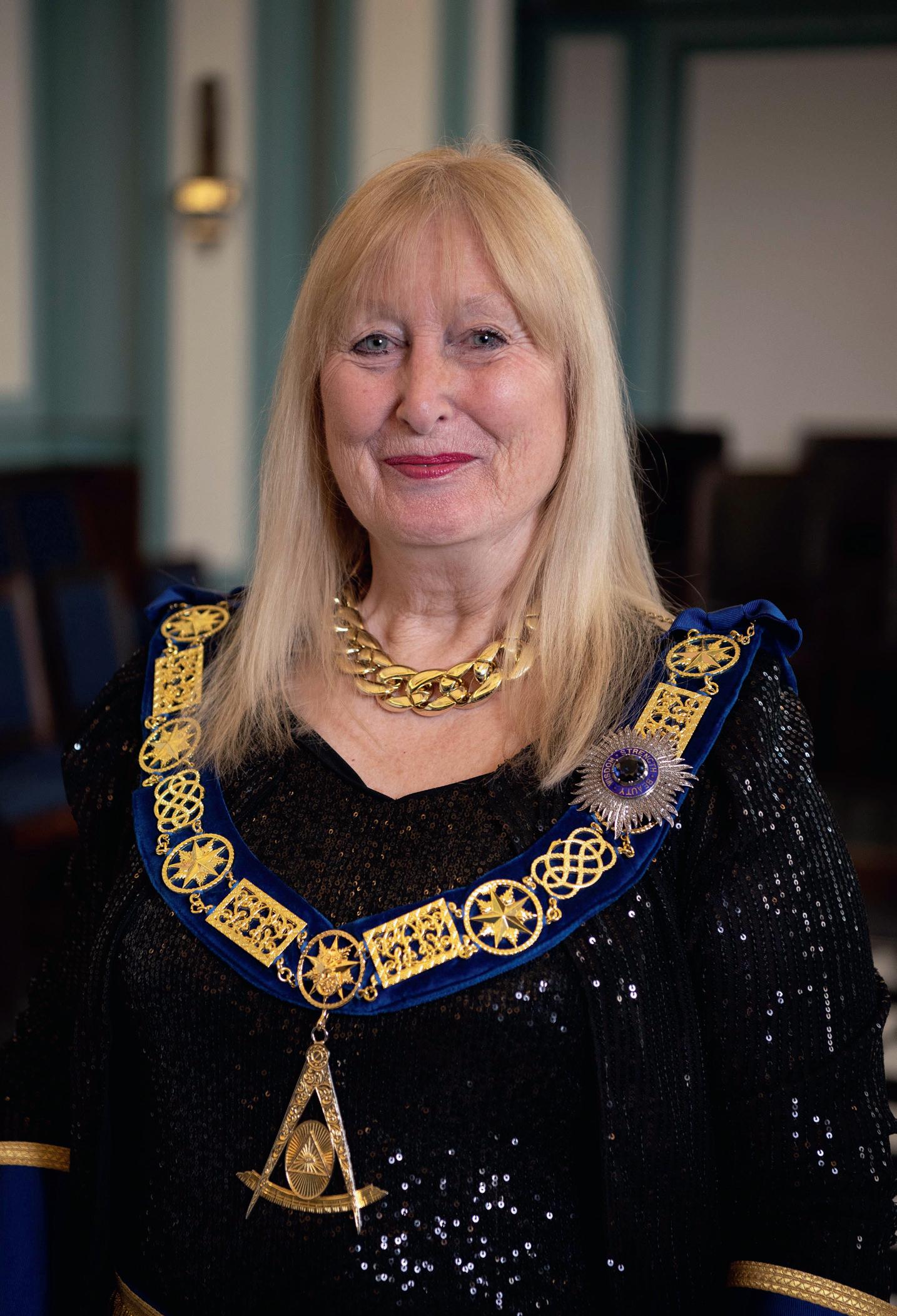
On an enchanting evening in October, the stage was set at Salford Masonic Hall for the rededication of Encore Lodge no. 7252. Members from across the Province gathered for a night that was destined to go down in Masonic history, fuelled by a passion for the performing arts.
Encore Lodge was founded with a vision of the performing arts as its guiding star. This was not to be a regular Lodge, but rather a Special Interest Lodge that would celebrate the theatrical, the extraordinary and the hilarious, conceived for those Freemasons who yearned to experience the timeless Masonic message in a fresh, edgy and often funny manner.
It all took root a few years back in Amsterdam when Michael Goodman, Matt Phillips and Phil Salter embarked on a journey of artistic revelation. As they wandered the streets, what was a spark of an idea transformed into blazing reality.
An accomplished orator, Matt can recite rituals in humorous voices, Michael has penned comedic and eloquent scripts and speeches for many years, and Phil, a musical virtuoso, completed this grand overture. Once their vision crystallised, the concept of a performing arts Special Interest Lodge became a masterpiece.
Ben Davies tells us more about the performing arts Lodge’s rededication and purpose

These visionary founders were resolute in their mission to safeguard the sacred principles of the Craft and to offer Freemasons of every degree the chance to enrich their Masonic knowledge, all while being entertained and enlightened on the subtleties of the ritual itself.
‘It was Matt Phillips who first suggested we form our own Lodge,’ says Lodge Master Michael Goodman. ‘He organised a coffee house meeting with Martin Roche and myself. It was his advice and enthusiasm that prompted us to that initial positive conversation in Amsterdam a week or so later.’
The curtains were raised on the splendid evening, with the Lodge’s Worshipful Master Michael Goodman conducting the opening ceremony. A knock on the door signalled the entrance of John Curry, the Provincial Grand Director of Ceremonies for the Province of East Lancashire. With an air of authority, he announced that Robert Frankl, the Provincial Grand Master, had graced us with his presence, demanding admission. The arrival of this esteemed dignitary was greeted with applause that could rival any standing ovation in the theatre. In an act of reverence, The Master of the Lodge offered the gavel to the Provincial Grand Master, who accepted with a gracious nod. As he introduced his delegation, he expressed his joy at finally being able to conduct the eagerly anticipated ceremony.
Chris Wildman, the Provincial Grand Secretary, addressed the Brethren and read out the sacred dispensation. Alan Potts, a Past Master of Arcturus Lodge no. 7252, regaled the gathering with a rich tapestry of Lodge history. Russell Conn, the Provincial Grand Chaplin, then took to the stage, his oration a symphony of emotions that resonated in every heart. The pièce de résistance saw the Provincial Grand Master conducting a rededication ceremony with unparalleled decorum and expertise. The stage was set, and the audience held its collective breath, captivated by the profound rituals.
But the evening was not just about solemnity – it was also a carnival of fellowship. The Lodge, true to its unique character, presented the Provincial Grand Master with a cheque for £500 that was destined for the East Lancashire 2026 Festival. The Provincial Grand Master took his final bow, and the Lodge was closed with the precision of a theatrical curtain call.
‘This was a Special Interest Lodge that would celebrate the theatrical, the extraordinary and the hilarious’
The night’s festivities continued with a convivial social board abuzz with the presence of countless Brethren. The customary toasts were delivered with passion and received a standing ovation. This extraordinary evening is etched in the memories of all who attended and foretells a bright future for Encore Lodge.
Since the rededication, Encore has very much been a work in progress, albeit slowly. ‘We say slowly because Matt is temporarily housebound and poorly,’ says Michael.
Mike is Master of two Lodges and his business takes him all over the country, while Phil is heavily committed to his role as head honcho of the North West’s UK hospital radio service. However, as Mike relinquishes his Chairs and Matt’s health improves, the way will be clearer for them to become more productive.
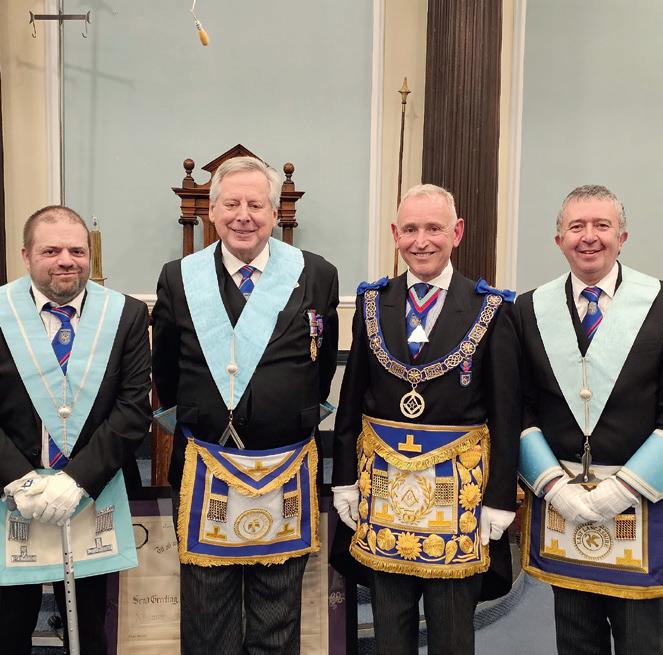
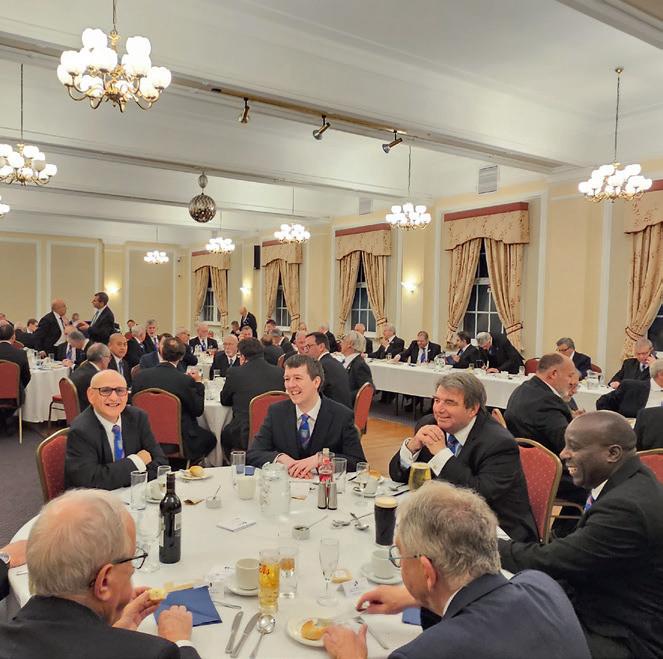
Having seen Encore successfully established, the members are working towards putting the original ideas into practice. ‘The Lodge will eventually form its own identity via, for example, costumes, tweaked ritual and extracurricular activities like theatre, am-dram and cinema evenings,’ says Michael. ‘It is hoped that our Festive Boards will be replete with visiting speakers, volunteer contributions and our own unique comedic touches. We shall, of course, endeavour to make a daily advancement in Masonic knowledge and the manner of that advancement will, over time, become part of Encore’s USP.’
Encore Lodge invites any interested and like-minded Freemasons to their ranks and is calling for Freemasons who are in the entertainment and media sector to get in touch. Michael says, ‘Watch this space. Our recruitment programme will evolve over the next 12 months. In the meantime, the Lodge Secretary Gordon Desser and Treasurer Alan Glazer continue to handle Encore’s day-to-day running.’
The stage is set, the players are ready, and the encore beckons!
To find out more about becoming a member of Encore Lodge, contact www.manchestermasons.com

A Special Interest Lodge, Encore Lodge no. 7252 was rededicated in October 2023 and looks forward to a bright future
Basil Clement has been blind since birth, but that has never impeded his enjoyment of Freemasonry. When he was Installed as Worshipful Master of Herefordshire’s Coningsby Lodge in December 2023, it was the second time Basil had been in the Chair. But this ceremony was even more unusual, as the Junior and Senior Wardens were also blind. It meant that Coningsby Lodge had three visually impaired members in major office at the same time – a testament to Freemasonry’s openness, adaptability and spirit of diversity. Given the Lodge’s experience in supporting visually impaired Freemasons, the ceremony went smoothly following minor alterations.
‘The biggest challenge was the Festive Board when I had to take wine with my Wardens and we had to make sure we were at least approximately looking at each other as we did so,’ says Basil.
Basil became a Freemason in 2012 having been fascinated by the Craft since his teens, when his grandmother warned him to never become a Freemason.
‘She really didn’t think it through because if you tell a 14-year-old boy that they shouldn’t do something, it’s all they will think about,’ he says. ‘I started to learn about Freemasonry and there were so many things that impressed me.’
When it came to his own Initiation ceremony, Basil was aided by the discovery in the Lodge of a braille copy of the ritual that dated back to World War II. He uses this in combination with text-reading software on his computer.
Over in Wiltshire, Richard Lamb has just begun his journey in Freemasonry as an initiate in Sarum Lodge. Richard, 63, was born with retinitis pigmentosa, a chronic hereditary eye disease. He lost his sight almost completely by the time he was 40. Richard was persuaded to become a Freemason by a close friend, who was able to advise the Lodge on how to make Richard feel comfortable. This meant someone providing an
Basil (Coningsby Lodge, this page) and Richard (Sarum Lodge) have found that Freemasonry is open, supportive and inclusive
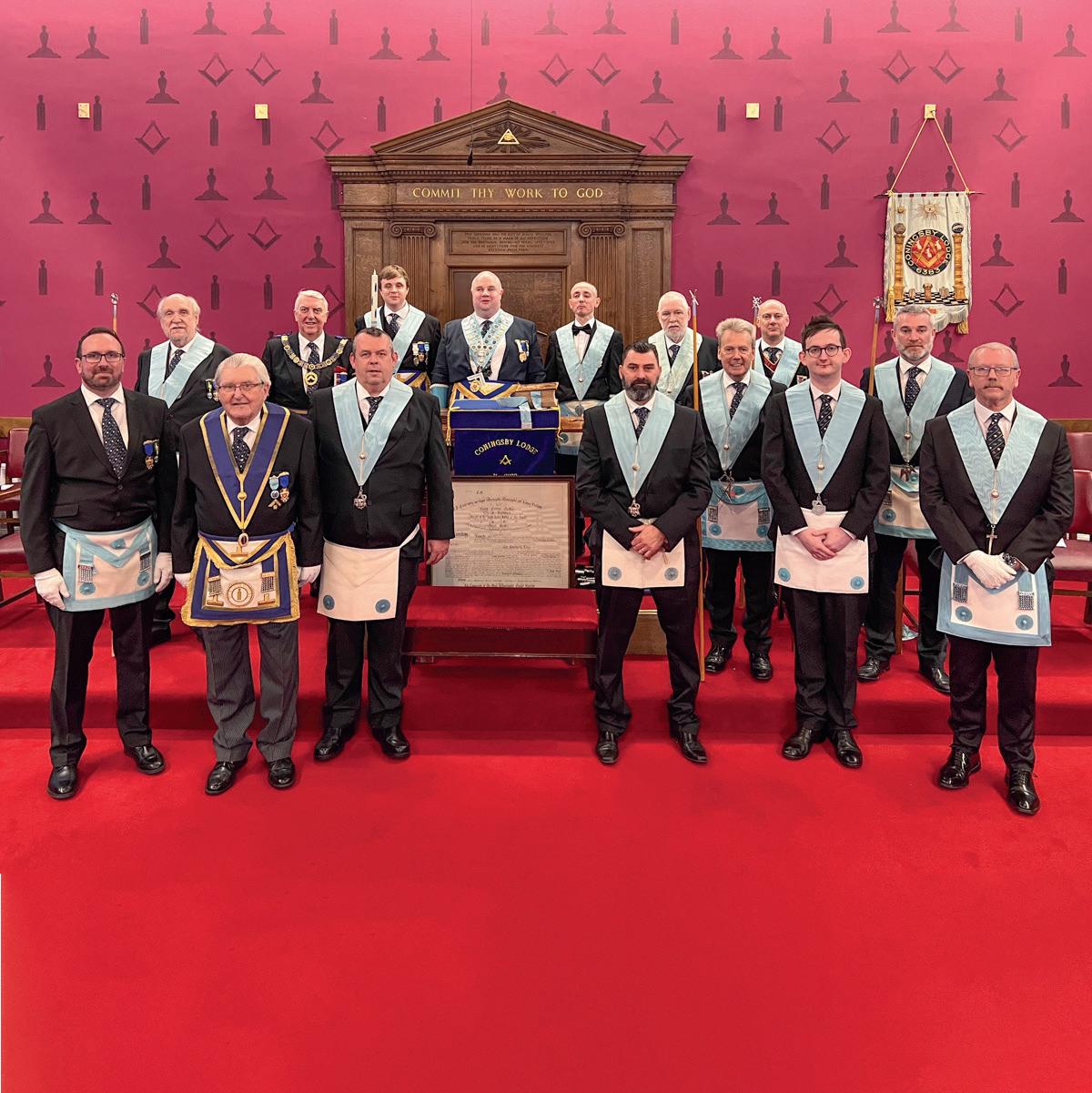
When two sight-impaired Freemasons were respectively Initiated in Wiltshire and Installed as Worshipful Master in Herefordshire, their fellow members were there to support them, reports Peter Watts

arm to help him get around, as well as some minor changes to the ceremony. The hoodwinking still took place because of the symbolic importance.
‘The Initiation was very interesting and the people who guided me were really helpful,’ he says. ‘My proposers both know me quite well and I was aware that a lot of effort had gone into the ceremony. They had a rehearsal the night before to make sure it would work and I was handed various objects as opposed to having them pointed out.’
Like many new Freemasons, Richard found the experience fascinating and was able to make even more of the ceremony when he attended an Initiation at another Lodge soon after his own.
Basil has introduced two visually impaired friends to Freemasonry – Andy Bailey and Jason Payne, who are now Senior and Junior Wardens of Coningsby Lodge. He thinks that Freemasonry is particularly well-equipped to support the needs of visually impaired Freemasons, and says it compares favourably with other experiences he has had as a blind person, where there can be a tendency towards being ‘patronised or ignored’.
He feels that this could be because Freemasonry tends to ‘attract like-minded people who are different enough to make things interesting’, but also because a fundamental tenet of Freemasonry is to treat everybody on their own merits.
A conversation that Basil had early in his Freemasonry career about three hypothetical Freemasons makes the point. He says, ‘One is a brilliant ritualist, socially awkward and financially hard-up; another is fantastic at socialising, not very
interested in ritual, but pays their dues; the third is incredibly generous, but doesn’t care for socialising or ritual. You have three completely different people who are all good Freemasons for different reasons. In Freemasonry, people are accepted for who they are and what they can contribute. So, as long as people contribute in the way they can, they are welcome.’
That same welcome was appreciated by Richard during his Initiation at Sarum Lodge. He says the effort they had gone to was ‘humbling’. ‘They wanted to make sure everything was right for me and that I felt welcome,’ says Richard. ‘If something had gone wrong, it really wouldn’t have mattered to me, but it clearly would have done to them. Now I have joined, I will go as often as possible. I’m also planning to go to other Lodges with a friend, as I’m interested in understanding more about Freemasonry.’
Having spent more than a decade as a Freemason, Basil’s only wish is for a wider acknowledgment of the challenges facing Freemasons with disabilities.
‘The automatic things that people think of when an organisation discusses diversity are ethnicity, age and sexual orientation,’ he says. ‘People should obviously consider those things, but they should also regard the needs of disabilities alongside them.’
‘In Freemasonry, people are accepted for who they are and what they can contribute. So, as long as people contribute in the way they can, they are welcome’

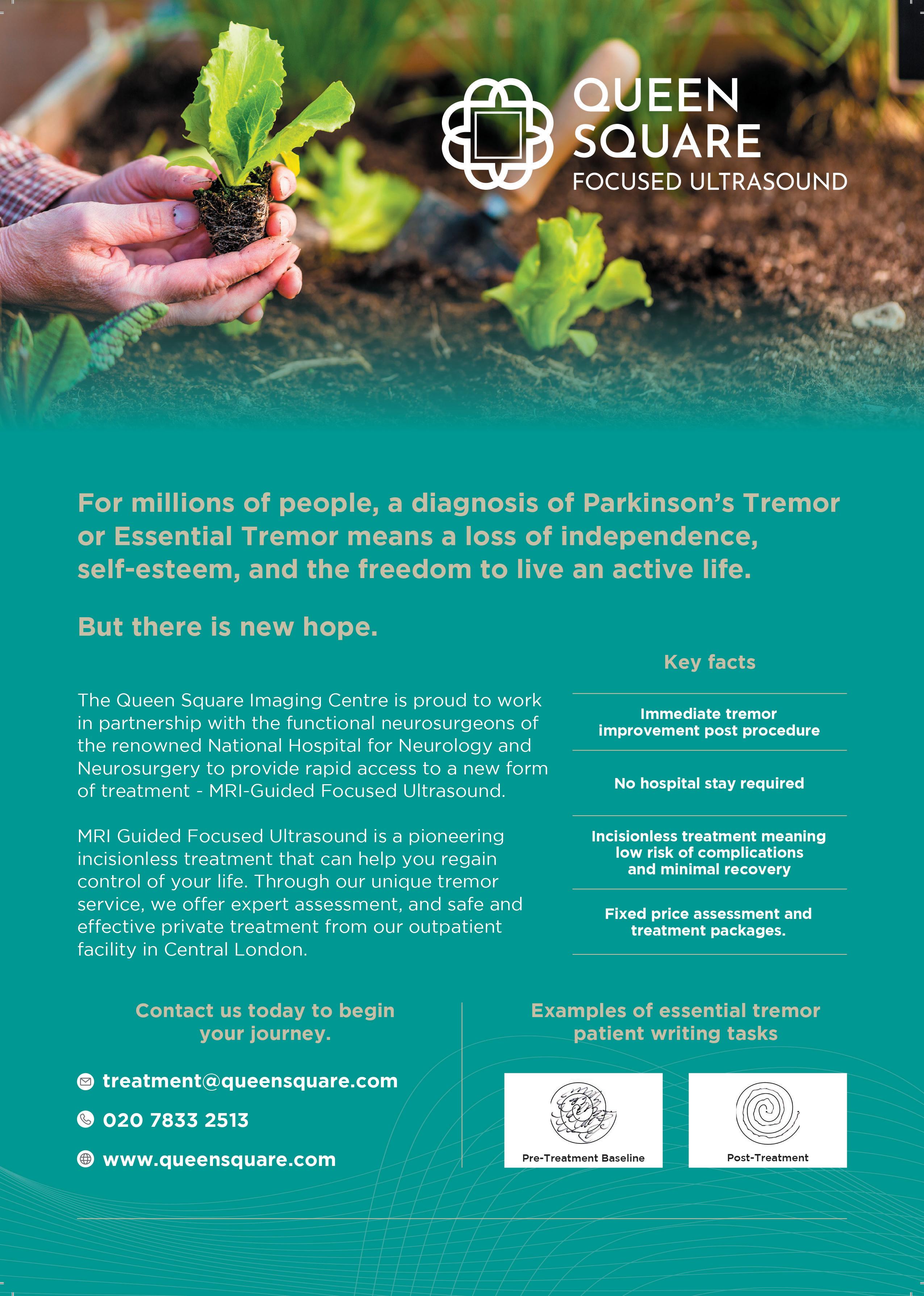
The Masonic podcast Craftcast was created by UGLE to explore Freemasonry’s modern narrative. Here, the content team enlightens us on its origins and progress
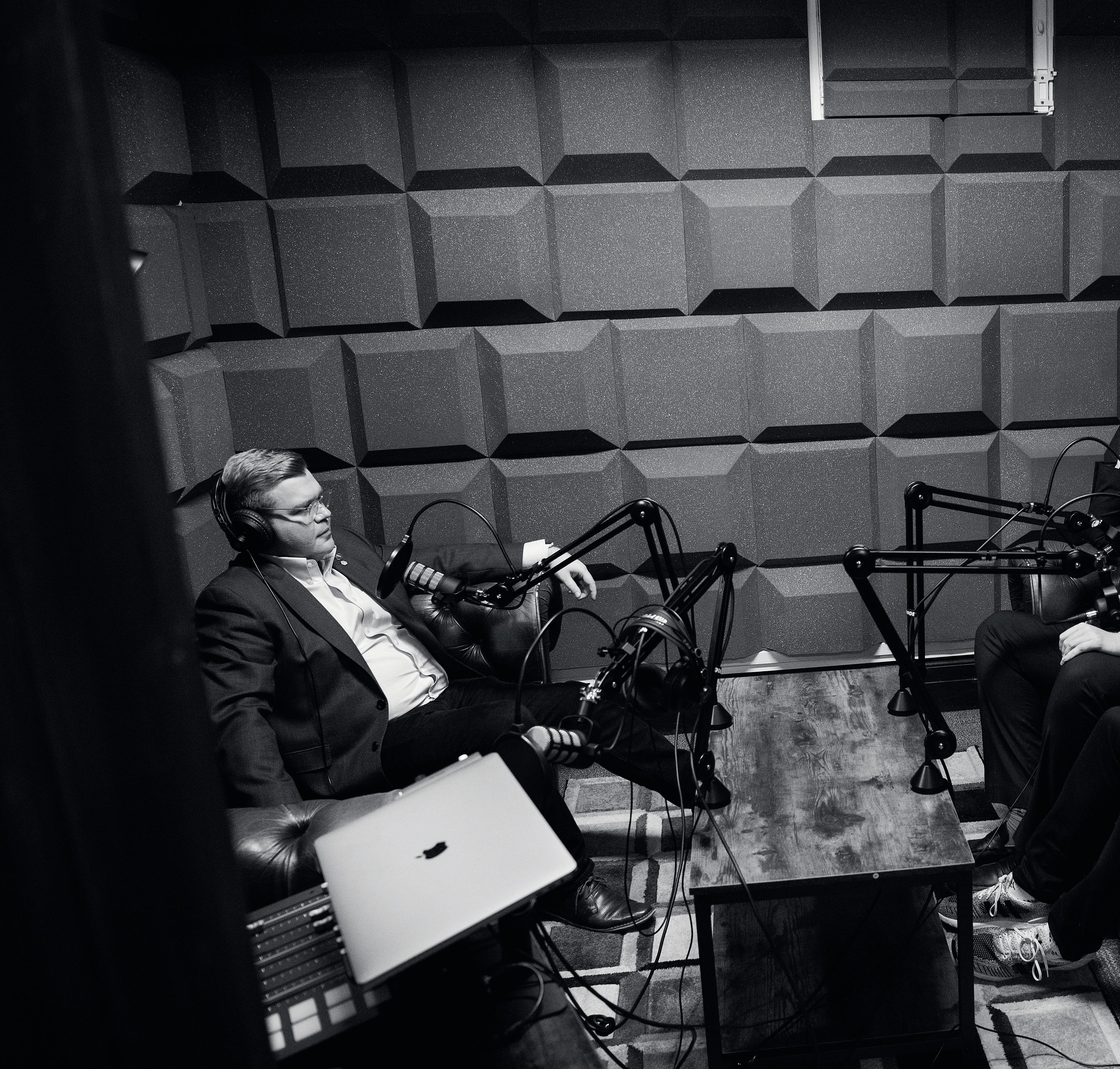
Craftcast provides a unique platform that attracts listeners around the world. Through engaging content that appeals to Freemasons and non-Freemasons alike, the team has expanded its audience with an approach that demystifies Freemasonry. The minds behind the mics reveal the origins of the podcast, its impact and the shared vision driving its success.
What inspired you to start Craftcast: The Freemasons Podcast ?
Shaun Butler Conversations around an official UGLE podcast started a few years ago, but we were unsure how it would work and what it might look like.
I was a keen listener of the excellent Brother podcast – presented by NeilThomas Allen, Taz Bhachoo, Jack Saunders and Joshua Worley – and we felt that we could do something slightly different to give listeners an insight into UGLE. We are always keen to find fresh ways to talk openly about Freemasonry to new audiences.
What’s your role in the team?
Marta Zandri As the producer of Craftcast, I play a part in bringing each episode to life. I assist with content planning and make sure we’re creating episodes that resonate with our Masonic audience while still being welcoming to everyone.
I coordinate the guests’ participation in our episodes. I then handle the technical side of things. I’m there before, during and after recording to ensure everything runs smoothly.
I also organise the promotion of each episode, working alongside Shay Aziz, our Communications Executive, who leads our social media efforts. In addition, I evaluate listener engagement and feedback, which helps us make informed decisions during the planning stage.
What do listeners gain from the podcast?
James Dalton I hope our listeners find Craftcast to be an engaging source of

entertainment and a valuable complement to their journey of Masonic understanding.
For Freemasons, I hope the podcast deepens their understanding and appreciation of the Craft. For those listeners who are not Freemasons, I aim to dispel misconceptions surrounding Freemasonry and showcase its positive contributions to individuals and society. Ultimately, I aspire for our audience to go away with a renewed sense of curiosity, enlightenment and appreciation for the principles and values of Freemasonry.
Any memorable moments?
Stephen Whatley I can share two. One of my most memorable experiences from
Craftcast was co-hosting the world exclusive joint interview between the two Grand Masters of Women’s Freemasonry.
The Special Interest Lodges have also been highly memorable because of their vibrant atmosphere and engaging content.
Combined, I believe the duality of these experiences encapsulates what is so special about Craftcast : the opportunity to laugh and joke, but equally to tackle questions at the core of Freemasonry, making history and enjoying the process.
What are some common misconceptions about Freemasonry that you aim to address through the podcast?
Shaun Butler I think the primary goal of the podcast is to raise awareness about Freemasonry and how it has such an important role to play in 2024, as well as being an information resource for existing members. There are so many fascinating facets to Freemasonry to explore and we are trying to tap into those in a new and engaging way.
What are the challenges of producing a podcast about Freemasonry?
Marta Zandri One of the main challenges is crafting each episode to be enjoyable and engaging for a diverse audience.
Craftcast was created with the aim of presenting Freemasonry in a fresh, light-hearted manner, making it accessible to those curious about what Freemasons do. Our goal is to create a podcast that appeals to both the internal Masonic community and the wider public, so it’s important to ensure that we don’t take any information for granted and provide context where needed.
Another fun challenge is keeping Shaun, James and Stephen on track during their intro and outro chit-chats. They always have interesting stories to share, but sometimes I need to gently steer them back to the main topic.
What has been your favourite topic so far and why?
Stephen Whatley The impact and importance of the Mental Health Episode (season 1, episode 11) will stay with me forever, partly because of the recording session itself and partly the incredible reaction. We entered the session knowing nothing of each other’s mental health background, but I believe this was
essential to achieve our goal: three men, sitting and having an honest conversation about mental health. It was us saying: ‘Here we are. This is us. We hope you as a listener will endeavour to ask: “how are you really?”’
I think we were all so moved by the response. One message I received in particular will always stick with me: ‘My Grand Superintendent asked me this evening how I was. Then he asked me again, but really. Thank you.’
What does a typical recording session look like?
Shaun Butler I always look forward to recording days – it is always great to see James and Stephen in person. Invariably, the first 20 minutes is spent catching up and having a laugh.
We try and record three or four episodes per session if possible and this will depend on the nature of the recordings.
I am hugely appreciative to both James and Stephen for their continued commitment and dedication to the podcast. They both travel a long way to take part and we are better for their involvement.
How do you approach researching topics before recording an episode?
Marta Zandri It is truly a team effort. In my case, being the only non-Freemason on the team lets me bring a fresh perspective to the table. Whether we’re brainstorming in person or chatting away on our busy WhatsApp group, we’re always thinking ahead and planning our next recordings.
What upcoming topics or guests are you excited to explore on the podcast?
Shaun Butler I am looking forward to discussing the Royal Arch – an absolutely integral part of Freemasonry. This will be a priority for season three. I am keen to explore the international elements of the English Constitution by speaking to more Districts, as well as exploring the various Companion Orders within Freemasonry.
To listen to Craftcast, scan the QR code or visit ugle.org.uk/ discover-freemasonry/ resources/podcasts
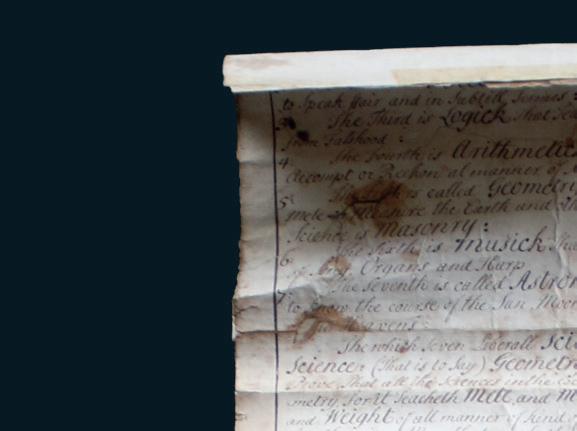
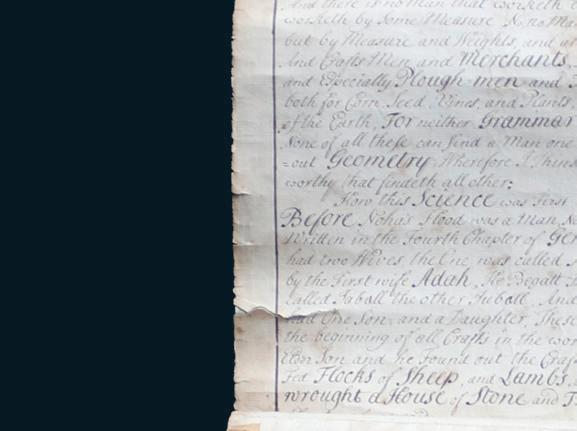

I1 2

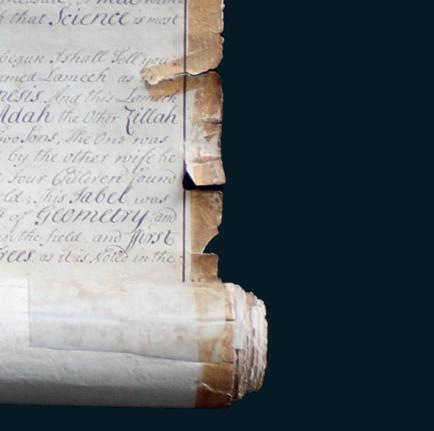
n the summer of 2023, a family with origins in the East Midlands donated an exciting document to the Museum. It is a previously unknown Old Charges manuscript, which has been named the Barret-Hallam MS.
Known collectively as Old Charges, there are about 130 known examples of these documents in Britain and overseas. The two oldest, the Regius Poem (c.1390) and the Cooke Ms (c.1425), are held by the British Library. The Museum of Freemasonry cares for 47 of the manuscripts, dating from 1583. All the Old Charges manuscripts are catalogued, with record entries available on the Museum’s online catalogue.
A standard format for Old Charges manuscripts emerged by the end of the 17th century, comprising a prayer, then a legendary history of the seven liberal arts with the historical legend of stonemasonry or operative Freemasonry, charges or rules for a Lodge of stonemasons and charges or rules for apprentices.
The format and wording within Old Charges documents differs slightly, and a complex hierarchy or taxonomy has been developed, based on families of
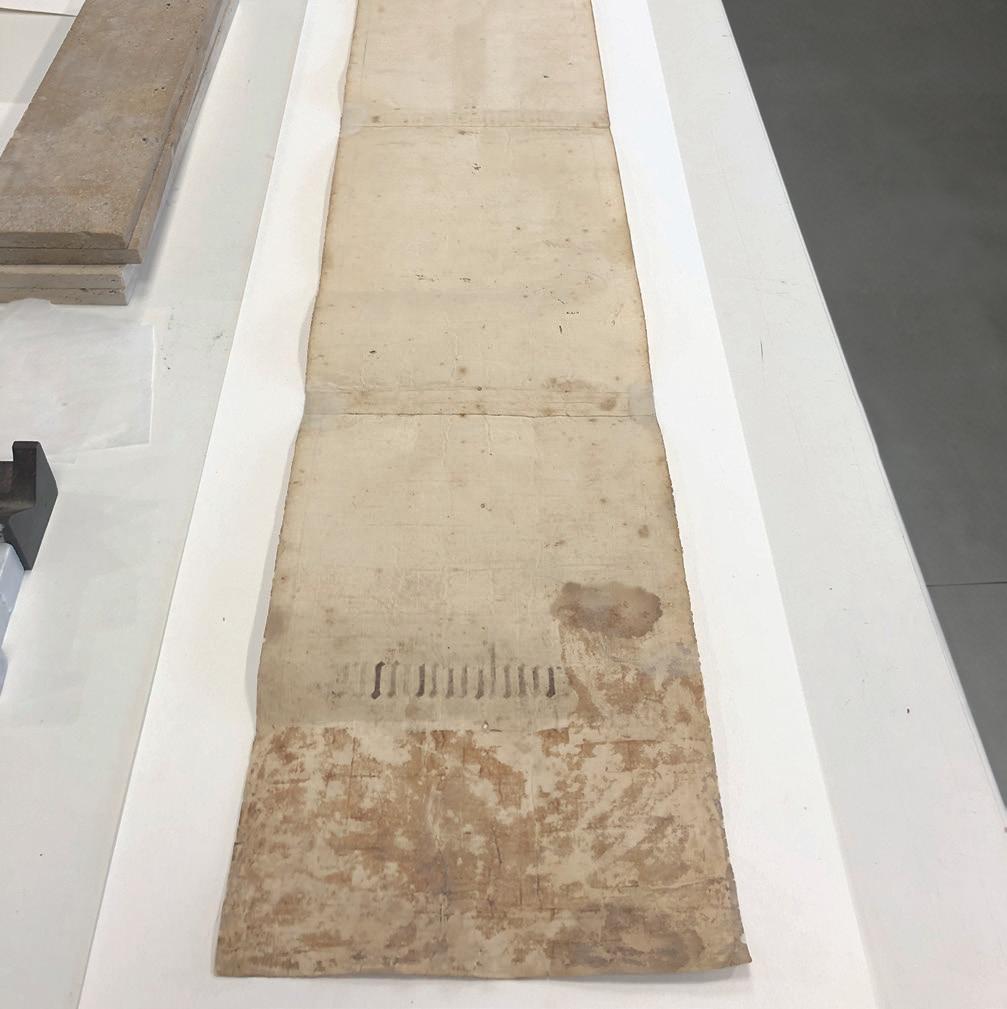
Archivist of the Museum of Freemasonry Susan Snell describes an exciting new discovery in the form of one of the Old Charges manuscripts
1. Barret-Hallam Manuscript before conservation 2. During conservation 3. After conservation 4. Fragment of a letter from Joseph Hallam from the top section of the Old Charges

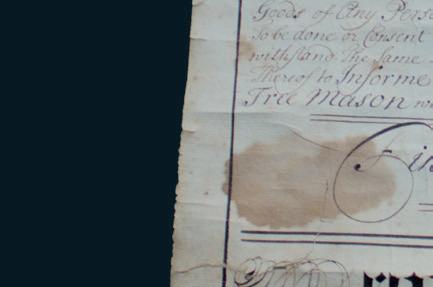
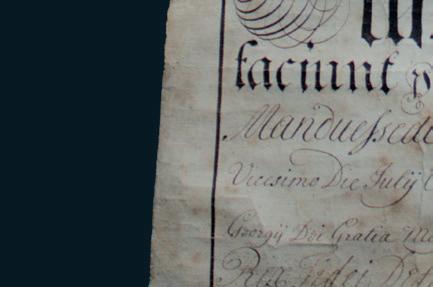

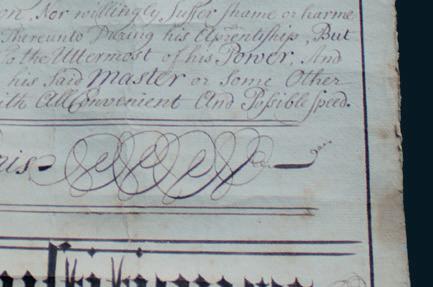




manuscripts with similar features. The new Old Charges falls into the Embleton Branch of the Sloane family, which means that its wording can be traced back to a manuscript written in 1646.
These documents are valuable resources for the early history of Freemasonry.
This particular Old Charges reflects the time period when a stonemason’s Lodge appears to have attracted members who were not always working with stone or involved in building construction.
The rules and regulations created by stonemasons in the Old Charges were adopted to shape the Charges that appear in The Constitutions of the Free-Masons by the Rev James Anderson in 1723.
The historical section of Anderson’s Constitutions also drew heavily on the Old Charges. Four Old Charges manuscripts are on display in the North and South Galleries of the Museum.
Unusually, this particular Old Charges includes the name of its scribe, Joseph Hallam of Mansfield, Nottinghamshire, who wrote the text for a William Barret. It also includes a date, 20 July 1718, revealing that it was written at the same time as Freemasonry was emerging as an
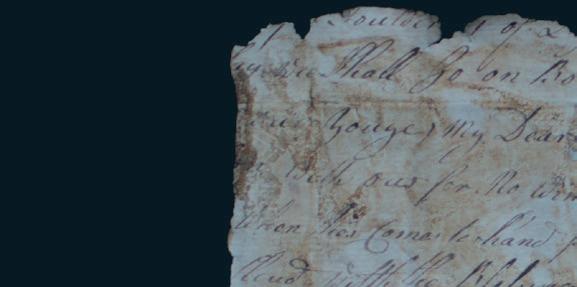
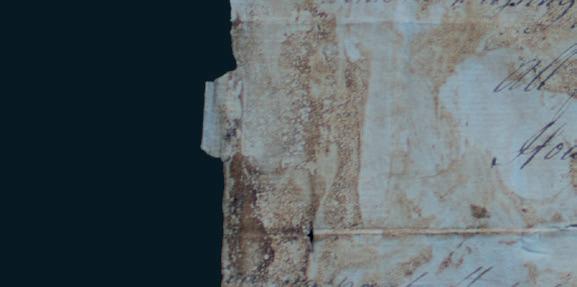

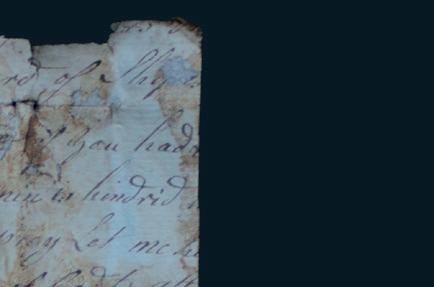

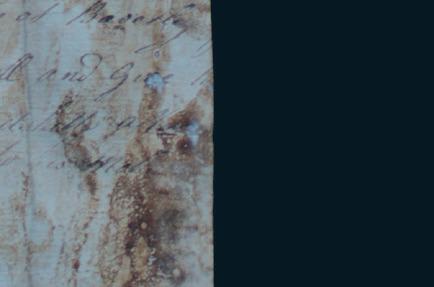

organisation at the beginning of the 18th century. Research in Nottinghamshire archives by Mark Dorrington, former university archivist, has unmasked Joseph Hallam as the parish clerk of Mansfield, explaining his fi ne penmanship.
The identity of William Barret is less certain, as several individuals with this name lived in the locality at this time. There is no contemporary stonemason with this name identified in the area, but other individuals with this name were crafts or tradesmen.
On arrival, the top section of this Old Charges was much thicker, comprising several layers of glued papers, and was detached from the main document, a narrow scroll almost 12ft long. The reverse of the manuscript was repaired in places using stiff map and other papers, which caused additional cracks and damage. On the left and right sides of the document, inappropriate repairs had been made using adhesive tape, which has now been removed after drying out, but this has left brown stains.
A successful grant application to the National Manuscripts Conservation Trust funded the conservation of the
Old Charges, which is now repaired and accessible by researchers by appointment in the Museum’s Library [Reference: GBR 1991 OC 1/48]. One of the paper layers removed from the top section turned out to be a fragment of a personal letter from Joseph Hallam to his wife.
Work undertaken on the document by the conservator, Graeme Gardiner, also revealed that the text is written on paper with the Pro Patria, Maid of Dort, Dutch watermark. Andrew Prescott, former Head of the Centre for Masonic Research, Sheffield, now Professor of Digital Humanities, University of Glasgow, is compiling research on this unique document. His forthcoming article aims to reveal more about the document and its significance at a time of transition from operative Masonry to the provincial development of modern Freemasonry.
View the Barret-Hallam MS on the Museum’s online catalogue. Follow the link or visit https:// museumfreemasonry.org.uk/ catalogue

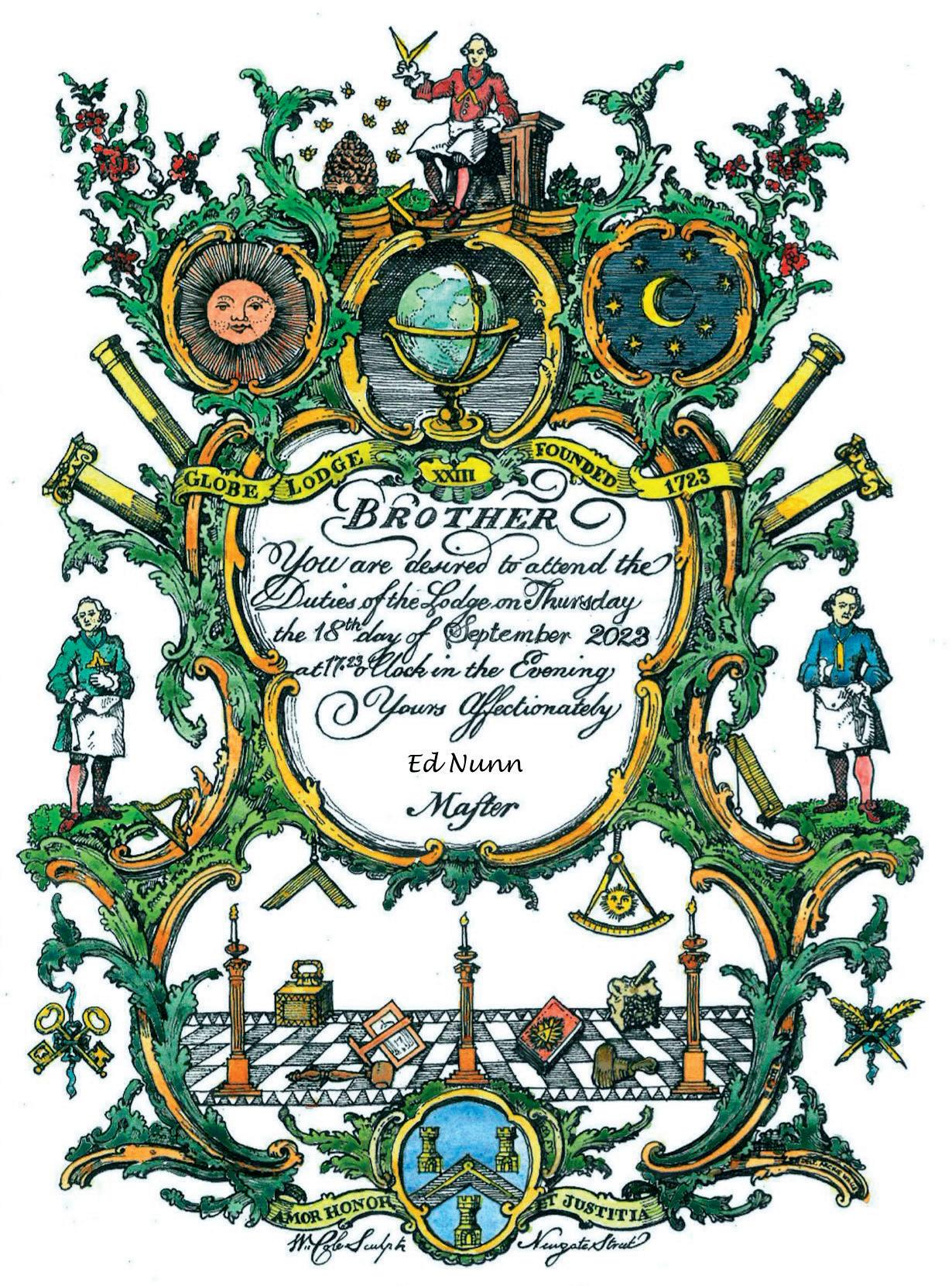
Globe Lodge has been presented with a Warrant to mark its 300-year anniversary. Richard Gan tells its unique story
‘There must be a beginning of any great matter, but the continuing unto the end until it be thoroughly finished yields the true glory.’ Attributed to Sir Francis Drake, this quotation neatly sums up the antiquity and success of Globe Lodge no. 23. The Lodge was Constituted on 18 September 1723, just six years after the formation of the first Grand Lodge in London, and has recently celebrated its 300th anniversary. One of 19 ‘Red Apron’ Lodges, Globe has the privilege of annually nominating a member for the office of Grand Steward and has done so without interruption for the past 250 years.
During its lifetime, Globe Lodge has had a little over 1,200 members, many
of whom have played an active and influential role – not just within the Lodge, but in Freemasonry in general and in the world outside of Freemasonry.
The 300th anniversary has been celebrated by the Lodge with a number of events, including two celebratory meetings. An informal meeting took place on the anniversary of the Constitution and a second, more formal occasion saw Pro Grand Master Jonathan Spence presenting the members of the Lodge with a Tercentenary Warrant. In doing so, the Pro Grand Master could not help but suggest that the Lodge take better care of this particular Warrant, given that it has previously lost three, recording
A coloured copy of the Globe Summons originally engraved by William Cole in 1793. Redrawn by Archie Wall in 2003
respectively its Constitution, Centenary, and Bicentenary – not to mention three sets of minute books.
The Lodge is known for its family connections, including 12 generations of one family, the first initiated in 1851 and the most recent in 2019. Globe members have, between them, represented 326 different occupations, including 14 Members of Parliament and a number of more unusual jobs, such as ‘cricket bat manufacturer’.
The current Lodge summons was first engraved in 1793 by William Cole. The first use of the valediction Yours Affectionately, can be traced to 1728 and is still used by members when communicating with each other, although younger members now tend to abbreviate the phrase to YA, especially in emails.
Members of Globe were involved in the formation of the United Grand Lodge of England in 1813, with three of them Signatories to Articles of Union. 190 years later, two members in particular were instrumental in the formation of Metropolitan Grand Lodge in 2003.
Charity has always been a central tenet, and it is interesting to note that the very first extant minutes of the Lodge, which date back to April 1793, record the fact that two donations were made at that meeting – a guinea to the Girls’ School (£141 in today’s money) and five shillings to a Lodge member in need (£33). Indeed, as an integral part of the celebrations, members donated £50,000 to Globe’s ‘2023 Tercentenary Charitable Fund’.
Given its longevity, it is not surprising that a history of the Lodge has been published to coincide with its Tercentenary, written in a way that is intended to inform, educate and entertain.
The Tercentenary Memorials 1723-2023: 300 Years of Freemasonry; Through the Prism of the History of Globe Lodge is written by Richard L Gan and Archie Walls and published by Lewis Masonic.
To buy this fascinating book from the shop at Freemasons’ Hall, follow this link to the shop’s website
Hoyle Court is one of the largest Masonic Halls in the Province of Yorkshire, West Riding, and the only one to retain its formal gardens and terrace. A fascinating building both architecturally and historically, it is a Queen Anne-style house built by Sam Ambler between 1910 and 1912 for his wife, Emily Beatrice. Sam Ambler was a descendent of Jeremiah Ambler, who established the Bradford company Jeremiah Ambler & Sons Limited in 1789, at a time when Bradford was becoming one of the powerhouses of the textile industry. The company produced quality mohair from the Angora goat.
Architecturally, Hoyle Court is a grand and imposing building, constructed of snecked dressed rubble with ashlar dressings, hammer dressed stone to the rear and a stone slate roof, in the Edwardian Baroque style. To the south front is a symmetrical facade, U-shaped with projecting wings. The ground-floor windows have architrave, keystone, projecting sill and apron. There are shaped gabled dormers with keyed oculus and
carved bracket. The rear has a main feature porch with elaborate doorcase featuring triple keystone, Ionic pilasters with raised blocks, architrave, pulvinated frieze, cornice and open triangular pediment, and a parapet surmounted by a carved urn.
The interior opens into a stair hall, where the fine closed-string, open-well staircase boasts a wreathed and ramped handrail, fluted newels with Corinthian capitals and alternate fluted and twist balusters – two to each riser, with brackets. Opposite doorways have flanking Doric pilasters, doorcases with architrave and a console keystone. In what is now the bar area is a richly decorated fireplace with a carved Bacchanalian scene of cherubs and a donkey, the sides of which are decorated with carved devils’ heads and fruit and foliage, modillioned cornice, marbled surround with original iron grate – the apron fretted with a Greek key ornament and carved overmantel with a copy of the original painting.
The copy painting is of interest as the original was left by Emily before she
emigrated to the United States. This picture was sold by the Freemasons and the sale funded a two-storey extension in 1957, which is now the largest Temple and main dining room. A copy of the painting remains in place.
In the beginning, there was an aviary with tropical birds and a monkey house. Sam also bought a foul-mouthed green parrot from a sailor. The bird lived in the kitchen, but one day the cook was so disgusted with its language that she put it in the corridor. Unfortunately, it caught a cold and died.
Ruth, the daughter of Sam Ambler, married Emerson Lyman Fisher-Smith in 1923. This was the first-ever wedding to take place at Hoyle Court, which is now a licenced wedding venue. The wedding income is the mainstay of funds to the Baildon Masonic Hall Company to aid the upkeep of the building, which would not be possible purely from rents charged to Lodges and side degrees.
The Great Depression also affected the Ambler Company and, like many other people, the Amblers started to lose their
Originally home to wealthy Bradford mill owners the Ambler family, Baildon Masonic Hall is a Grade II-Listed Edwardian masterpiece. Chairman of Baildon Masonic Hall Company Tim Brooksbank explains its rich heritage
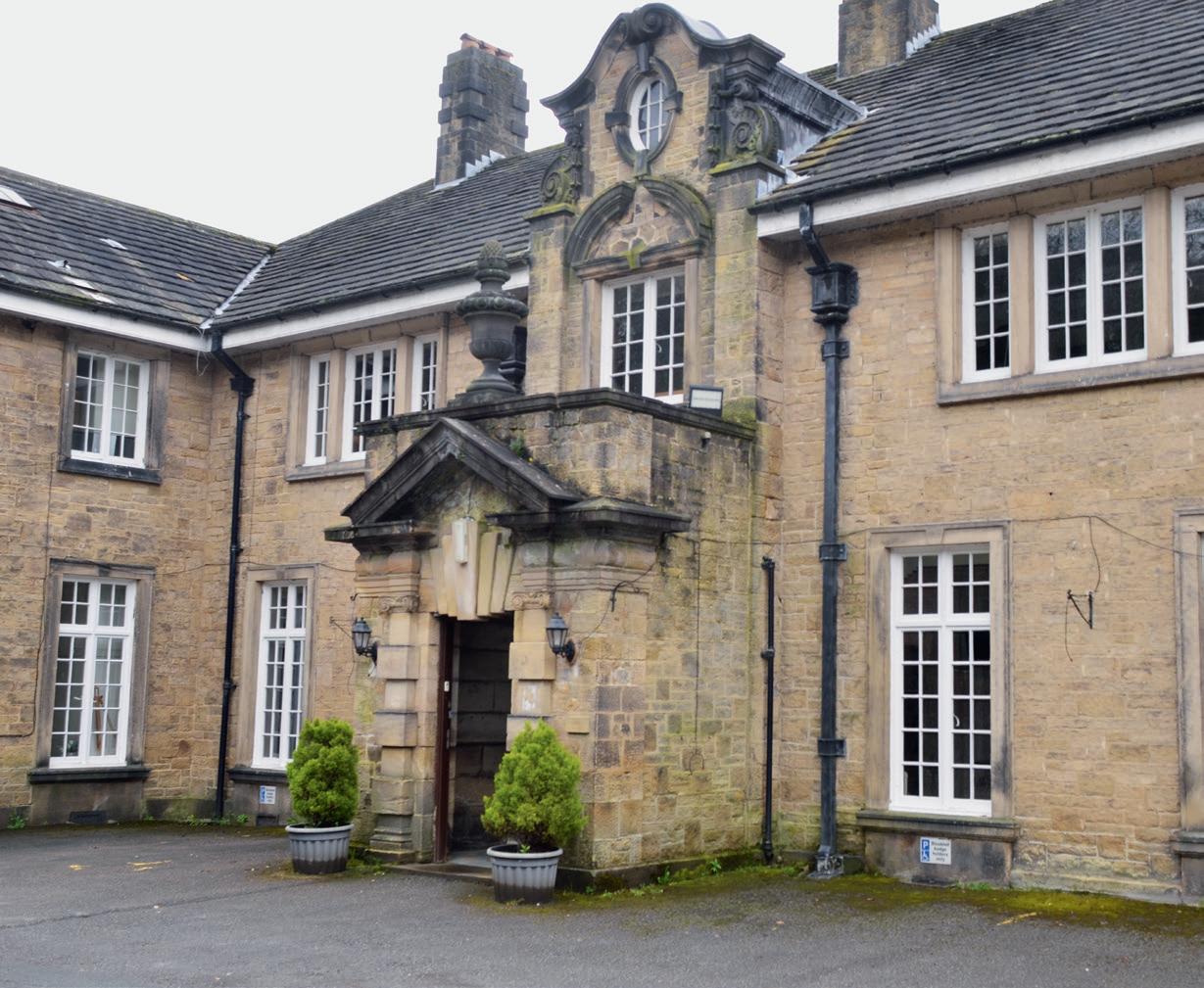
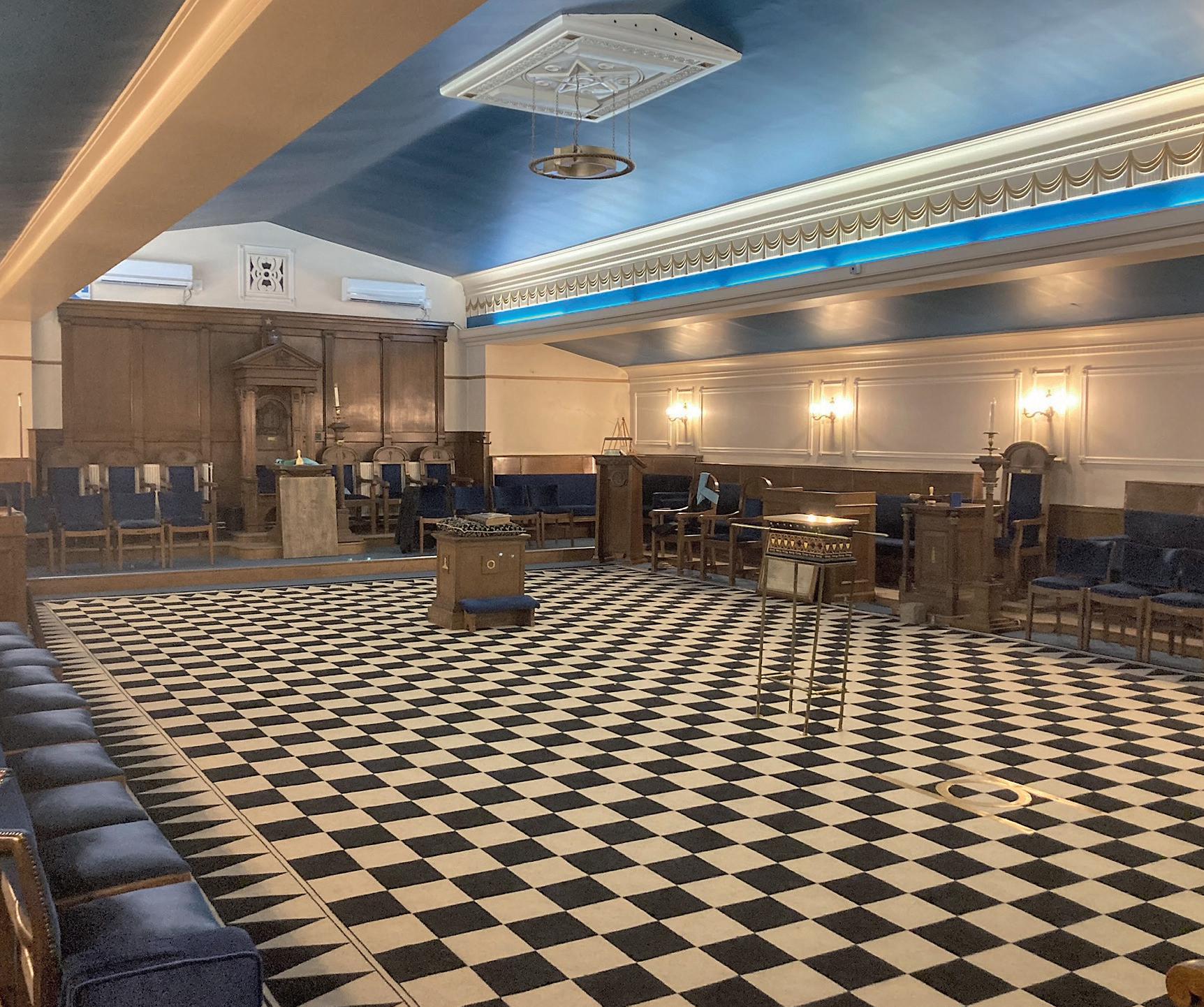
‘I take great pride in our outstanding Masonic Hall, which I hope will remain a Masonic meeting centre for years to come’
fortune. However, Hoyle Court estate was still a thriving environment, employing staff both for the house and gardens. There was a cook, scullery maid, three housemaids and a nurse for the grandchildren. This was considered a skeleton staff compared to the number of servants before the crash of 1929. Staff quarters were in the loft and still exist. There is a game preparation room in the cellar that is now used for storage.
Sam Ambler died in 1948. In 1949, Emily was still living at Hoyle Court with her brother-in-law and two aged servants. Finally, Emily decided to move back to the United States to be near the rest of her family who had emigrated in 1937, and Hoyle Court was bought by Freemasons in 1953 for £7,500. Most of the farmland was compulsory purchased by Shipley
Urban District Council in 1960 and was developed for housing.
The original Temple is on the ground floor and is called the Egyptian Room. It is a delightful space that bears pictures that were in the Masonic room above the Baildon Picture House. These paintings were transferred to Hoyle Court in 1953. Unfortunately, some were lost in transit and others became water damaged and too mouldy to conserve. These have been recreated by Derek Radcliffe of Lodge of Felicity no. 6001, with each being placed in the room according to the attributes of the ancient god represented.
Built in 1957, the main Temple was designed to hold up to 180 Freemasons, although we don’t believe it has ever had a ceremony with more than 170. It is a grand but understated design.
Hoyle Court remains a thriving Masonic centre and is one of the three largest in the Province of Yorkshire, West Riding. The building is one of the jewels in the crown of the Province. It hosts 12 Craft Lodges, five Royal Arch Chapters, one Knights Templar Preceptory and a Rose Croix Chapter, as well as the Hoyle Court Ladies’ Luncheon Club. Sadly, as yet, there are no women’s Lodges meetings at Hoyle Court. It also hosts many non-Masonic events, such as weddings and corporate events that help moderate the cost of maintaining the premises. Looking after a Grade II-listed Masonic Hall is not for the faint-hearted.
As Chairman of Baildon Masonic Hall Company, I take great pride in our outstanding Masonic Hall, which I hope will remain a Masonic meeting centre for years to come. I give credit for sources of the material in this piece to the late Harry Riding and John Pitcher of Baildon Lodge no. 1545, the late Richard Bolton of Corinthian Lodge no. 3600 and, more recently, Chris Binns of Lodge of Amity no. 4148.
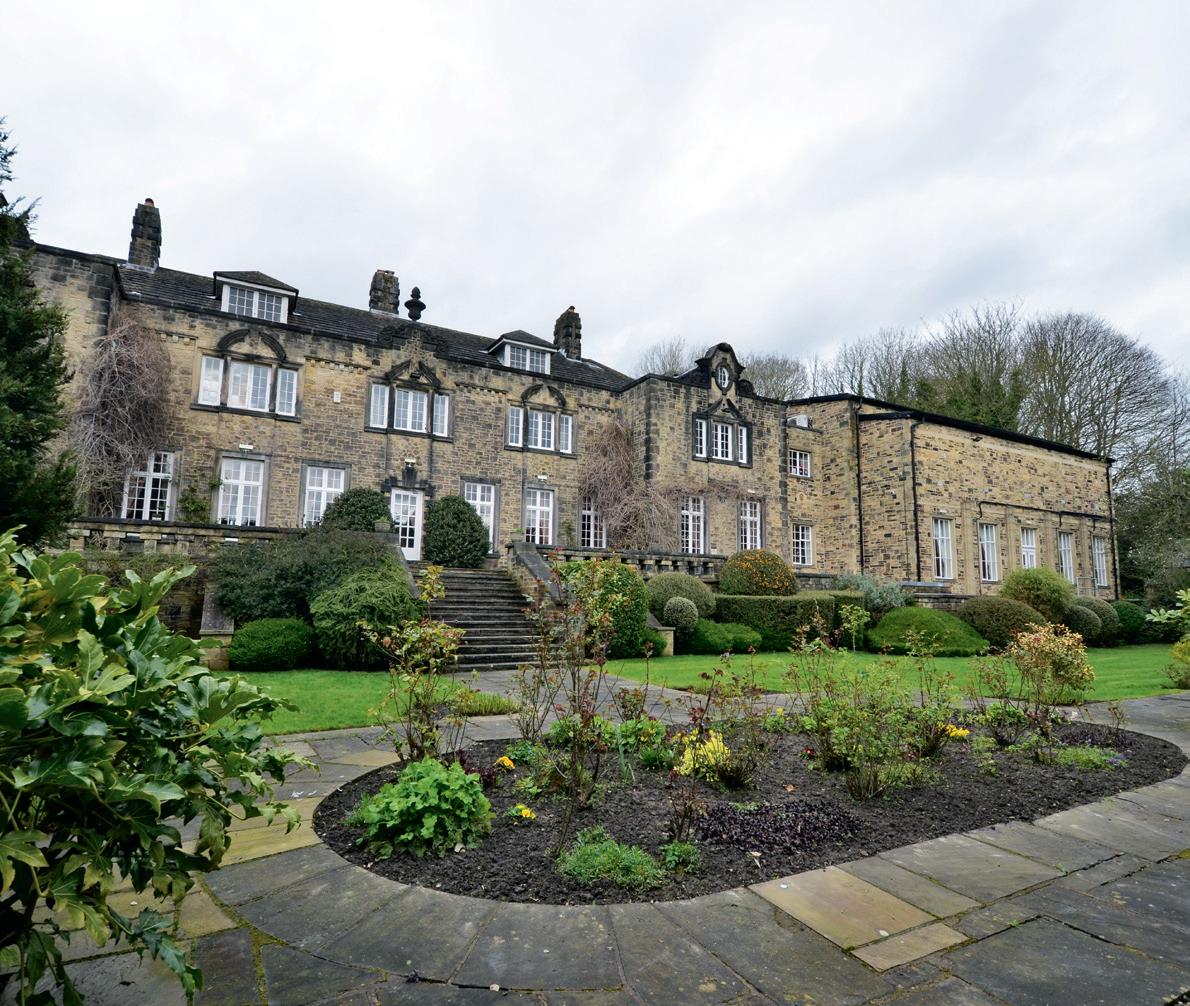
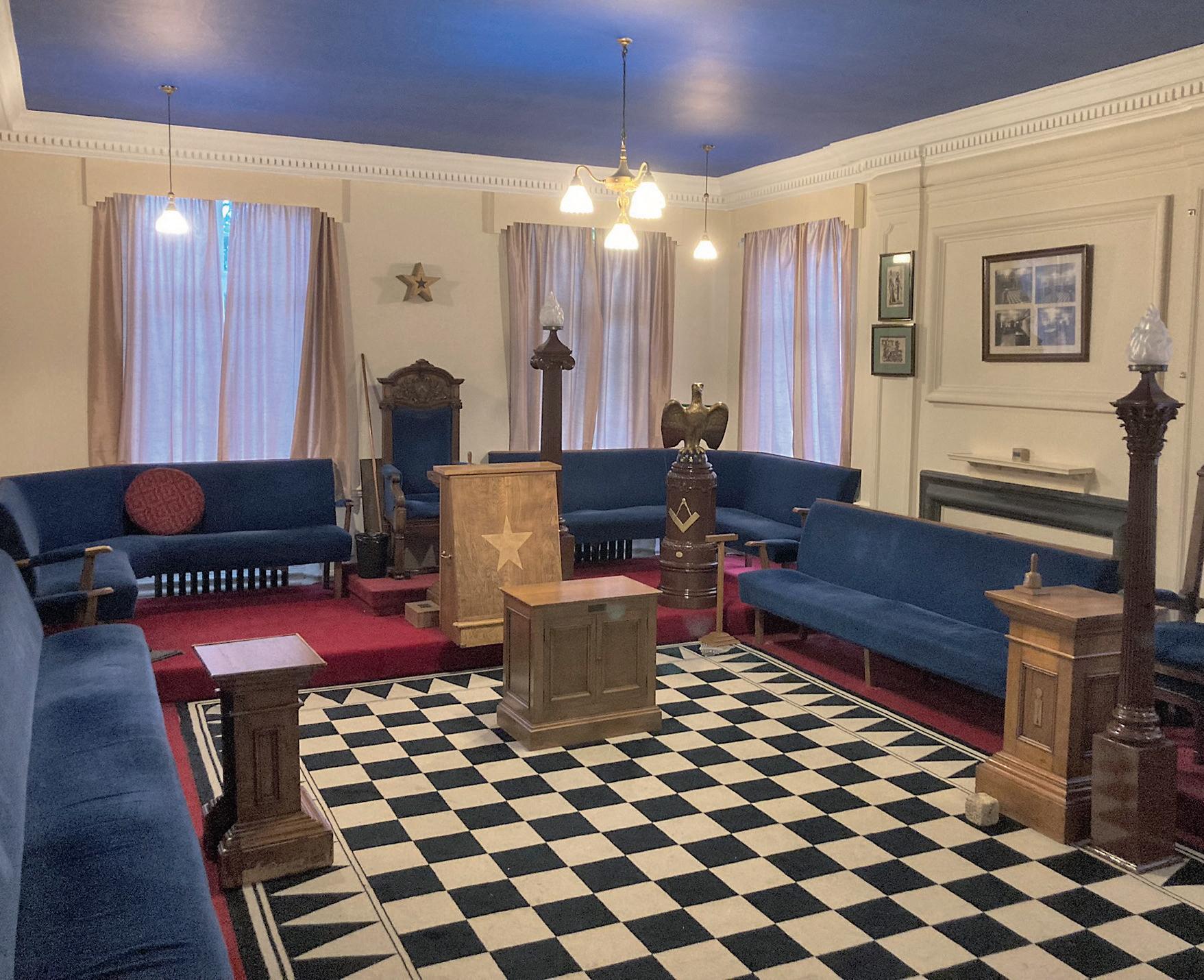
Although it took more than a century to establish English Freemasonry in Thailand, both Lodge and Chapter are now thriving, says Past Second Grand Principal George Francis
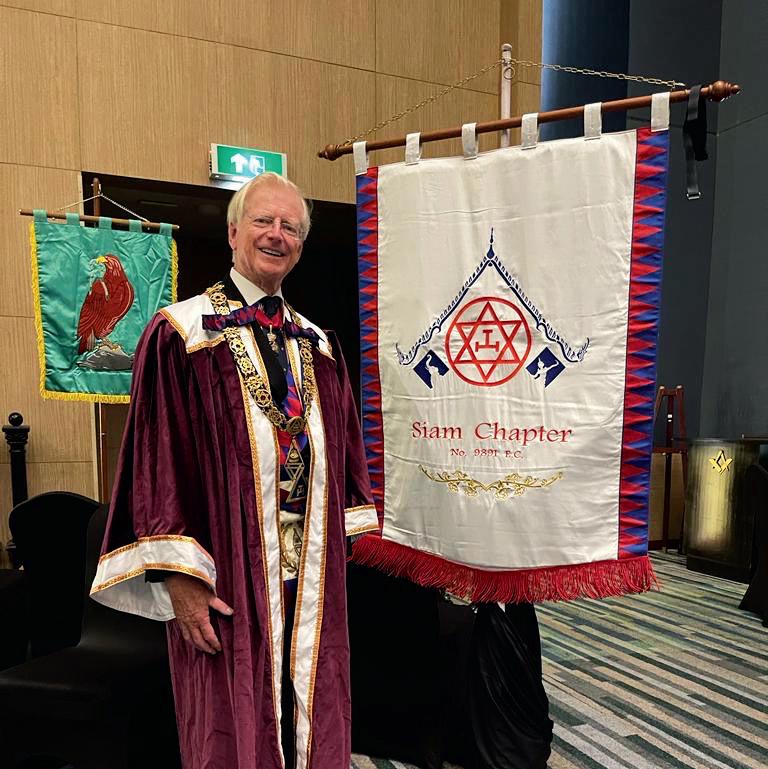
The story of English Freemasonry in Thailand is only 23 years old, but its origins go back much further. In 1899, for example, Sir Edward Letchworth, Grand Secretary of UGLE, wrote, ‘I am diverted by those whose duty it is to advise The MW The Grand Master in such matters, to state that, in view of the great distance of Bangkok from England, and the complication which might arise in attempting to establish an English Lodge in a foreign state, The MW The Grand Master could not be recommended to grant a warrant’. Instead, it was the Grand Lodge of Scotland that consecrated the first Lodge in Thailand in 1911, Lodge St John, followed by the Irish Constitution.
Fast forward to 2001, and having been patient for more than 100 years, the first English Lodge was established in Thailand in the District of Eastern Archipelago, which now covers Malaysia, Singapore and Thailand. The Lodge was named Chula Lodge no. 9745 in honour of HM King Chulalongkorn, who reigned over Thailand (then Siam) as monarch from 1868 to 1910. He represented the best traditions of both East and West and, incidentally, prevented Thailand from becoming part of the British or French Empires (although the two southern-most
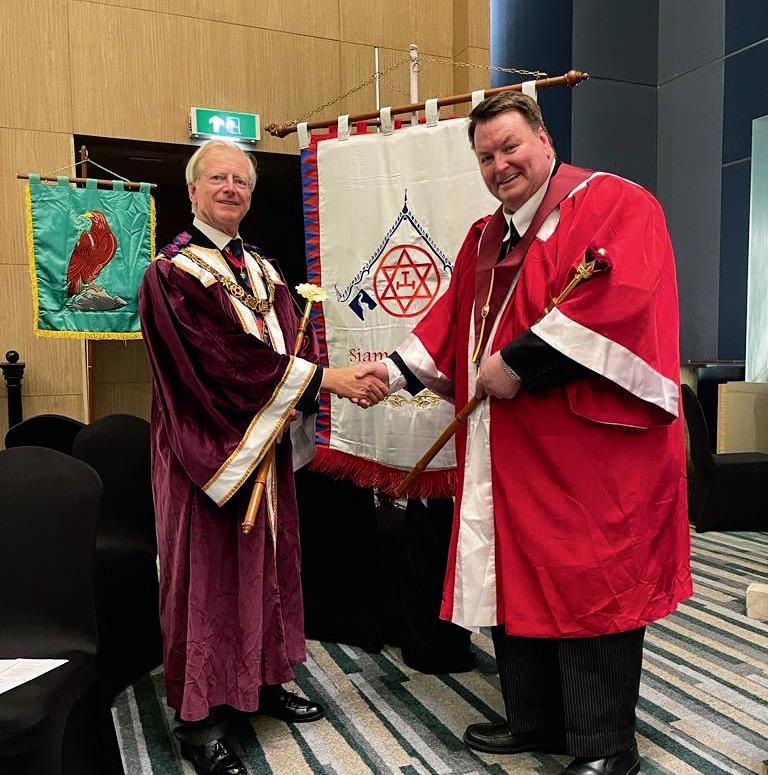
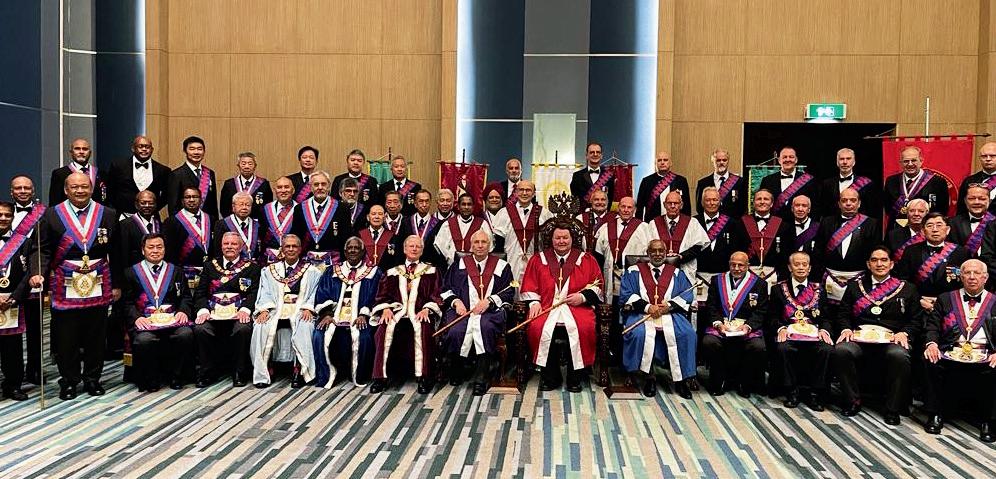
states of Kedah and Kelantan were transferred to Malaya in 1909).
Soon, Chula Lodge was followed by Light of Siam Lodge no. 9791 in Phuket in 2004, and by Trident Lodge no. 9891 in Pattaya in 2013, to ratify the demands of local Brethren in three different parts of the country. During these years, those wishing to practise Royal Arch Masonry had the choice of local Scottish or Irish Chapters, or to travel to Malaysia or Singapore for District Chapters.
So was born the idea, following the formation of Trident Lodge, of having an English Royal Arch Chapter in Thailand to cater for all three Lodges. COVID-19 interrupted this process, but the project finally came to fruition in Pattaya on 14 October 2023, with the Consecration of Siam Chapter no. 9891.
The meeting, at the Holiday Inn Pattaya, was honoured by the presence of the three Consecration Rulers, George Francis, Past Second Grand Principal, Jeyaraj Ratnaswamy, District Grand Master of the Eastern Archipelago, and Ferhad Nilgiria, District Grand Master of the District Grand Lodge of Sri Lanka. Raji Ramason, Past Assistant Grand Director of Ceremonies, acted as Consecrating and Installing Director of Ceremonies with great skill.
Nearly 60 Companions were present and the ceremony was exceptionally well supervised. Neale Avery, Assistant District Grand Master, was Installed as first Most Excellent Zerubbabel, Teong Tan as H, and Dennis Chia as J.
All the furnishings of the Chapter, such as vault, robes and banners, were presented by various Companions, and so the Siam Chapter got off to a great start, with several candidates for Exaltation in waiting. Scottish and Irish representatives were present, which emphasises the continuous goodwill between the three home Constitutions, with many Companions belonging to two or more different ones.
So, Thailand joins the ranks of countries from outside the Commonwealth to have a Royal Arch Chapter, the others being Argentina, Chile, Brazil, Uruguay, together with Japan, Portugal, Greece, US Virgin Islands and Curacao, most of which have one Chapter.


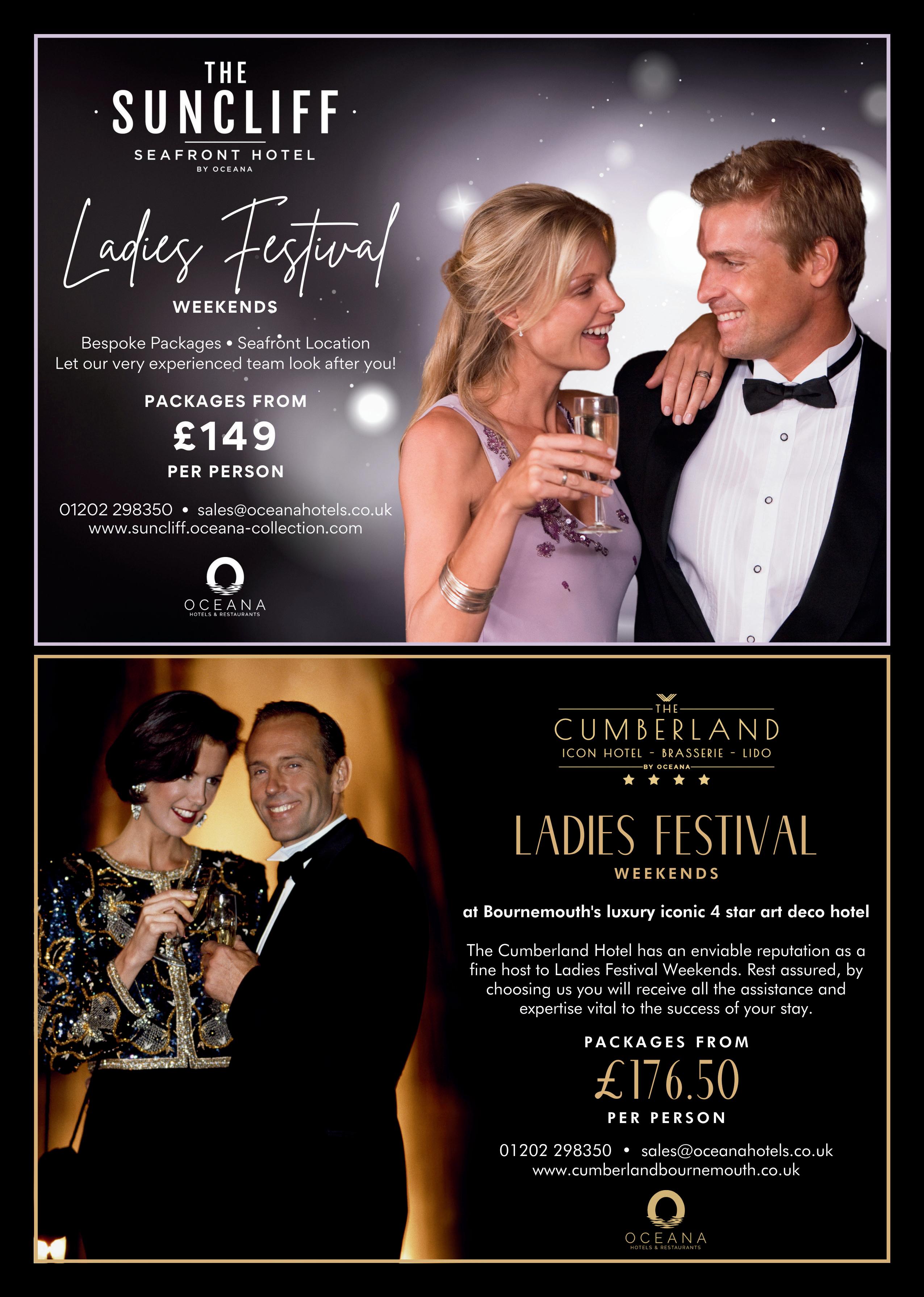


In his Quarterly Communication address in March, Pro Grand Master Jonathan Spence charts the progress of the ‘Strategy for Freemasonry, 2022 and Beyond’
Brethren, it is very good to see so many of you here this morning and I do hope you will enjoy your visit to the Quarterly Communication of Grand Lodge, whether it is your first or the latest in many such visits. It is important for the future of Freemasonry under this Grand Lodge that all our members feel able to engage with Grand Lodge when they have the opportunity.
It is 15 months since we launched the ‘Strategy for Freemasonry, 2022 and Beyond’ and I thought it would be helpful to give an update on our progress. It is worth remembering that this is a strategy for the next seven years and so is more akin to a longer-distance race than a sprint. We must expect it to take time before the full effects of the Strategy’s implementation are seen, and indeed felt, across the organisation as a whole.
I am pleased to say it is encouraging to see an increasing number of Provinces where there is
growth in the number of members, and there are many more where good progress is being made in addressing their Membership Challenge. We should remember that the Membership Challenge cannot be addressed successfully if we concentrate solely on bringing in new members while failing to look after properly those we already have. So far, those Provinces that pay close attention to both aspects are seeing the strongest improvement in their memberships. This is but the first year, and for the Strategy to be successful, we must not just see improvements in one year, but in a succession of years. In other words, we are seeking sustainable progress to secure the future of Freemasonry under this Grand Lodge.
To make this relevant to our members in their individual Lodges and Chapters, a number of Provincial Rulers have asked that individual Lodges and Chapters in the Province have a larger number of members at the end of the year than at the beginning. This is usually expressed in terms of one or two more members, and we should all understand that this will come from a combination of reduced resignations as well as more initiations. The key is increased engagement with all of our members, which will ultimately come from the enjoyment we derive from our Lodge meetings, the quality of our ceremonies and differences we make in our communities. I hope all of you here today will take this message back to your own Lodges and Chapters.
Grand Lodge, and Grand Chapter, too, are playing their part in moving the Strategy forward. As you well know, Brethren, I have emphasised that Grand Lodge and Grand Chapter must not only say what they will do but clearly be seen to do it, and to do it well.
Today marks the first Quarterly Communication where Master Masons are both encouraged to attend the meeting and may also attend the lunch afterwards in their own right, without the need to find a host among Grand Officers. As a result, we have a record number lunching in the Grand Connaught Rooms after this meeting. I intend that this will be the approach for the March Quarterly Communication in the coming
‘With your continued enthusiasm and engagement, Brethren, I am enthusiastic about our future’
years. I am pleased that you, the members, have responded so positively to this development.
This initiative builds on the success of holding a Quarterly Communication away from London in September 2023. We will be holding further Communications away from London in future years. Regrettably, it is not something that is feasible to do every year, but we will do it again, Brethren, of that you can be sure.
In my travels around the country, I am often asked when will we give greater practical effect to the idea of the Royal Arch and Craft working seamlessly together under the description of One Journey, One Organisation. Many of our members have asked me: ‘When will we get on with it?’ And, even more tellingly: ‘Where is the urgency?’ These are not unreasonable questions, I am sure you will all agree.
The answers commence today. We are proposing to move forward now and take some tangible steps to making One Journey, One Organisation a clear reality for all our members. The Notices of Motion from both The President of the Board of General Purposes for a future meeting of Grand Lodge, and the President of the Committee of General Purposes for the meeting of Grand Chapter in April, on a single fee for becoming a member of this Grand Lodge demonstrate this unambiguously. This is but the start of the steps needed to harmonise effectively the workings of Grand Lodge and Grand Chapter. There is more work being undertaken behind the scenes by the respective Boards, Presidents, the Grand Secretary and others, to deliver this promptly over the next two years, thereby strengthening English Freemasonry.
Finally, Brethren, I am pleased to confirm that the promised film on handling multiple-candidate ceremonies has been released. I encourage you all to view it. More importantly, I hope many of you will realise it is something that your own Lodges could use easily, without any adverse impact on the experience of the candidates or the existing members.
Brethren, if you had not already realised, I am greatly encouraged by your response so far to the ‘Strategy for Freemasonry, 2022 and Beyond’. With your continued enthusiasm and engagement, Brethren, I am enthusiastic about our future and I have no doubt you will ensure we will succeed and remain a thriving organisation.
Thank you, Brethren.
Presented with the Grand Master’s Order of Service to Masonry and a beautiful sketch that preserved the special moment for posterity, Keith Gilbert takes us through his incredible 52-year journey as a Freemason
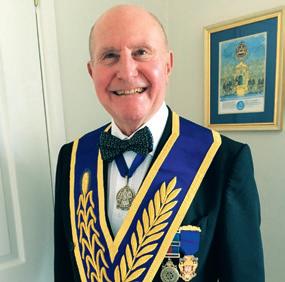
I was Initiated into my father’s Lodge, Radius no. 5474, in Freemasons’ Hall, London in November 1972, and Raised in March 1973. At the time, travel to London was not easy as I was living and working in the Midlands. Once a member, it was always an intention to join Athelstan Lodge no. 1333 in Atherstone, Warwickshire, a vibrant Lodge with a large membership, as it has today. It was close to where I lived and within walking distance.
I was a teacher at the time of my Initiation. Three years later, I became the Deputy Head of a school in Crosby, West Lancashire, and joined the local Skelmersdale Lodge no. 1380, becoming its Master in 1984. Moving to headship in Hertfordshire, I joined Harpenden Lodge no. 4314 in 1986, becoming Secretary in 1991 and Master in 2001.
In 2004, I became Provincial Secretary for Hertfordshire, and in 2011 Assistant Provincial Grand Master. Each step along the Masonic path has resulted in new learning curves, new experiences, and hugely rewarding occasions. I joined Globe Lodge no. 23 in 2007, becoming the Worshipful Master and the Lodge’s Grand Steward in 2014. I was Secretary to the Board of Grand Stewards, and was asked, in 2015, to become the coordinator of the UGLE Tercentenary preparations and celebrations held worldwide in 2017, for which I was awarded the Order of Service to Masonry in December 2017.
Any Masonic reward is hugely important, be it Provincial or Grand Lodge honours. I appreciate that there is a large number of Freemasons who do not necessarily obtain the recognition they deserve, perhaps because others are recognised in front of them, or because
the number of honours is being reduced where memberships are falling, hence fewer are available.
Certain Grand Ranks, as all will know, bring extra responsibilities connected to specific roles, whether in Grand Lodge or the Metropolitan or Provincial Grand Lodges. To be appointed or promoted is a great honour, and to receive the Grand Master’s Order of Service to Masonry has to be one of the highest accolades any Freemason can experience, as it is not linked to a specific role but is offered following a judgement by senior members of the Craft in recognition of an individual’s workload and responsibilities outside the normal course of events. To wear a jewel that can only be offered to a maximum of 12 Brethren at any one time, and which is probably only enjoyed by perhaps six or seven at one time, is an incredible honour.
The profile of the Order of Service to Masonry has been raised in the past couple of years, because when I received mine, few people appeared to know what it was or why it was presented. The Deputy Grand Secretary’s presentation in a Quarterly Communication of UGLE, articles in FMT both about individual recipients and the honour in particular, have raised awareness.
Not having a specific salutation keeps the independence of the Order of Service to Masonry, but also perhaps its hidden honour. At meetings, Brethren often ask to hold the jewel, expressing pleasure at being so near to the honour itself and the rarity of presentations. I deem myself incredibly lucky to have been offered the chance to volunteer for such a marvellous experience as the Tercentenary and to rub shoulders with the Rulers and players of such a wonderful institution as UGLE, and of course the many Grand Masters from
around the world who came to London to celebrate this anniversary with us.
If I were to share my views with young members, or those considering joining Freemasonry, I would advise them to never be too ambitious, to take each step as it comes, embrace each challenge offered by a new office, and never prescribe to the views of those who want rank and recognition outside their comfort zone and capabilities.
Every time I moved around the country as a teacher, Deputy Head and Head, ending my career working as one of Her Majesty’s Inspectors of Schools, Freemasonry gave me and my family friendships, assistance and guidance –especially when challenged by needing medical advice, help with tradespeople, social activities and emotional support.
Now as a Scribe E and Secretary of a prestigious Lodge, I find Freemasonry offers so many excellent occasions for improving one’s lifetime and morale. If you are offered a task or role, regardless as how it might be perceived by others, and you find you enjoy what it gives to you, grasp it with enthusiasm, and if something is offered as a result, have that inner warmth of celebration.
I volunteer one day each week in the Café and Bar at Freemasons’ Hall, clearing tables, washing up, welcoming, chatting and joking to Freemasons and nonFreemasons and their partners. Perhaps it does not appear to be the most rewarding of roles in some eyes, but it is. If you fancy volunteering to assist in the Café and Bar, ask for a leaflet from those working there.
This artwork was presented to Keith Gilbert by Archie Walls, PJGD, senior member of Globe Lodge no. 23. Read more about Globe Lodge on page 53





What are the immoveable jewels?
The introduction of the SolomonGPT Project gives UGLE’s knowledge base a boost from artificial intelligence, opening up a wealth of possibilities. Dr Craig Johnson explains more

What are the moveable jewels? Can a Lodge meet on a Sunday?
During the past 12 months, artificial intelligence (AI) has frequently featured in the news. The concept of AI dates back to the 1950s, but began capturing widespread attention with the introduction of ChatGPT in 2022.
The term artificial intelligence encompasses a variety of methodologies. ChatGPT employs a technique known as Generative AI, or GenAI. The initialism GPT refers to generative pre-trained transformer. This technology facilitates the creation of new content by amalgamating existing data sources, such as text and images. The applications of this technology are vast and have unleashed a plethora of possibilities.
Since its launch in 2018, Solomon has continuously augmented its repository of fi les. We are in a privileged position, having amassed nearly 500 items of meticulously curated content that could be utilised to refi ne ChatGPT technology.


This led to the SolomonGPT Project, designed to enable users to query a knowledge base akin to that of Solomon. Although still in its nascent stages, it has shown considerable promise.
SolomonGPT is accessible through various modules. The First Degree version comprises content from Welcome Apprentice, the First Degree, Lodge Matters and Masonic History. Each subsequent degree, such as the Second, Third and Royal Arch, features content exclusive to that particular degree, thereby ensuring that members do not explore topics beyond their current level of progression.
Interactions with SolomonGPT could start with a simple question, such as what are the moveable jewels or can a Lodge meet on a Sunday? The interface includes pre-loaded questions for ease of use.
Engaging with GenAI, a process now known as prompt engineering, requires
a particular skillset. The most effective communication with GenAI mimics human interaction, where detailed context leads to more accurate responses. While the technology is not infallible, it is evolving and improving.
All interactions with the chatbot are documented and retained for one month, although user identities remain anonymous. This process aids in accumulating data on the types of queries posed, allowing for the expansion of the knowledge base when new questions arise. This sense and respond approach is pivotal in enhancing its robustness.
SolomonGPT includes a video on optimising its use. It should be viewed as one component of a broader virtual learning environment. Users typically navigate the system through browsing Solomon’s own search engine to locate documents. Alternatively, the Tags feature facilitates exploration of documents with themes such as King Solomon, Lodge officers, symbolism and working tools.
The new AI system is particularly beneficial for candidates who have recently undergone Initiation, Passing, Raising or Exaltation ceremonies. It can address queries regarding the symbolism and meanings of ceremonial artifacts, and assist in adapting to their new identity and the ethos of Freemasonry. Additionally, the chatbot serves as a resource for mentors, who can leverage it for instructional purposes, such as providing detailed explanations on Masonic symbolism.
As with any advance in technology, a degree of scepticism is advisable. The consensus is that AI should augment, not replace, human intelligence.
Freemasonry, inherently a progressive science as espoused in the second degree and historically aligned with esteemed institutions such as the Royal Society, now stands at the forefront of AI innovation, further deepening our members’ comprehension of our ceremonial practices.
To learn more about Solomon’s resources, as well as how SolomonGPT can help you, follow this link
How the members of two Lodges implemented the Retrieve and Engage modules of the Members’ Pathway to strengthen bonds and grow their membership
The University Lodge of Chester no. 4477 takes a distinctive soft landing process for student members. Unlike many Lodges that seek long-term commitment, the University Lodge embraces a mission to instill Freemasonry in its members for the present and future.
The journey begins at the Freshers’ Fair, where the event team, made up of student members, female Freemasons and a senior member, creates an inclusive and balanced structure. This approach aims not only to attract students already committed to a three-year stay on campus, but also to foster a sense of belonging and shared values.
The Lodge’s business model, seemingly unsustainable at first glance, focuses on reducing barriers to entry. Dual pricing, student discounts on meals, timed membership discounts aligned with student loans and the absence of charity plates and raffles all contribute to a truly student-friendly environment.
The structured interview and Lodge visit process – including informal coffee meetings –involve both Masters and students. The Province provides a modest subsidy, but the Lodge primarily relies on the willingness of established members to contribute above standard dues. This financial support helps in sustaining a Lodge that initially took over a failing counterpart and involves multiple ceremonies requiring extra resources.
Recognising the transient nature of student membership, the Lodge takes proactive measures to ensure a smooth transition for its young members. The practice of introducing and escorting members
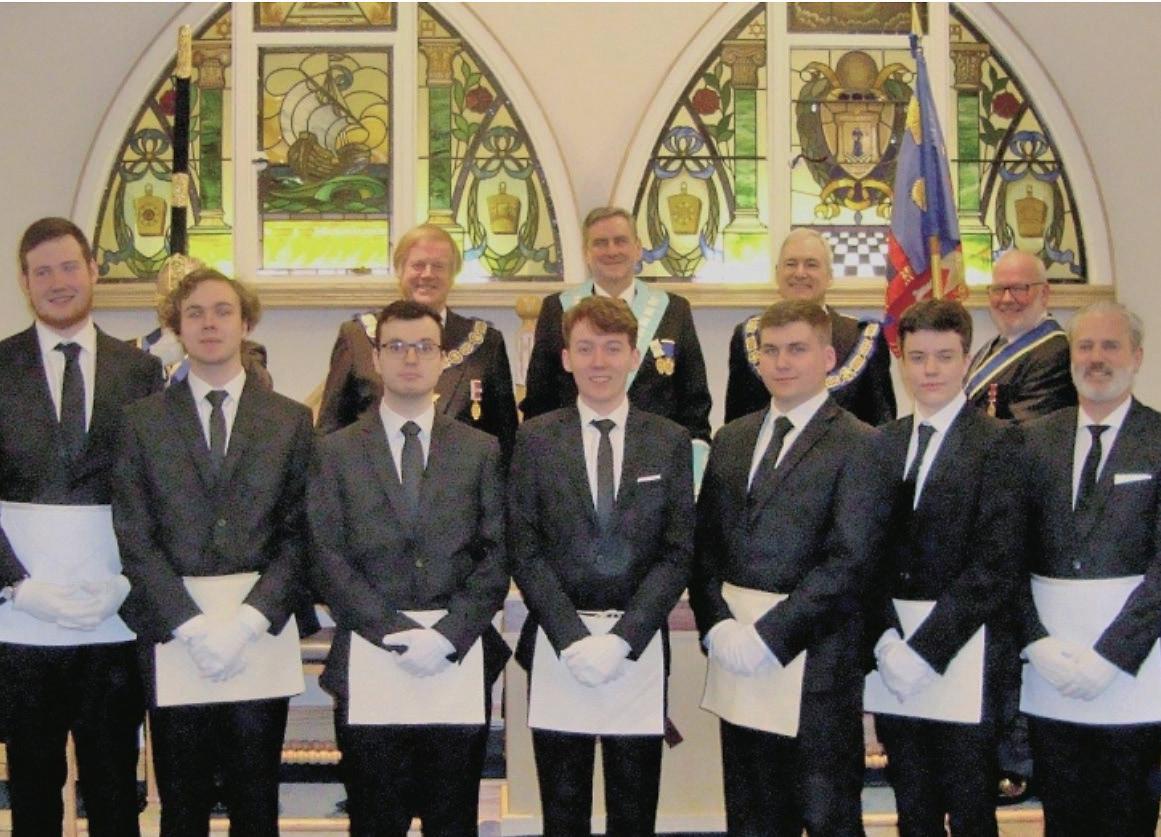
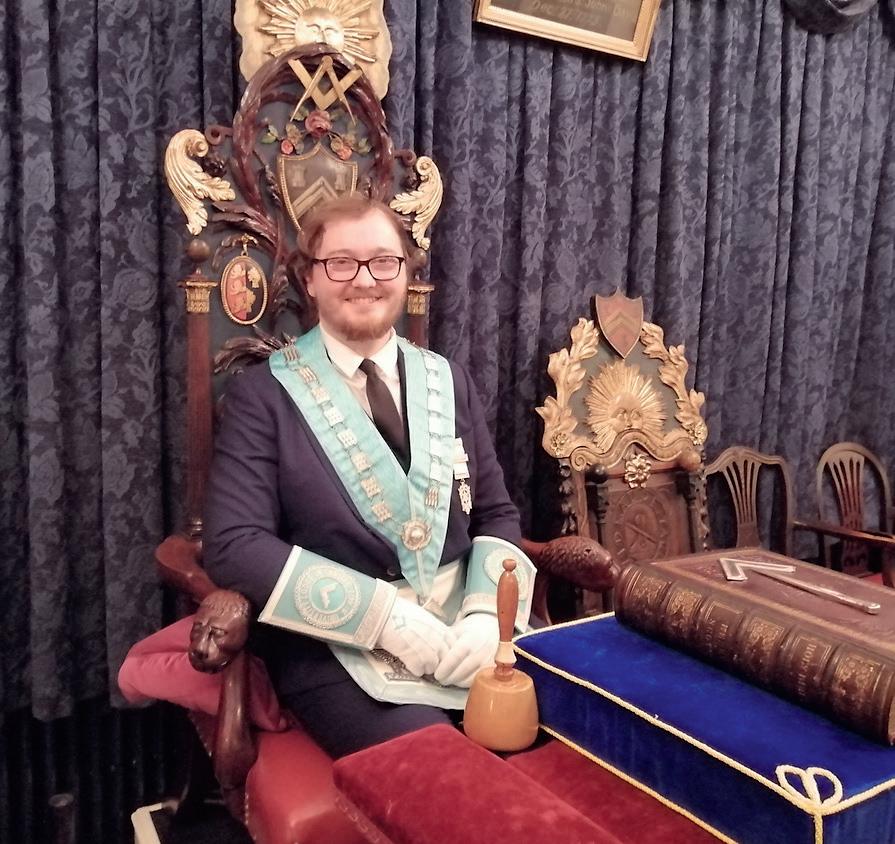
to their next Lodge, considering factors such as culture, age profile and reputation, reflects the Lodge’s commitment to preserving the spirit of Freemasonry beyond its own walls.
The Lodge’s emphasis on engagement is evident in its unique approach to Masonic education. By encouraging members to quickly participate in tools and ‘share’ larger pieces, such as tracing boards and charges, the University Lodge cultivates a competitive yet collaborative environment. The result is a quorum of members from day one, challenging the conventional notion of a magic moment for individual growth.
This commitment to mentorship becomes apparent as members progress through Deacon, Warden and Chair positions within a short span of four to five years. Lessons learned from losses at the Masters stage underscore the importance of one-to-one mentoring, ensuring that individuals can navigate their roles with confidence and justice to themselves.
Mark Costelloe, Deputy Chairman of the Members’ Pathway Working Party.
This, under the Engage section of the Members’ Pathway, is an excellent example of managing migration. In essence, the University Lodge of Chester may operate on a slightly unconventional model, but its dedication to nurturing Masonic values in young members and facilitating their seamless transition to the broader Masonic community is a testament to the Lodge’s commitment to growth and continuity.

In Worcestershire, the Masonic Centre witnessed a lasting transformation through the collaborative efforts of two small Lodges – Brandwood and St Oswald. Faced with the challenges of dwindling membership and a shared meeting space, the Lodges embarked on a journey that would ultimately define their future.
The turning point came with a simple yet innovative idea – a joint Festive Board. By consolidating their resources and merging their meetings on the same evening and in the same Temple, the Lodges discovered a formula that breathed new life into their Masonic endeavours.
At the Brandwood Lodge Installation meeting, St Oswald Lodge – with the assistance of Brandwood members – opened in the Number One Temple before joining Brandwood Lodge in the Number Two Temple. This collaboration allowed them to conduct their Installation ceremony, labours, and rituals effectively, fostering a sense of unity among the members.
The joint Festive Board that followed facilitated camaraderie and also created a vibrant atmosphere through friendly banter and interaction. This initiative proved to be a resounding success, evident in the increased attendance of 29 members at the Installation meeting – a number that would have been a challenge to achieve independently.
The benefits extended beyond the ceremonial aspects and, at the time, no one realised that this would lay the groundwork for a smooth transition in the future. Members from both Lodges knew each other, were accustomed to working together and had already established a strong bond, mitigating the challenges often associated with such transitions.
Tragically, with the untimely demise of St Oswald Lodge’s Secretary, a driving force behind the twinning initiative, an amalgamation became a reality. In the wake of this loss, St Oswald
Lodge decided to hand in its warrant. However, the impact of the collaboration endured.
• Four members of St Oswald integrated into Brandwood, further strengthening the Lodge.
• Brandwood’s membership increased from 17 to 24, attributed to the enhanced interest generated by the joint meetings.
• The twinning arrangement proved crucial, with members of St Oswald Lodge joining Brandwood thanks to the strong bonds established through the collaboration.
• A summer social event along the River Avon in Stratford-upon-Avon showcased the new-found camaraderie.
• Despite St Oswald’s Lodge surrendering its warrant, the Lodges continue their collaboration with a joint Ladies Night, exemplifying the enduring spirit of unity with 58 attendees
• Invigorated by the success of the twinning initiative, Brandwood embraces the Members’ Pathway and hopes to attract more members and candidates.
Mark Costelloe, Deputy Chairman of the Members’ Pathway Working Party. Here we have an excellent example under the Retrieve section of the Members’ Pathway – how to understand the real reasons for loss. It’s also a demonstration of the ‘Yes, if’ attitude, to do something positive about it. The story of Brandwood and St Oswald serves as testament to the transformative power of collaboration, unity and innovative thinking. Through their shared journey, these Lodges have set an inspiring example for others to follow.



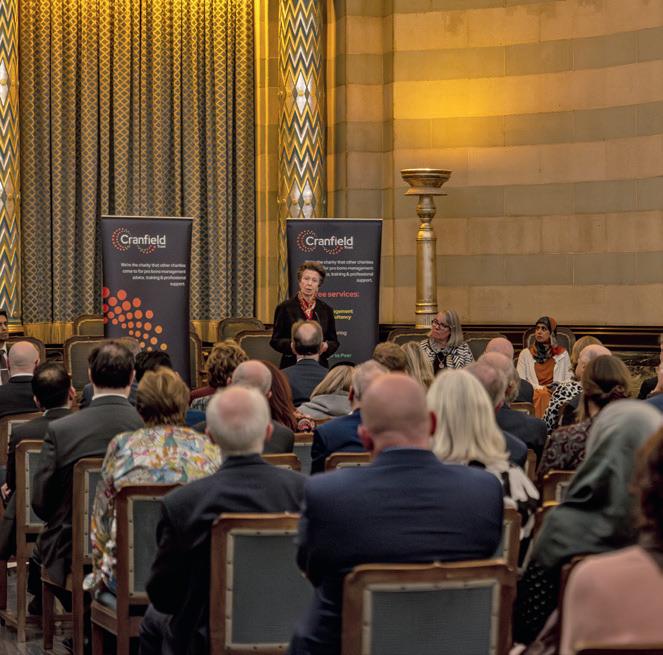
In December, the Masonic Charitable Foundation (MCF, the Freemasons’ charity) was delighted to welcome its strategic partner, Cranfield Trust, to Freemasons’ Hall as host of the panel discussion ‘Charity Management Matters’. The event was attended by more than 100 charity sector representatives and held in the presence of Cranfield Trust patron HRH The Princess Royal and the Pro Grand Master, Jonathan Spence. Her Royal Highness addressed the event by commending the valuable work carried out by individuals and organisations in the voluntary sector and noting the challenges they are facing. She emphasised the importance of skills development in tackling these challenges and spoke about the impact of technology and social media on charities. She also talked about the importance of small charities with local knowledge and contacts, and concluded her address by urging charities in the room to make use of resources provided by organisations such as Cranfield Trust. The panel discussion featured three speakers: management education
specialist Professor Stephanie Hussels; artificial intelligence specialist Dr Naveen Thomas; and Salma Ravat, founder and CEO of homelessness charity One Roof Leicester. The panel discussed a range of management challenges in the charitable sector and the evolving landscape. Highlights of the discussion included:
• Developing a mindset for growth, improving skills and recognising the value of cross-sector learning.
• How charities can use artificial intelligence to support and enhance their work.
• The importance of training and development for charities, to keep skills current in a changing world.
Amanda Tincknell CBE, Cranfield Trust CEO, spoke about Charity Management Matters, the organisation’s research report funded by the MCF. It called on training providers, funders and small charities in the room to collaborate, support and invest time in training and development despite operating pressures.
MCF began a two-year strategic partnership with Cranfield Trust in 2022,
committing more than £228,000 to help 60 charities to receive either management support and guidance tailored to the charity’s needs, or mentoring support for the charity’s Chief Executive.
Les Hutchinson, MCF Chief Executive said, ‘We are delighted to be working with Cranfield Trust to fund transformational management support for local charities. Although MCF is primarily a grant-making charity, this event demonstrates the value of offering professional support that can have a transformational impact for charities looking to grow or adapt to new challenges.’
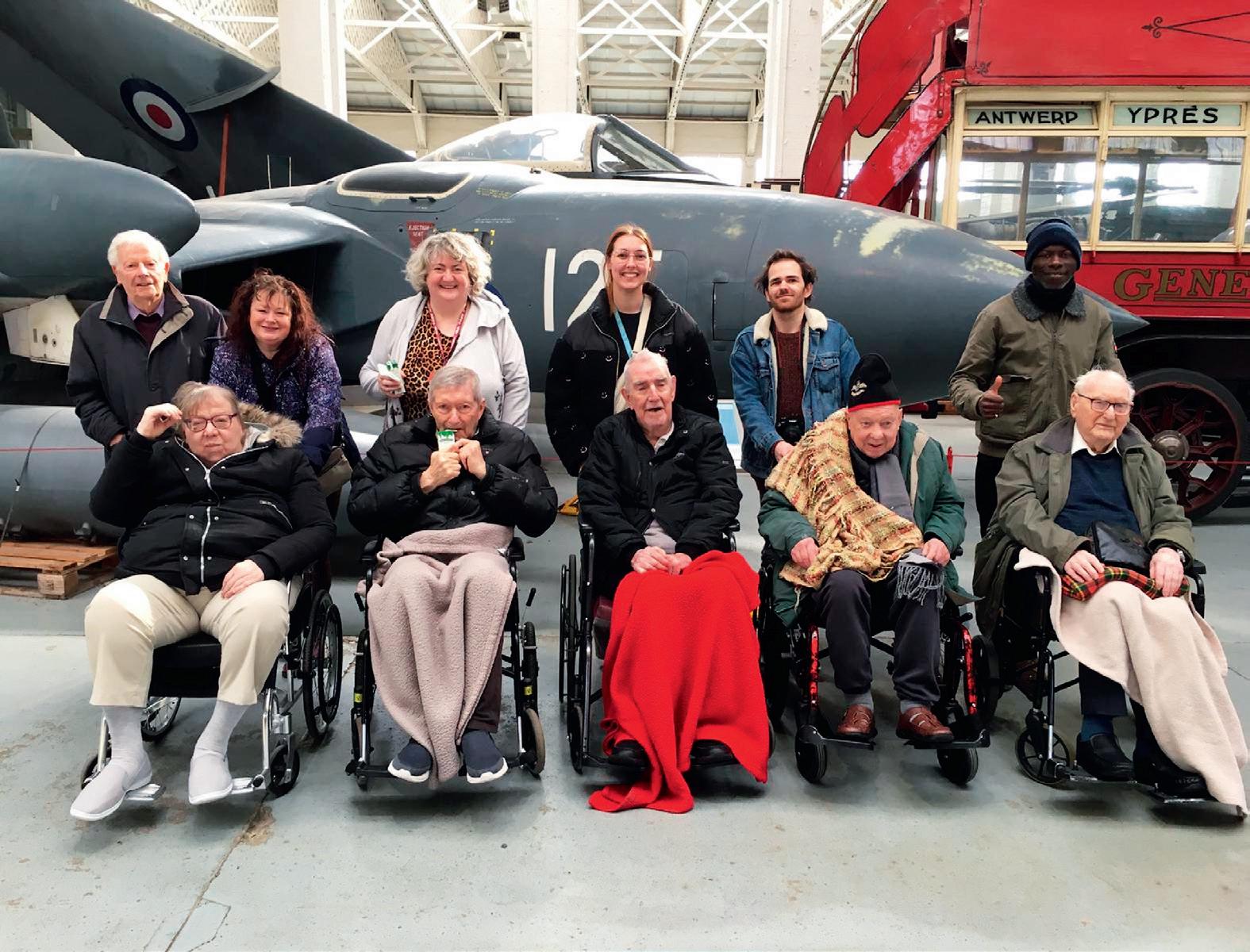
Residents at Prince Edward Duke of Kent Court care home in Braintree, Essex, have enjoyed a visit to the Imperial War Museum Duxford in Cambridgeshire. The care home, owned by the RMBI Care Co., supports older Freemasons, their families and people in the wider community.
Keen to support their residents’ interests, encourage reminiscences and help them to get out and about, Activities Coordinator Sophie George and five staff members accompanied several residents in the home’s minibus for the 40-mile journey to the museum.
During the trip, residents visited three hangars that featured a variety of aircraft. Mechanics working on the planes were happy to answer technical questions from the visitors.
Ron Thompson, 103, a Freemason for more than 75 years before retiring, served in the RAF as a fitter during World War II. Ron’s duties involved maintaining aircraft and personal safety equipment, earning him several medals. Ron was most intrigued by the Battle of Britain hangar housing British planes used during the war. This sparked conversations and
memories among fellow resident Freemasons Roy Cleaver, 92, who also served in the RAF, and Bill Cullinan, 86, who said, ‘It has been a smashing trip. I’m surprised I have never been here before because it is wonderful – so big and looks grand.’
Sophie said, ‘Our residents and staff had a fascinating time visiting the Imperial War Museum Duxford. Some of our residents have a real interest in planes and wartime events, and it was special to hear their knowledge and experiences. Trips like these really support our residents’ health and wellbeing, helping them to form new memories as well as recall old ones.’
Prince Edward Duke of Kent Court is run by RMBI Care Co., part of the Masonic Charitable Foundation (MCF, the Freemasons’ charity). For more information, visit www.rmbi.org.uk
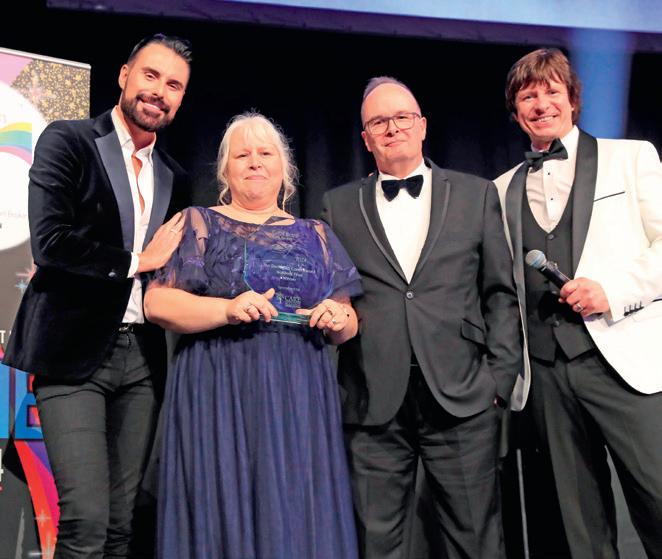
Juliet McNeilly, Care Home Manager at RMBI Care Co. care home Devonshire Court in Leicester, has won the Dementia Carer Award at the National Great British Care Award Finals in Birmingham. The event paid tribute to individuals who have demonstrated excellence within their field in the care sector. All finalists went through after winning their categories in the regional finals.
Juliet said, ‘I’m thrilled to receive the Dementia Carer Award on behalf of my whole team. I feel privileged to come to work each day to support our residents to live well, fulfil their dreams and make new memories, and work alongside passionate, kind and caring team members.
‘The care sector is continually evolving, and we strive not just to meet our residents’ needs, but to exceed their expectations by enriching their lives through various activities and events. This could be an activity in our Kindness Suite, more access to safe outdoor spaces to enjoy nature, or feelgood dance sessions to help people have fun and keep moving.’
The judges said, ‘Nothing surpasses Juliet’s commitment to ensuring every resident experiences their best day, every day. With profound empathy, she immerses herself in their dementia journey, offering unwavering support to guide them to safety.’
Steve Stace, Business Manager at RMBI Care Co. Home Shannon Court in Surrey, won the Registered Care Home Manager Award in the south-east regional finals. RMBI Care Co. received seven nominations in 2024’s Great British Care Awards, one for each entry they submitted.

West Kent Freemasons award £63,500 grant to family advice service We Are Beams
Hundreds of families with disabled children will receive advice and support from an expert team at We Are Beams, thanks to a £63,500 grant from West Kent Freemasons, funded by the Masonic Charitable Foundation (MCF, the Freemasons’ charity).
The family advice service at We Are Beams offers help on financial matters, education, health, transport and mobility issues, while also providing much-needed emotional support. It provides the right advice to allow parents to make the best choices for their disabled children. In a survey, 96 per cent of parents said their family advisors had a positive effect on their mental health and wellbeing.
The grant will also fund family advice clinics, where families of children up to 19 years of age with multiple learning difficulties are often referred by healthcare practitioners. The family advice team has seen an influx of families moving into the Dartford area, for example, many having a high level of need. Parents are struggling to contact case officers, emails are not
being responded to and it is difficult to speak to anyone on the phone. The parents reach out to We Are Beams when they are feeling desperate and stressed. This grant will help alleviate some of that stress.
The family advice team is often the first point of call to We Are Beams. The family can then be referred to other services.
Children and young people often benefit from short-break holiday play schemes and family outings, for example, and it is good for families to mix with others in a similar situation so that they can build friendships and offer each other support.
Katrina Adams, head of We Are Beams, said, ‘We’re very grateful to West Kent Freemasons for their generous grant. This donation will have a huge impact on our children and families, especially as our work has become much more complex since the pandemic and there is a higher level of need. We’re still experiencing children not in education and are dealing with several cases of mental health issues. The donation will help us to offer our support to young people to aid them
back on the right track in life so that they are not excluded from society.’
Mark Estaugh, Provincial Grand Master at West Kent Freemasons, added, ‘I’m pleased we’ve been able to help We Are Beams with this valuable project helping local families with disabled children. This is a wonderful charity that does a great job using their experience and expertise to help families navigate through official bureaucracy and obtain the support they need.’
To learn more about the MCF’s grants to charities, scan the QR code or visit www mcf.org.uk/ grants-to-charities/FMT
Freemasons and their families can be supported through difficult times by the MCF

As a charity funded entirely by the generosity of Freemasons and their families, the Masonic Charitable Foundation (MCF, the Freemasons’ charity), is able to support the Freemasonry community through its Masonic Support programme.
The Freemasonry community is made up of Freemasons, their children and grandchildren, as well as their widows or partners. Individuals falling under these categories may be eligible for the MCF’s grants and services, such as access to mental health support.
The MCF works with an external provider to offer mental health support to members of the Freemasonry community – both adults and, more recently, children aged five to 16. Support is available for those experiencing symptoms of depression, anxiety, stress or any other conditions affecting mental wellbeing.
Professional support is provided by an independent team of counsellors and therapists registered and accredited by the UK Council for Psychotherapy.
Since the service for children and young people was made available, the MCF has received a great deal of positive feedback. One person expressed their gratitude for how the support helped them get through a difficult period.
A student and grandchild of a Freemason said, ‘Last year’s exam season was incredibly tough for me. With my university and career riding on those results, the pressure felt overwhelming. I was also dealing with family issues at home, which only added to the stress. The support I received was a lifeline –the counsellor really took the time to listen to my fears and anxieties and gave me coping tools that I will always be thankful for.’
In the last financial year, the MCF awarded more than £21,000 to support 28 children and young people with their mental health. This is only possible thanks to the generosity of Freemasons and their families, who are helping the MCF in its mission to build better lives.
For information and to reach out for support, visit www.mcf.org. uk/get-support/mental-health/ FMT or scan the QR code.
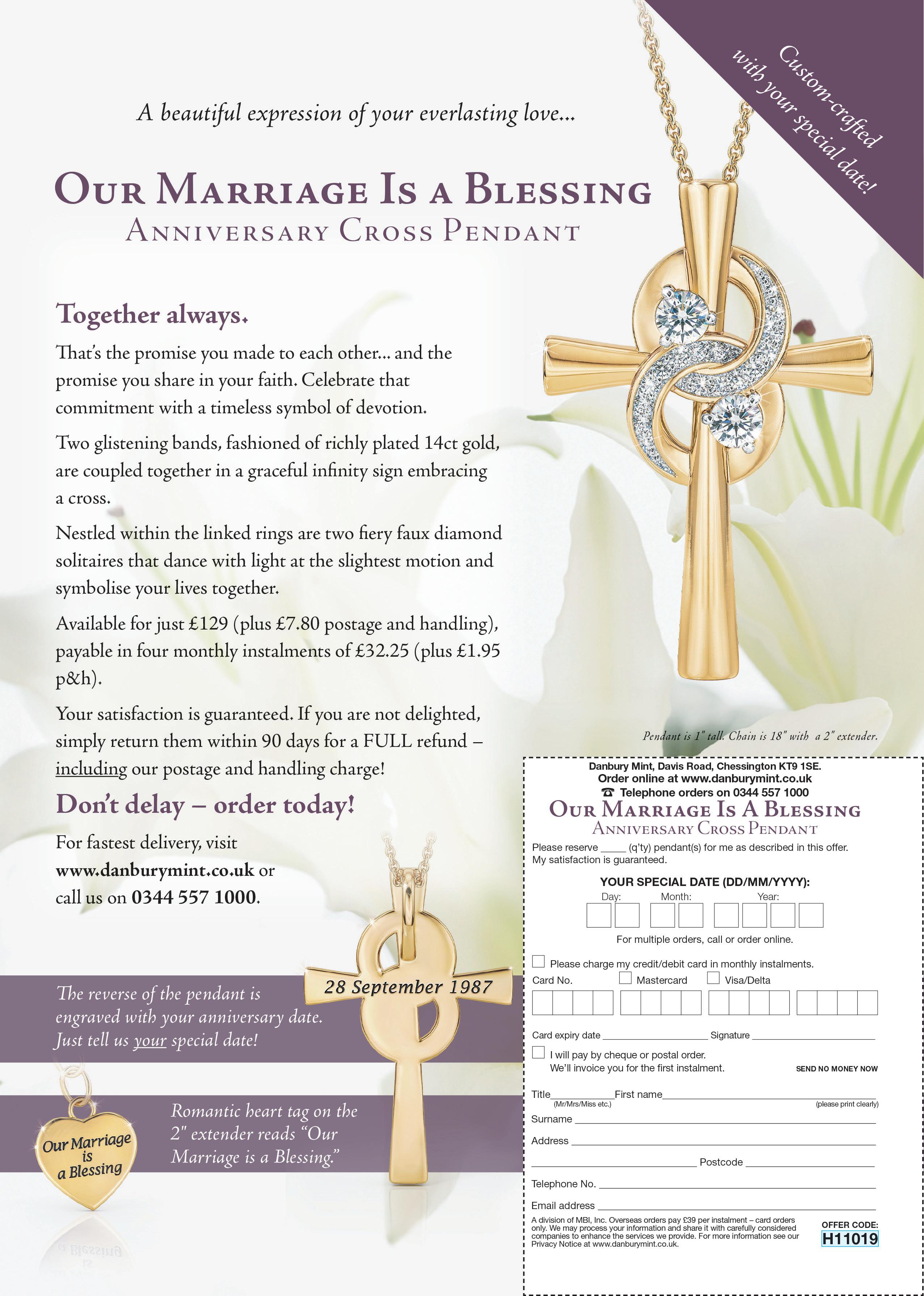

Northumberland 117 Lodges 42 Chapters
Cumberland & Westmorland 62 Lodges 28 Chapters
Isle of Man 19 Lodges 6 Chapters
East Lancashire 170 Lodges 71 Chapters
West Lancashire 300 Lodges 115 Chapters
North Wales 99 Lodges 32 Chapters
Cheshire 156 Lodges 74 Chapters
Shropshire 37 Lodges 13 Chapters
Worcestershire 91 Lodges 33 Chapters
West Wales 27 Lodges 12 Chapters
Monmouthshire 29 Lodges 14 Chapters
Somerset 84 Lodges 29 Chapters
Gloucestershire 83 Lodges 30 Chapters
Cornwall 76 Lodges 30 Chapters
Durham 151 Lodges 54 Chapters
Yorkshire, West Riding 171 Lodges 69 Chapters
Staffordshire 91 Lodges 37 Chapters
Bristol 37 Lodges 14 Chapters
South Wales 161 Lodges 69 Chapters
Devonshire 124 Lodges 53 Chapters
Guernsey & Alderney 11 Lodges 6 Chapters
Herefordshire 15 Lodges 30 Chapters
Buckinghamshire 117 Lodges 40 Chapters
Berkshire 99 Lodges 38 Chapters
Middlesex 164 Lodges 69 Chapters
London 1,149 Lodges 498 Chapters
Hertfordshire 161 Lodges 68 Chapters
Surrey 226 Lodges 100 Chapters
West Kent 165 Lodges 65 Chapters
Derbyshire 76 Lodges 30 Chapters
Oxfordshire 52 Lodges 19 Chapters
Dorset 49 Lodges 22 Chapters
Yorkshire, North & East Ridings 95 Lodges 54 Chapters
Lincolnshire 76 Lodges 33 Chapters
Warwickshire 131 Lodges 44 Chapters
Leicestershire & Rutland 80 Lodges 27 Chapters
Suffolk 69 Lodges 32 Chapters
Bedfordshire 57 Lodges 20 Chapters
Nottinghamshire 78 Lodges 33 Chapters
Norfolk 75 Lodges 25 Chapters
Cambridgeshire 33 Lodges 14 Chapters
Northamptonshire & Huntingdonshire 97 Lodges 28 Chapters
East Kent 173 Lodges 64 Chapters
Sussex 152 Lodges 70 Chapters
Hampshire & Isle of Wight 248 Lodges 83 Chapters
Wiltshire 44 Lodges 17 Chapters
Jersey 11 Lodges 7 Chapters
Essex 289 Lodges 115 Chapters
1. CANADA
Montreal/Halifax
The Group of Lodges in Montreal & Halifax (3 Lodges)
2. CARIBBEAN
Kingston/George Town
District Grand Lodge of Jamaica & the Cayman Islands (26 Lodges)
Willemstad
Igualdad Lodge no. 653
Port of Spain
District Grand Lodge of Trinidad & Tobago (8 Lodges)
St John’s, Antigua
District Grand Lodge of Barbados & The Eastern Caribbean (22 Lodges)
Georgetown
District Grand Lodge of Guyana (15 Lodges)
3. ATLANTIC
Nassau
District Grand Lodge of Bahamas & Turks (13 Lodges)
Hamilton
District Grand Lodge of Bermuda (5 Lodges)
Jamestown
St Helena Lodge, No. 488
4. SOUTH AMERICA
São Paulo/ Rio de Janeiro
District Grand Lodge of South America, Northern Division (24 Lodges)
Buenos Aires/ Santiago/Montevideo
District Grand Lodge of South America, Southern Division (14 Lodges)
5. EUROPE
Portugal
The Group of Lodges in Portugal (4 Lodges)
Gibraltar
District Grand Lodge of Gibraltar (9 Lodges)
Valleta
The Group of Lodges in Malta (2 Lodges)
Limassol
District Grand Lodge of Cyprus (19 Lodges)
Zakynthos Star of the East Lodge no. 880
6. WEST AFRICA
Freetown/Banjul
District Grand Lodge of Sierra Leone & The Gambia (21 Lodges)
Accra
District Grand Lodge of Ghana (59 Lodges)
Lagos
District Grand Lodge of Nigeria (42 Lodges)
7. EAST AFRICA
Nairobi
District Grand Lodge of East Africa (48 Lodges)
8. SOUTHERN AFRICA
Johannesburg
District Grand Lodge of South Africa, North (80 Lodges)
Kimberley
District Grand Lodge of South Africa, Central Division (8 Lodges)
Windhoek
District Grand Lodge of Namibia (4 Lodges)
Cape Town
District Grand Lodge of South Africa, Western Division (16 Lodges)
Ndola
District Grand Lodge of Zambia (11 Lodges)
Harare/Lilongwe
District Grand Lodge of Zimbabwe & Malawi (12 Lodges)
Durban
District Grand Lodge of Kwazulu-Natal (22 Lodges)
Bloemfontein
District Grand Lodge of Orange Free State (7 Lodges)
Port Elizabeth
District Grand Lodge of South Africa, Eastern Division (19 Lodges)
9. THE SUBCONTINENT
Mumbai
District Grand Lodge of Bombay (23 Lodges)
New Delhi
District Grand Lodge of Northern India (5 Lodges)
Kolkata
District Grand Lodge of Bengal (23 Lodges)
Chennai
District Grand Lodge of Madras (18 Lodges)
Colombo
District Grand Lodge of Sri Lanka (10 Lodges)
11. AUSTRALIA
Albany Plantagenet Lodge no. 1454
Melbourne Combermere Lodge no. 752
Tully Geraldton Lodge no. 3544
Gladstone Port Curtis Lodge no. 2235
10. THE FAR EAST
Kuala Lumpur/
Singapore/Thailand
District Grand Lodge of Eastern Archipelago (40 Lodges)
Hong Kong/Kobe
District Grand Lodge of Hong Kong & The Far East (20 Lodges)
Vanuatu/Fiji
The Group of Lodges in the South West Pacific (3 Lodges)
Rabaul
Rabaul Lodge no. 4468
12. NEW ZEALAND
Christchurch
District Grand Lodge of South Island, New Zealand (13 Lodges)
Auckland
District Grand
Lodge of North Island, New Zealand (24 Lodges)
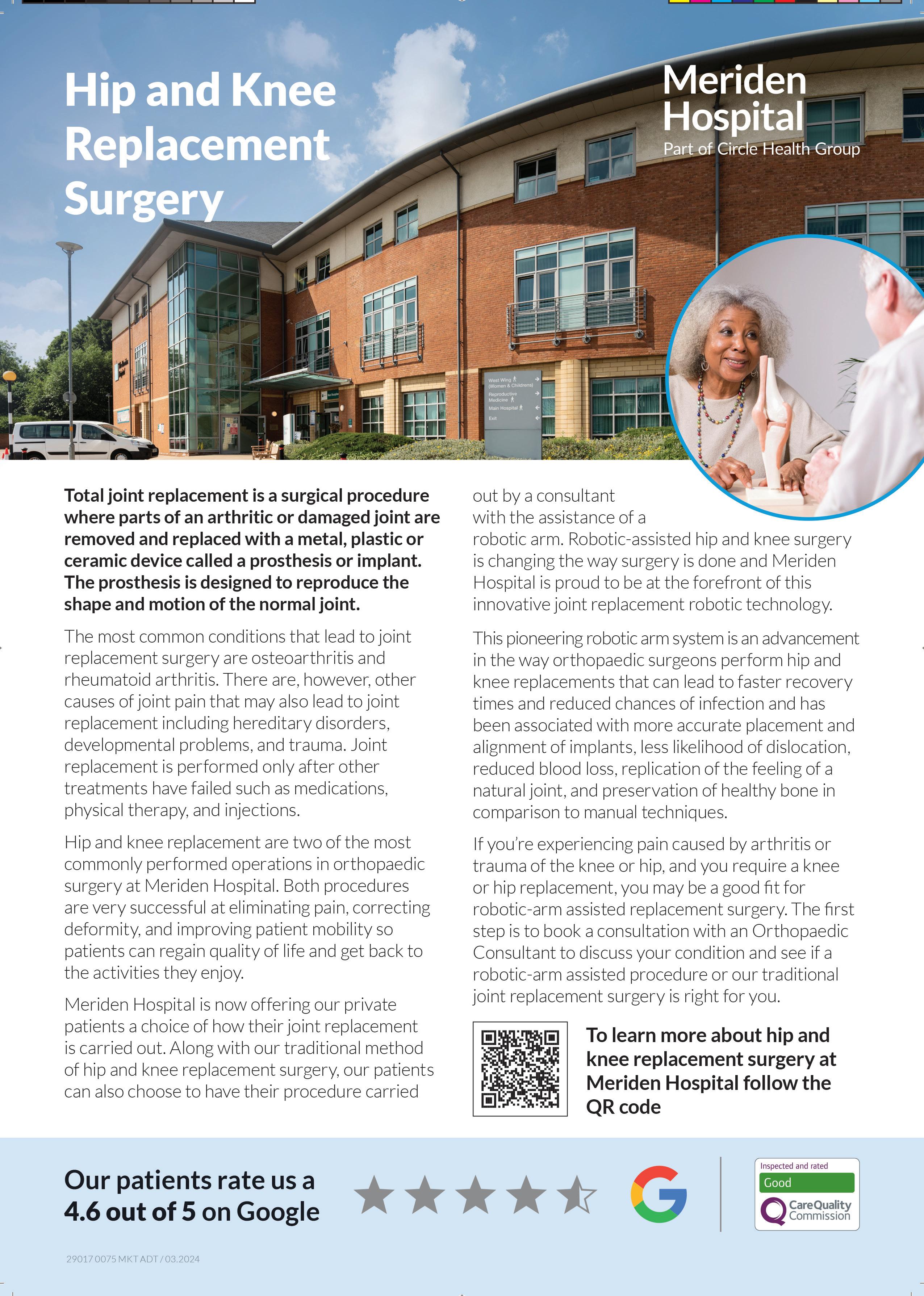
@freemasonry2day
@ugle_grandlodge
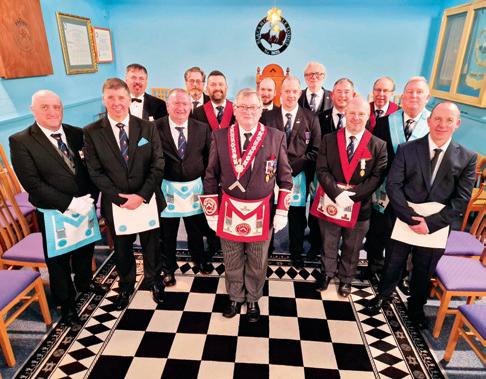
22 February
@Dorset9508
The Three Pillars Club – the club in Dorset for all new and junior Freemasons – attended the regular meeting of The Kenneth Cross Lodge of Dorset Provincial Grand Stewards –and gave a demonstration on the 1st Degree Tracing Board, something that is not normally seen.
3 March
@dglsand
Introducing Vale Europeu Lodge no. 10042. Last Saturday, Blumenau welcomed its fi rst
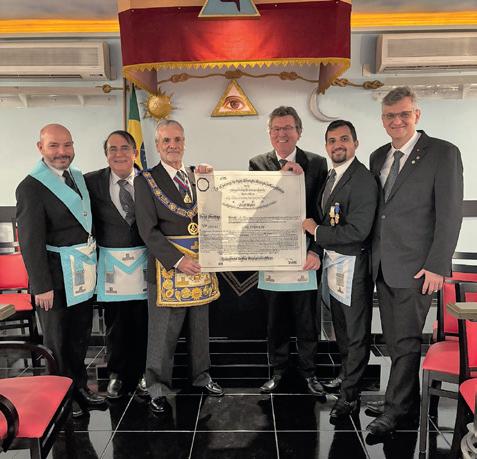
English Lodge, adding a new chapter to its rich history. Under DistGM, R.W.Bro J.C. Woodrow, guidance, W.Bro C.J Hinckel was installed as the fi rst Master. Here’s to success!
9 March
@MichaelWilks2
Widows Sons supporting Ginge on his installation as Master of
FreemasonryToday
UnitedGrandLodgeofEngland
Brockenhurst Lodge.
A great night – Lodge room fi lled to capacity as Ginge Kinley was installed in an excellent ceremony led by Installing Master Paul Milton. An evening full of fun and great humour.
15 March
@DevonMasons
Bro Lee Fallows visits Vranch House’s sensory garden for the Ribbon cutting.
26 March
@GibFreemasonry
As part of their annual Easter Egg run, Widows Sons

Gibraltar donated Easter eggs to St Martin’s Special School, St Bernadette’s Occupational Therapy Centre and Rainbow Ward, St Bernard’s Hospital yesterday.
@CheshirePGL
Cheshire’s Royal Arch Demonstration Team were invited to United Grand Lodge in London to perform a special meeting on behalf of The Duke of Cornwall Chapter 1839; home of the Formula One Companions. In addition to the team in attendance were senior Cheshire Royal Arch Freemasons David Williams, Nick Simpson, Chris Jones, Geoff Perkin and Simon Hay. The meeting was conducted in true Demonstration
@unitedgrandlodgeofengland
@freemasonrytoday
@freemasonsha ll
Team manner with clear explanation, good humour, diligence and sincerity. The day was thoroughly enjoyed by all and received high praise from senior Royal Arch Freemason John Burnapp. The team travelled down with their partners and enjoyed a fi ne meal at a nearby Italian restaurant.
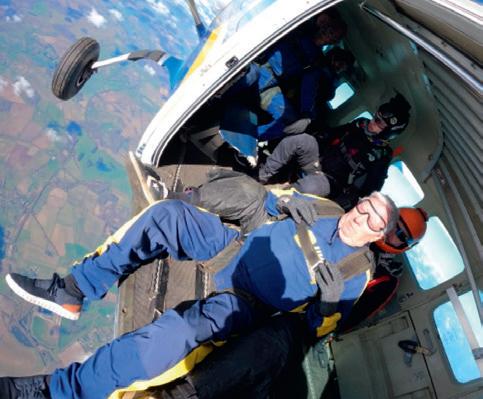
30 March
@lincsmasonic
Parachuting pensioner Peter has added more than £1,600 to Lincolnshire #Freemasons’ five-year charity appeal to raise at least £2.25m for @Masonic_Charity by celebrating his 75th birthday with a leap from an aircraft.
Your posts from 1 April
‘One Journey’ Apron – for use by Master Masons who are also Exaltees. It can be worn in both Craft Lodges and Royal Arch Chapters and clearly portrays the indissoluble link between the two.
@MiddlesexMason
Breaking news from Middlesex Freemasonry: introducing our latest Lodge upgrade – heated seats! To ensure maximum comfort during those lengthy ceremonies, Lodge chairs will now come equipped with built-in seat warmers.
@ShropshireMason
The new logo has just been approved for use on all Summonses, where a Festive Board is mentioned.

@WYFreemasons

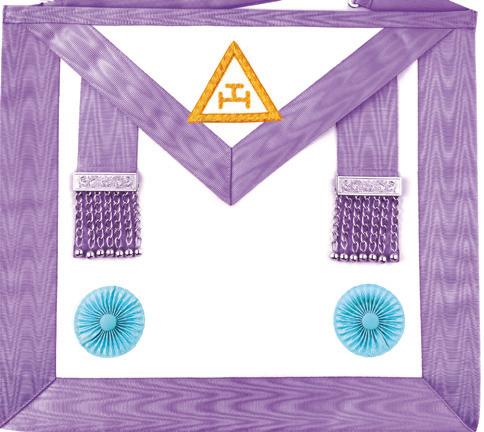
@LondonMasons
Metropolitan Grand Lodge and Metropolitan Grand Chapter are pleased to announce the
In an unprecedented global event, we have successfully conducted the fi rst ever Lodge meeting on the lunar surface. The ground-breaking journey, which set off from their launch site in Barnsley, concluded with splashdown in Malham Tarn in the early hours of Monday, 1 April.
#Freemasons
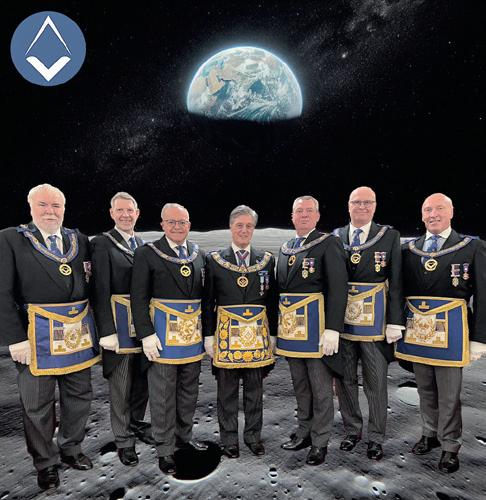
FMT’s pick of the unusual, striking or just plain fascinating




In the days when gentlemen withdrew after dinner to smoke cigars, they wore smoking jackets and caps to protect their clothes and hair. We have a remarkable hand-embroidered example of such headwear in the museum collection that shows its owner was in the Craft, Royal Arch, Mark and Knights Templar. In the 1930s, the donor believed it was already more than 80 years old, which fits with the distinct Arts and Crafts period look of the cap.

